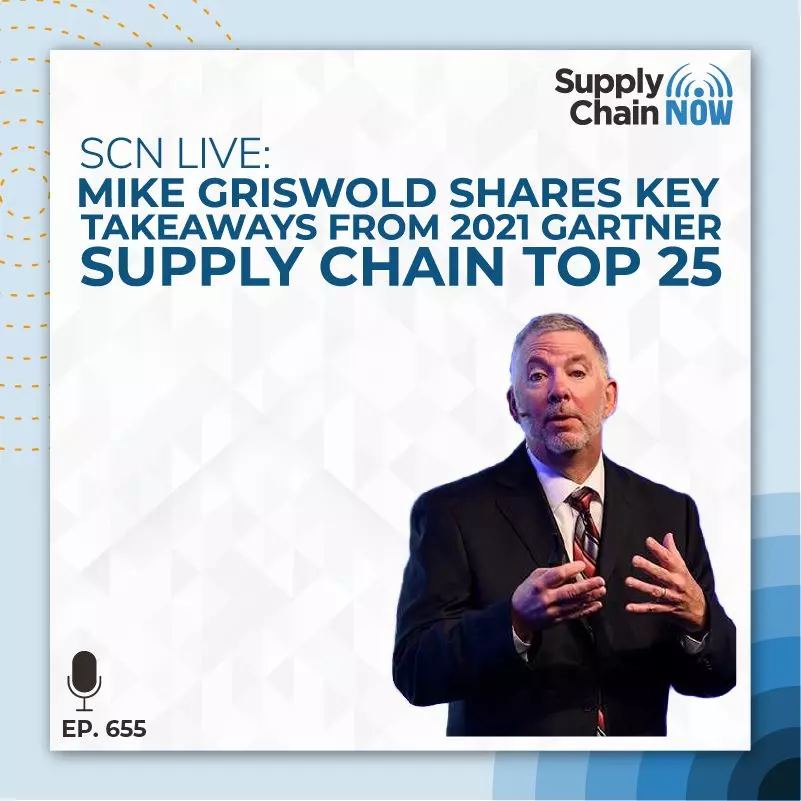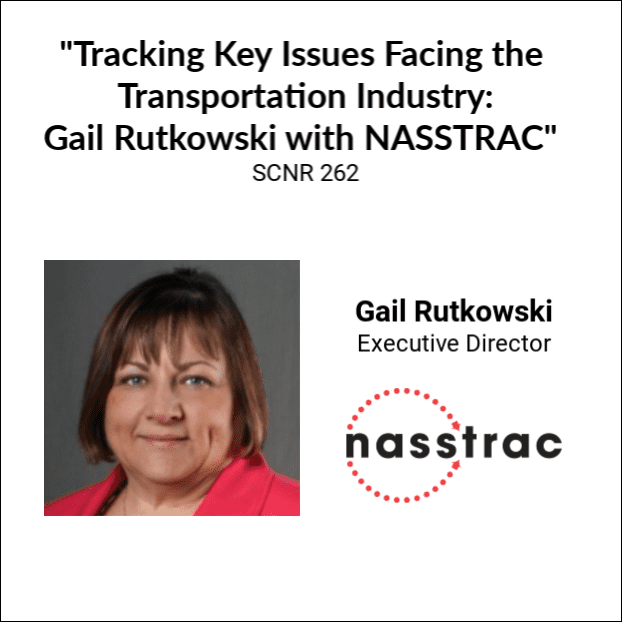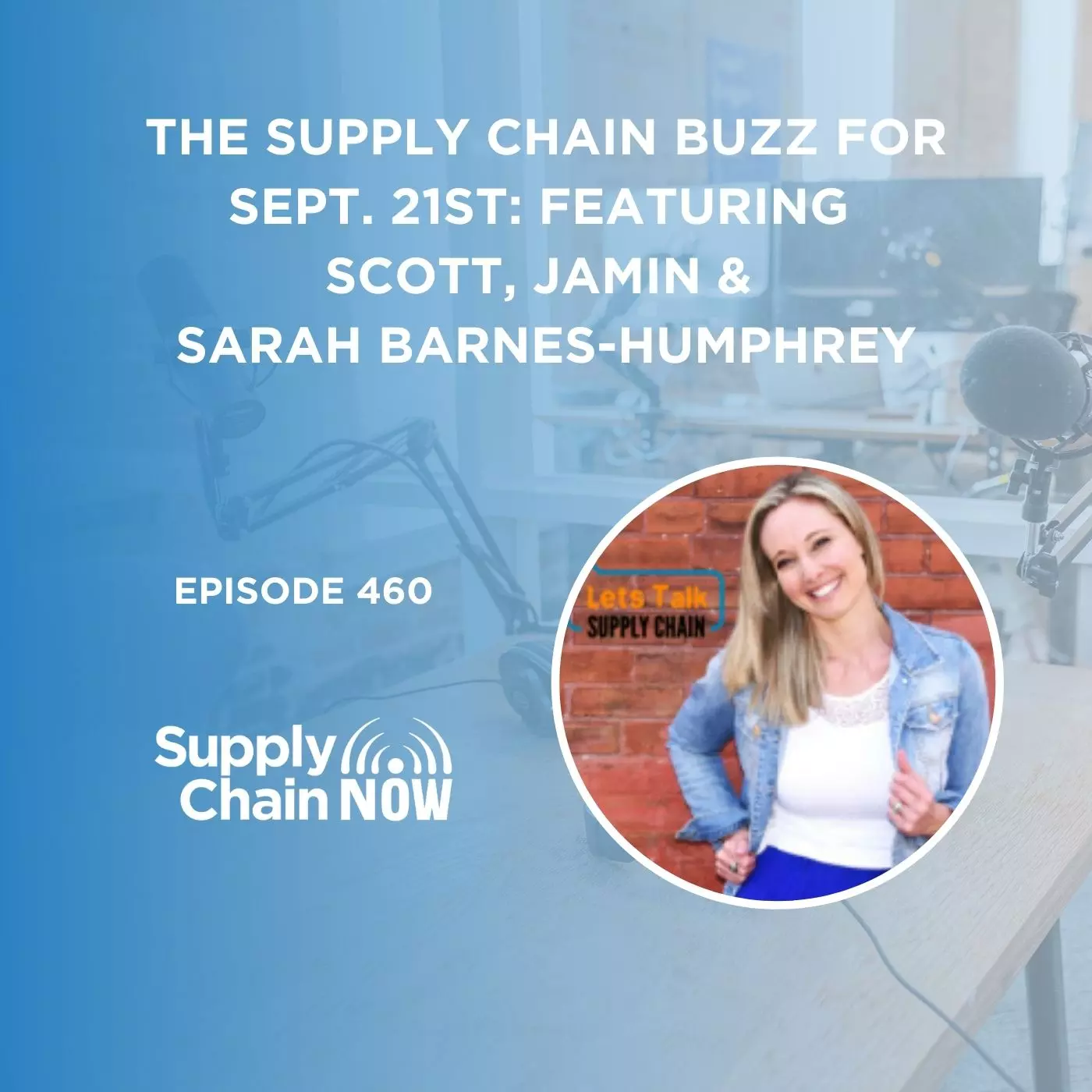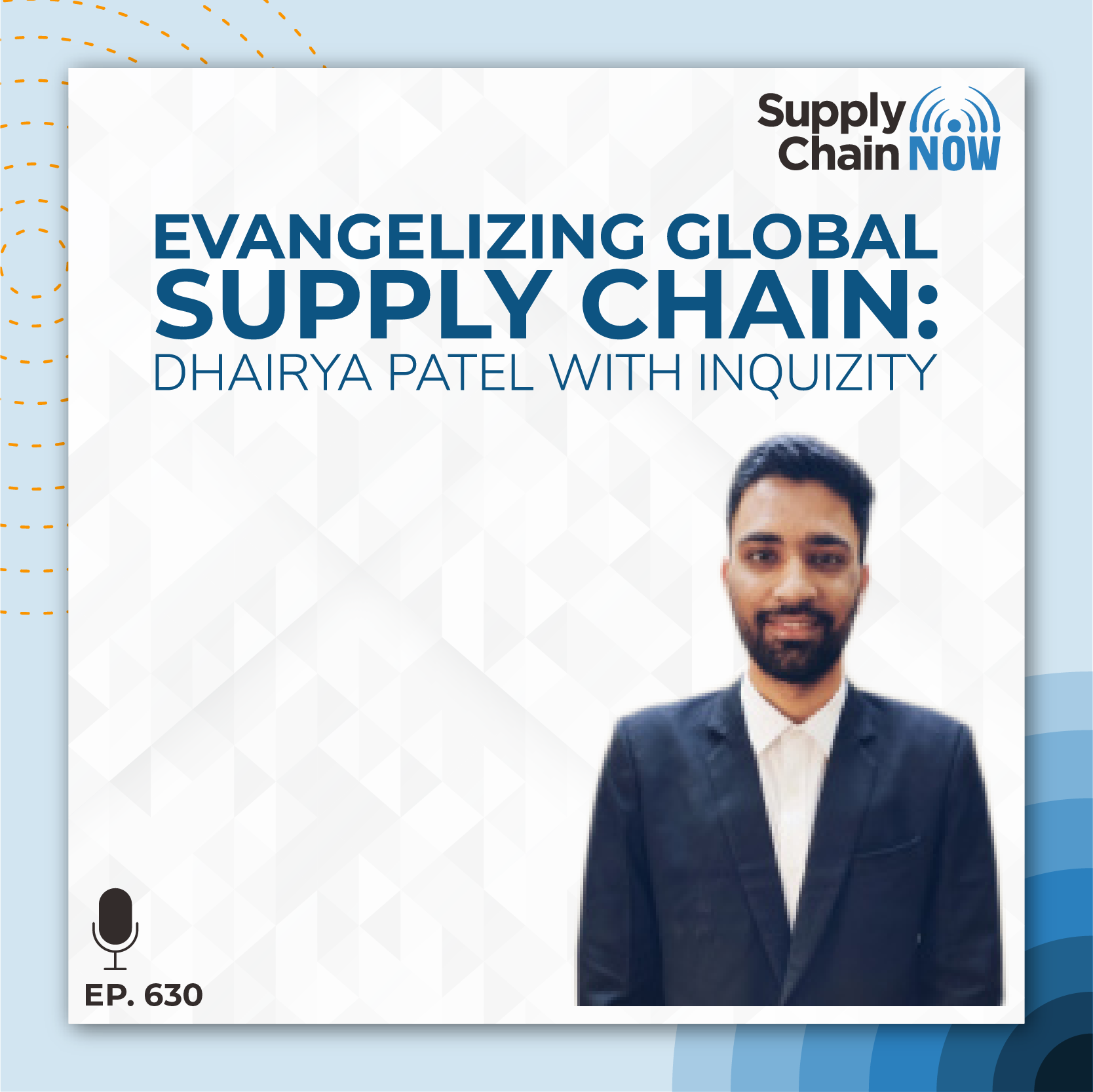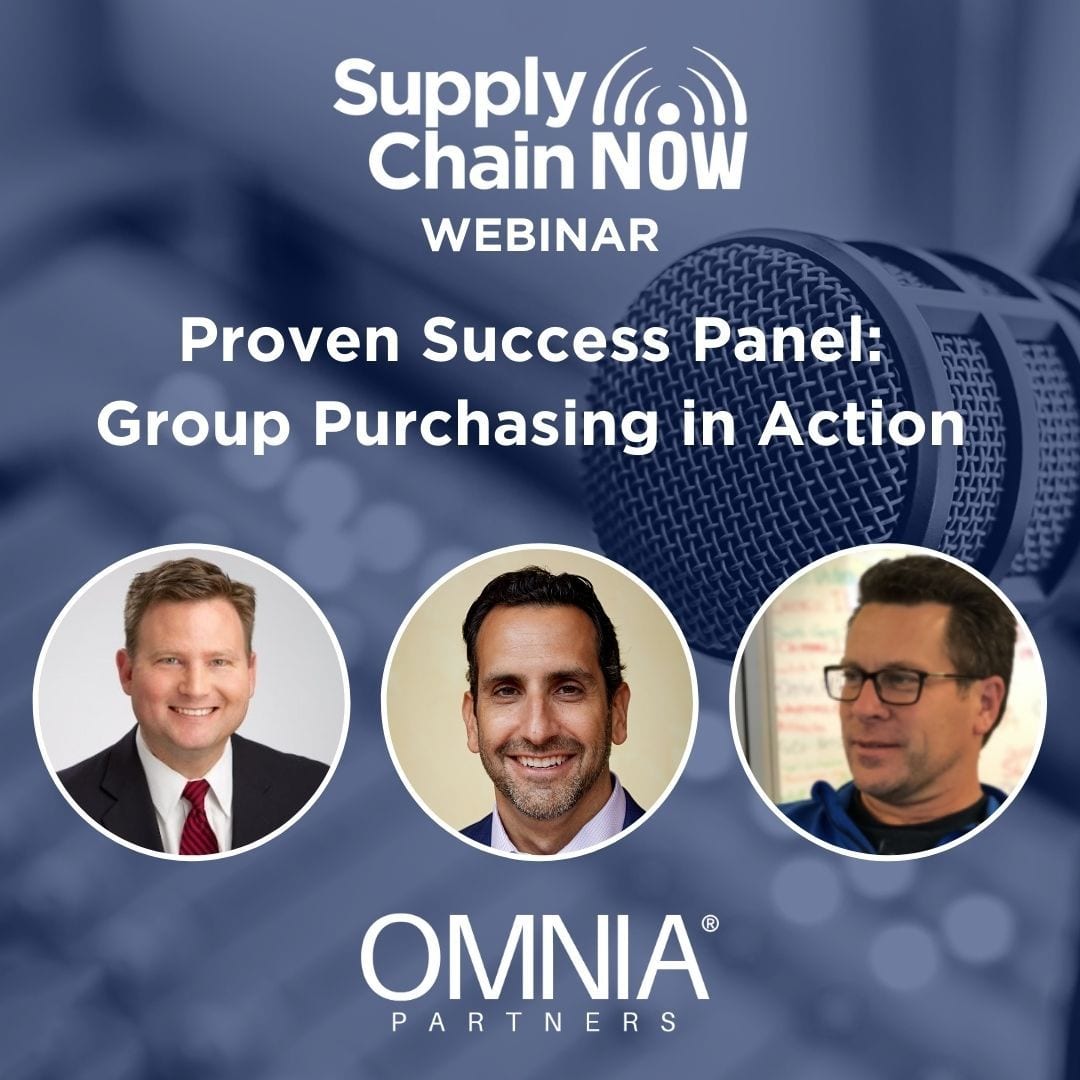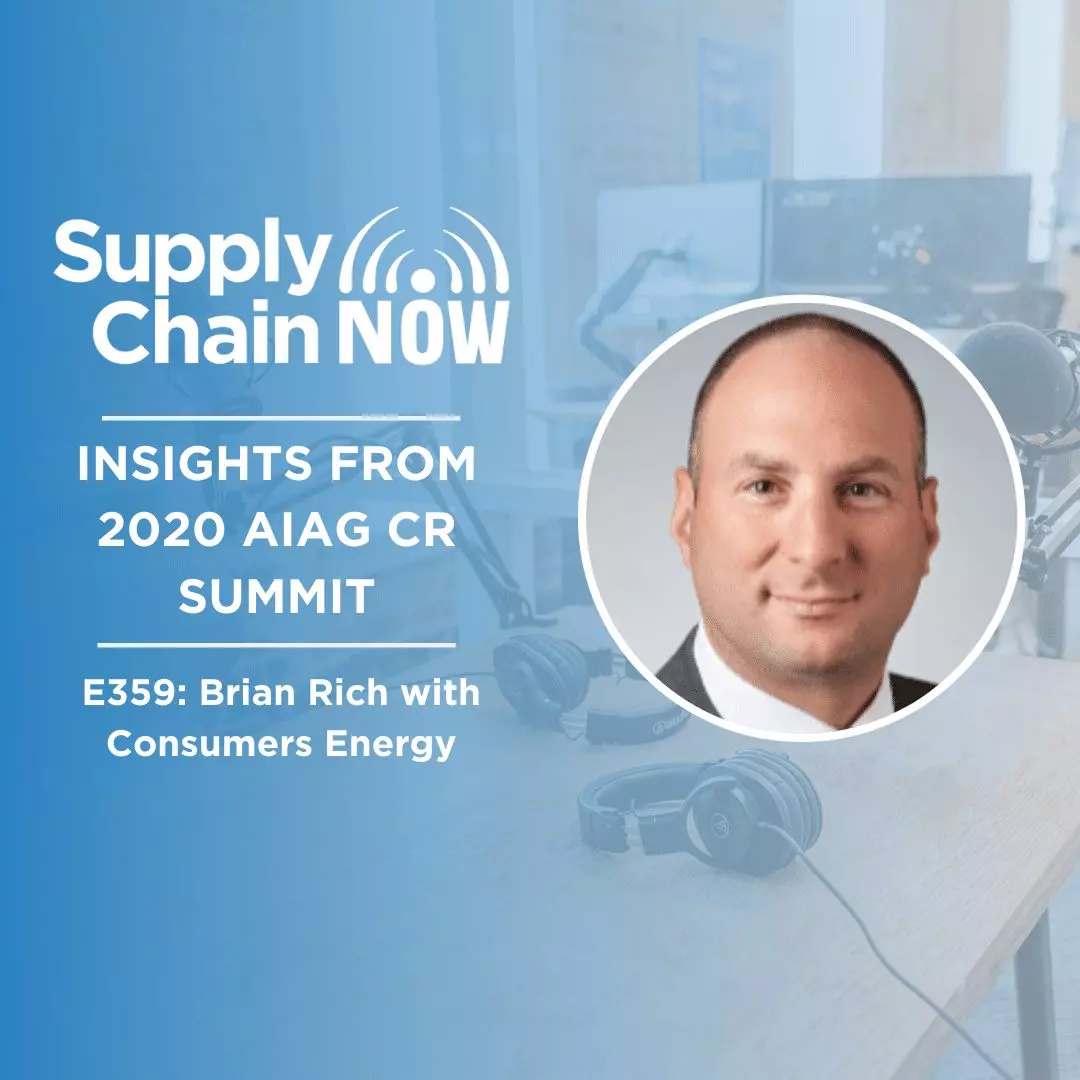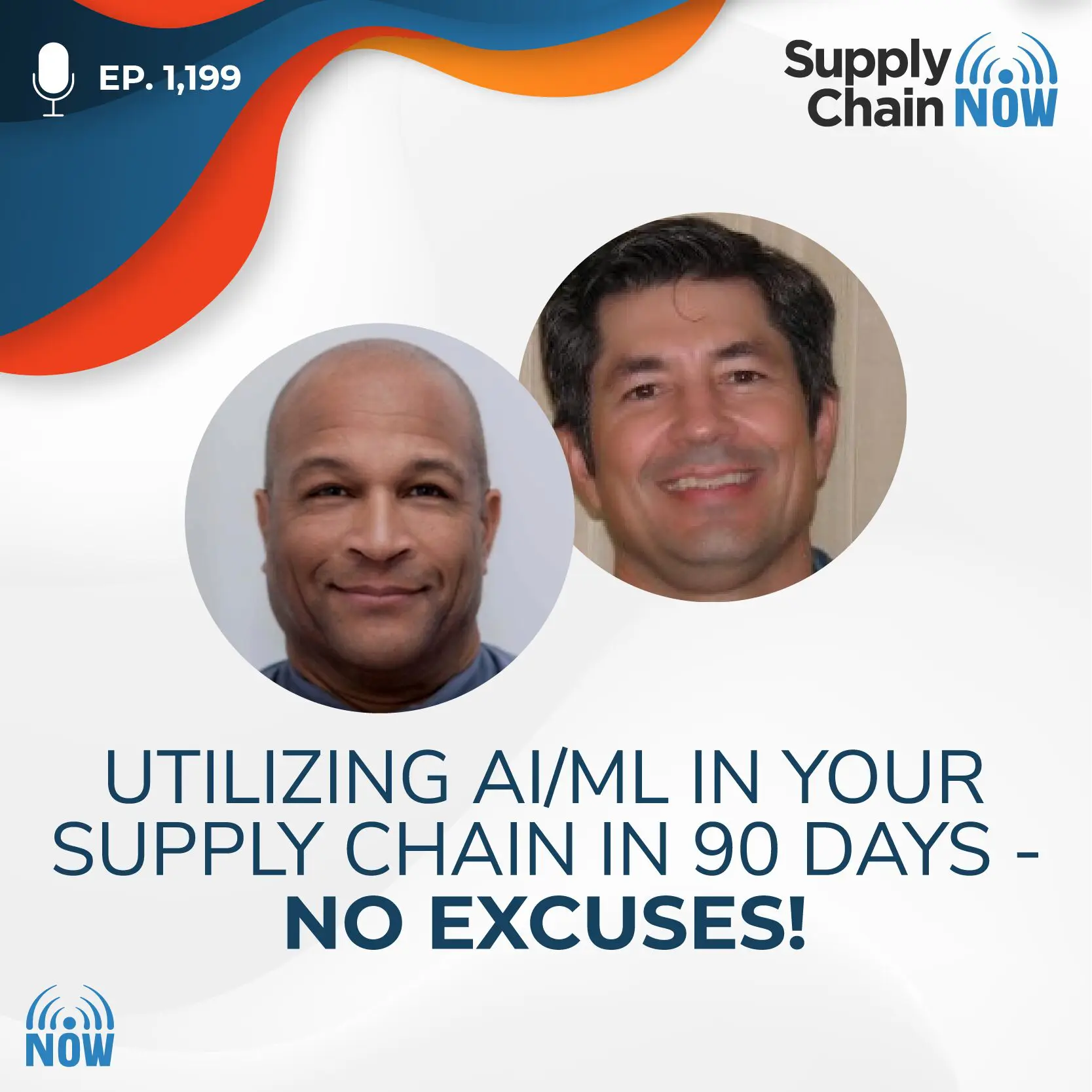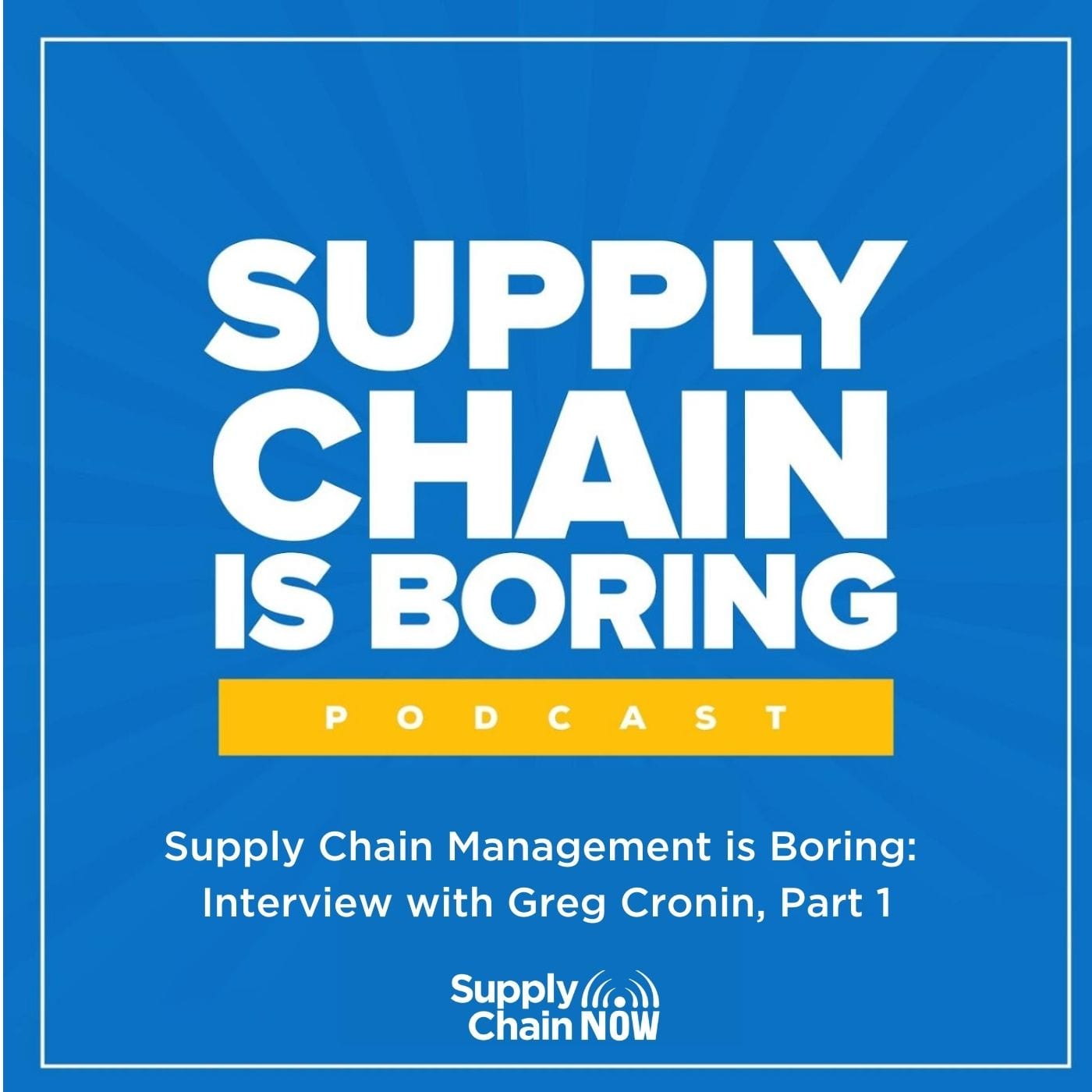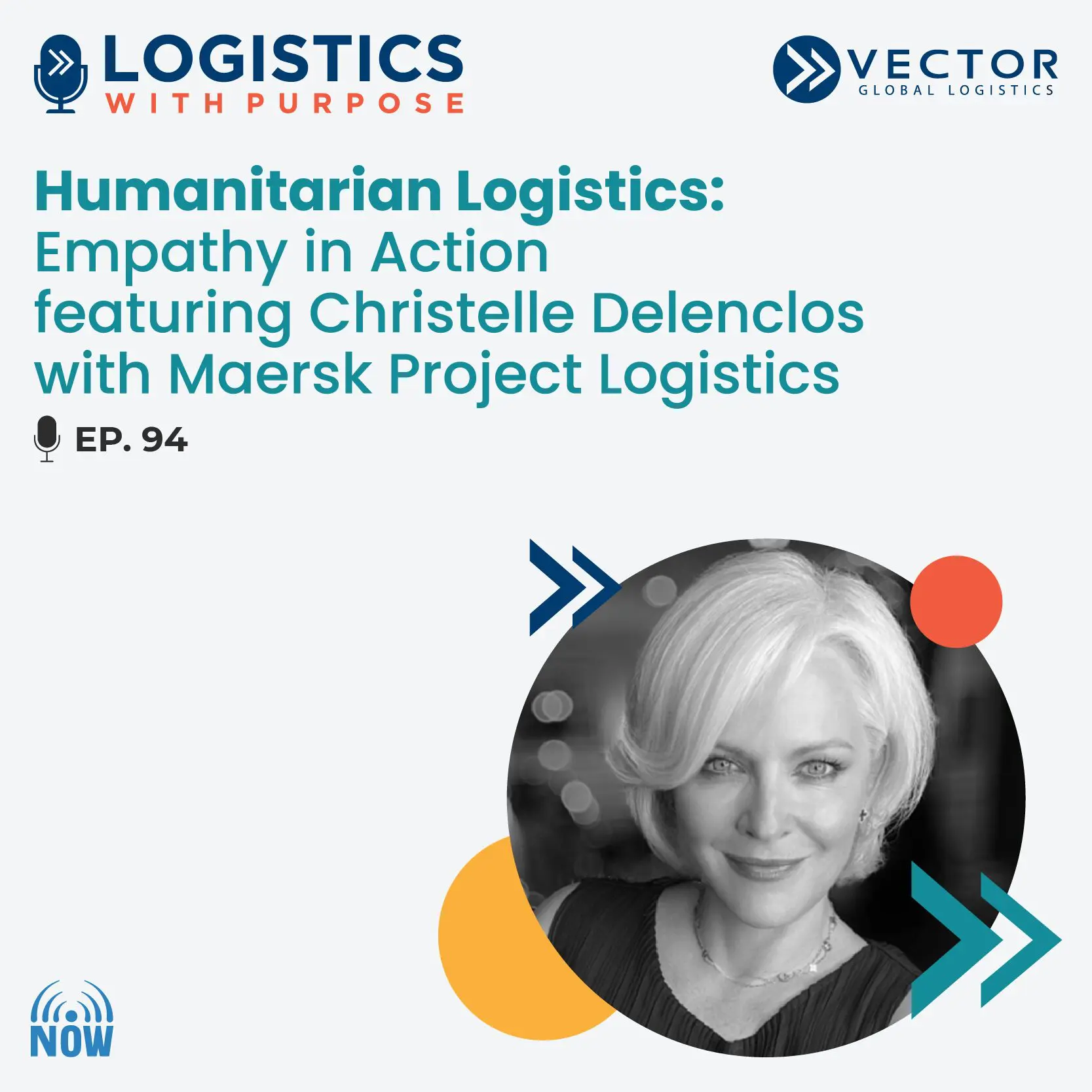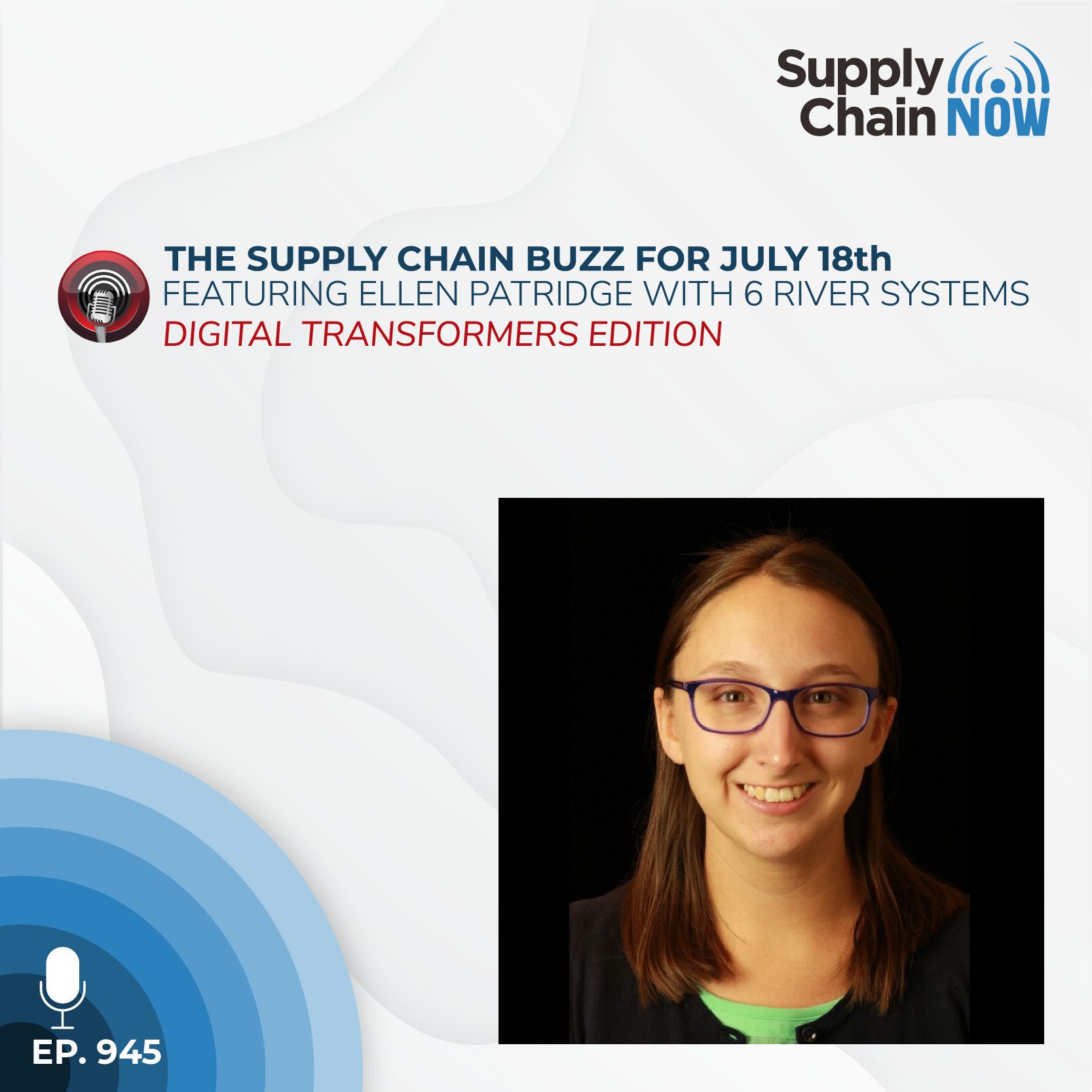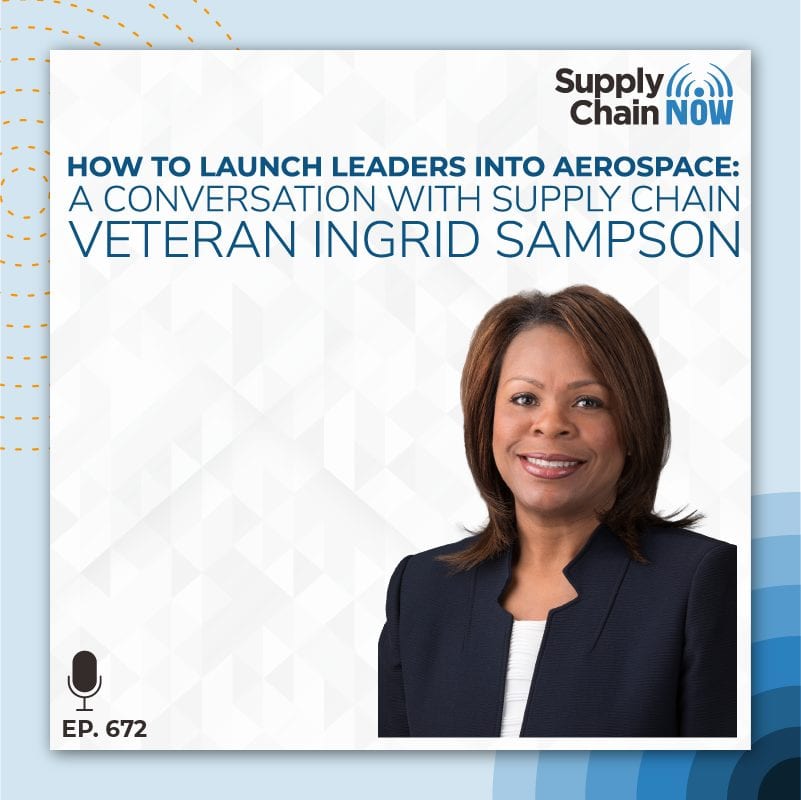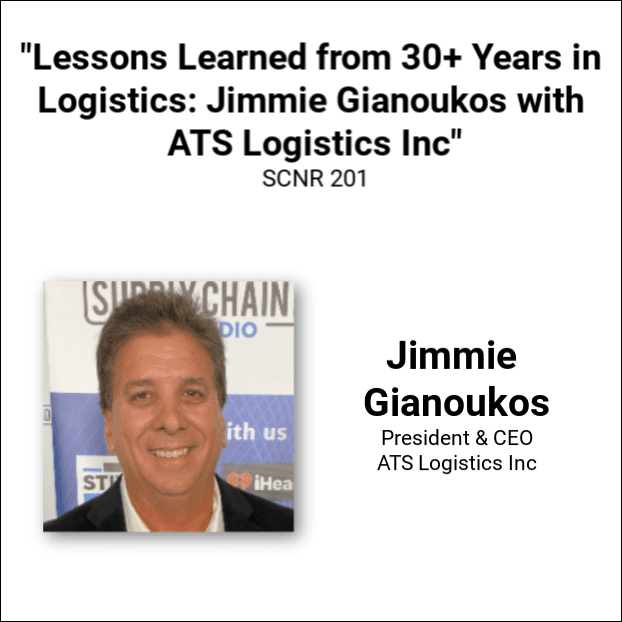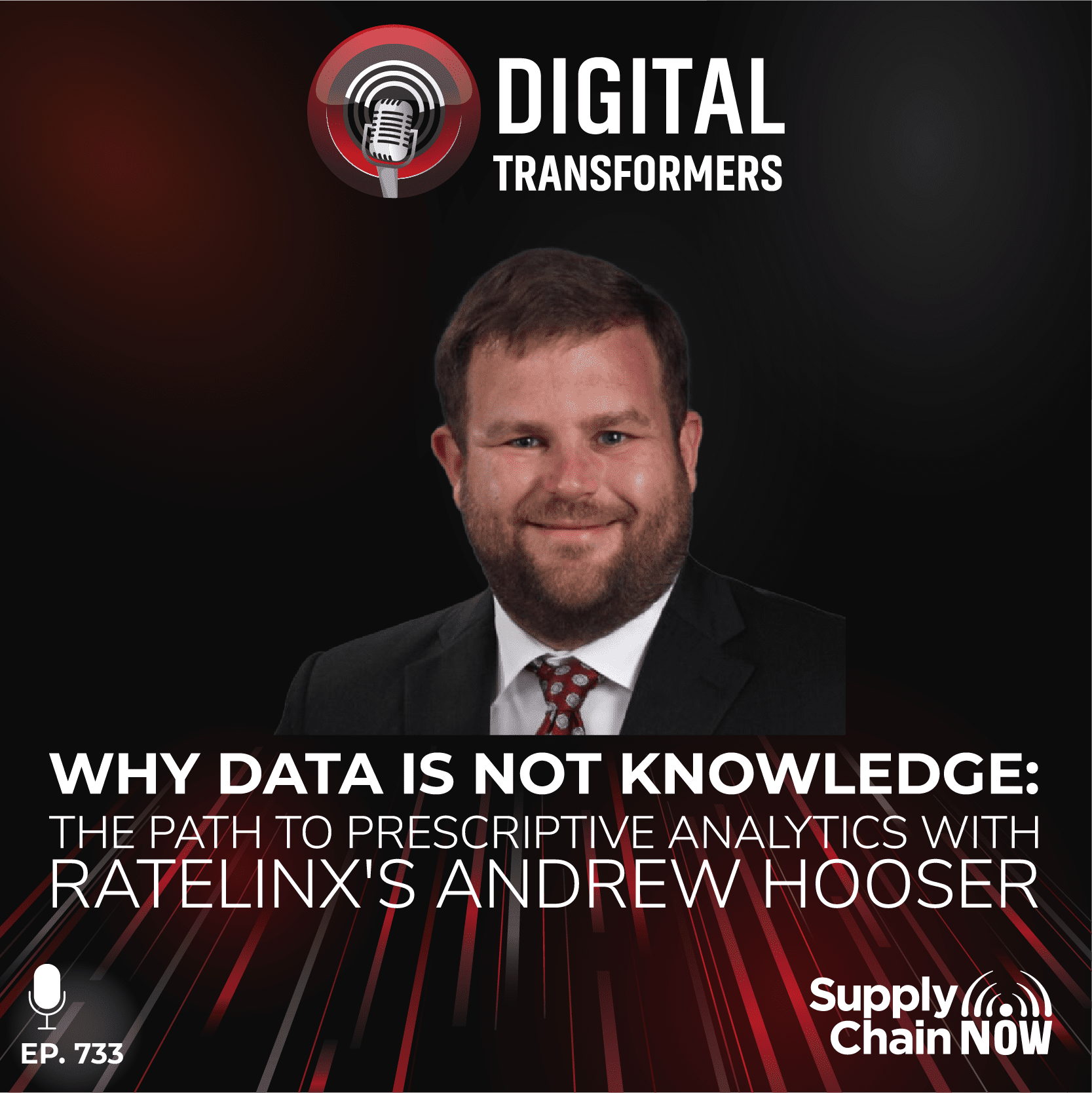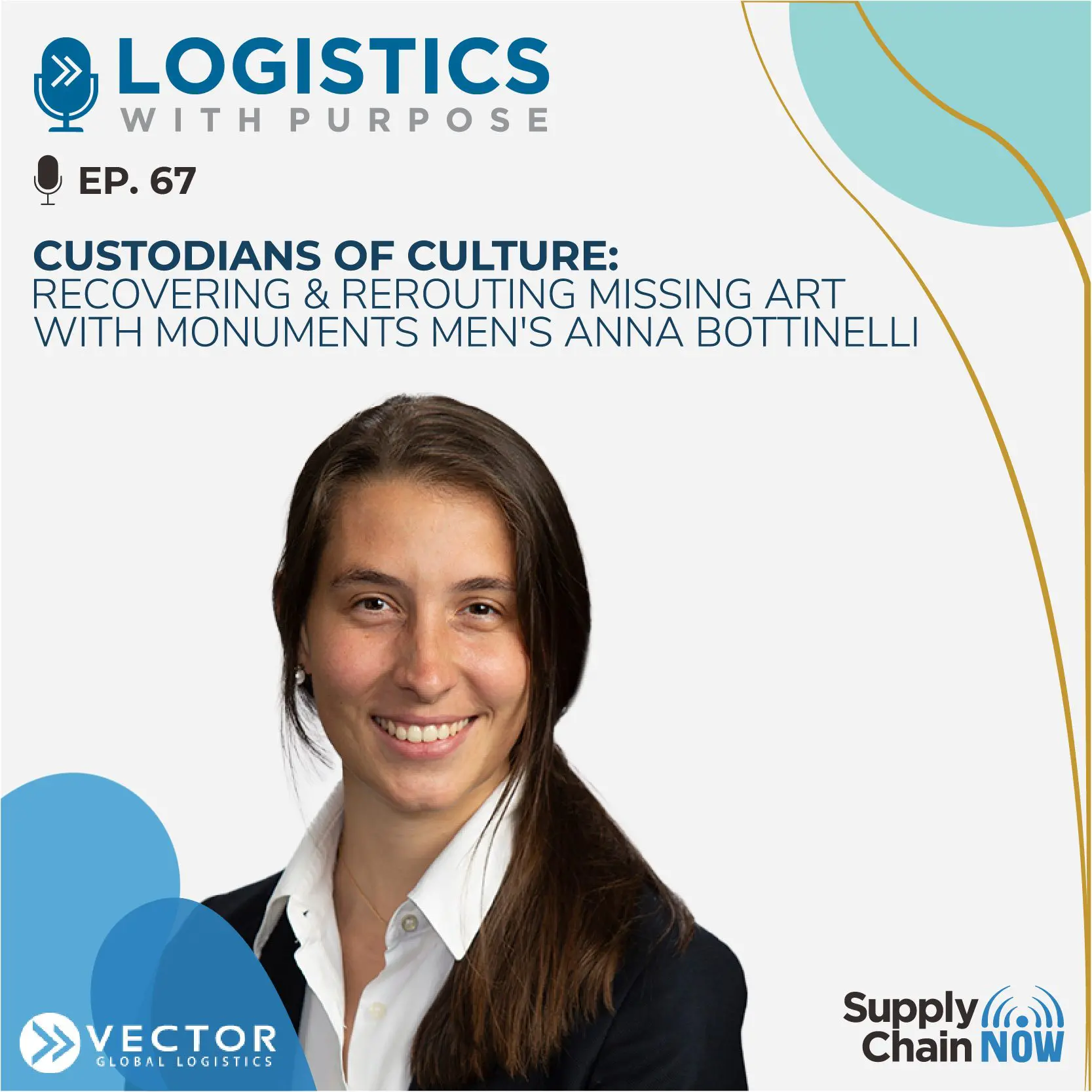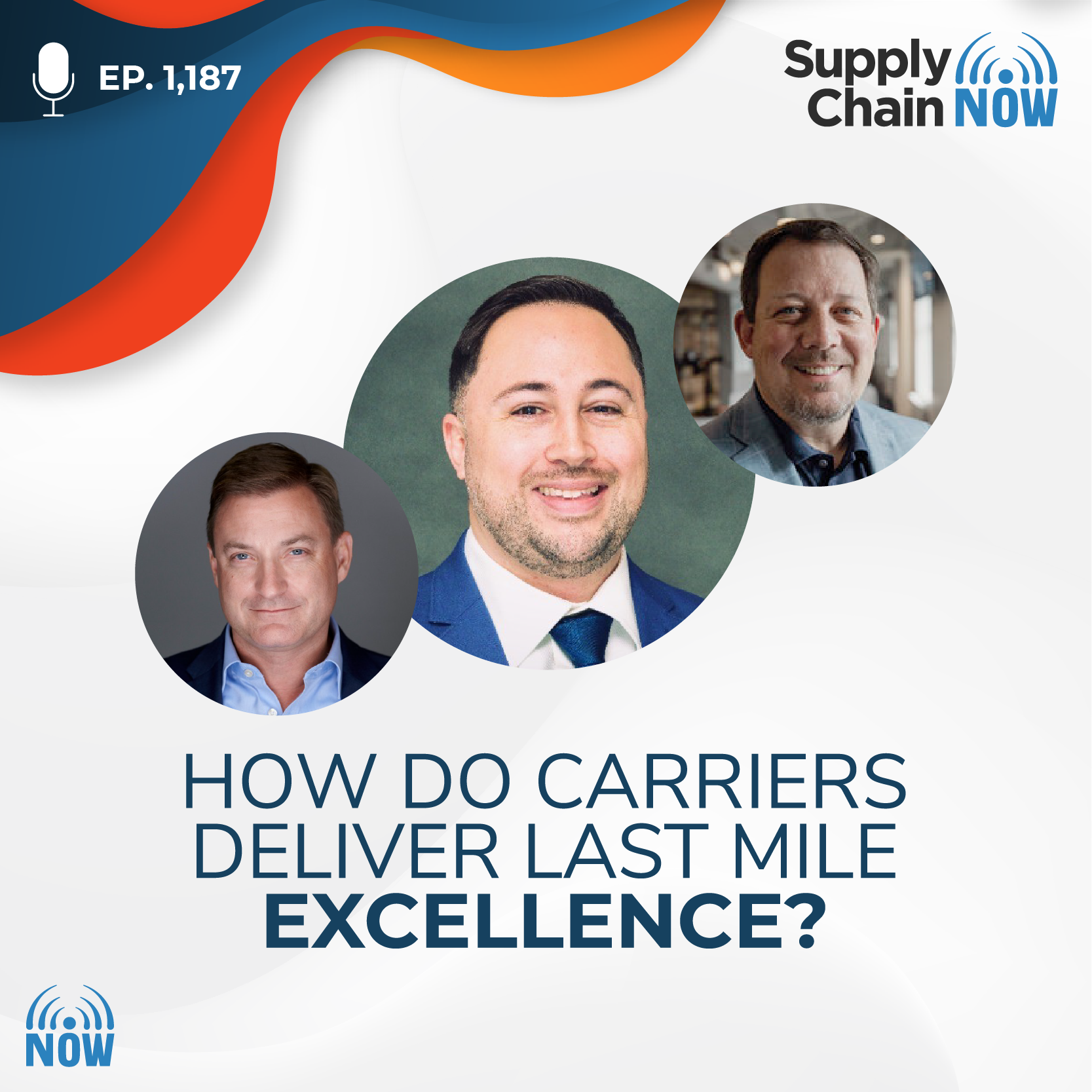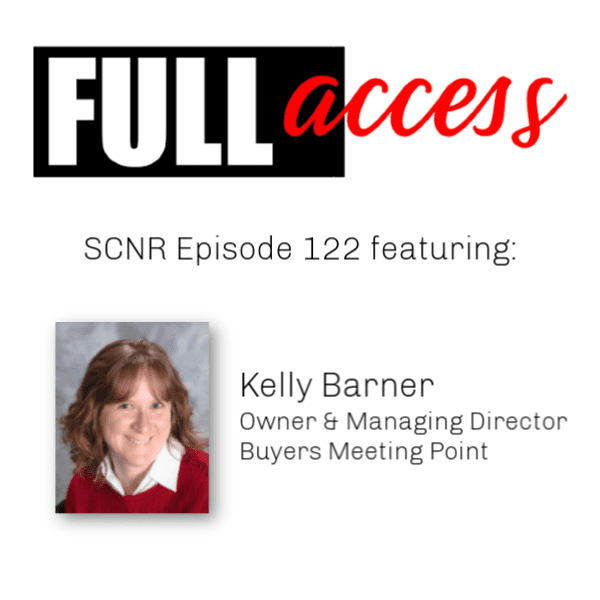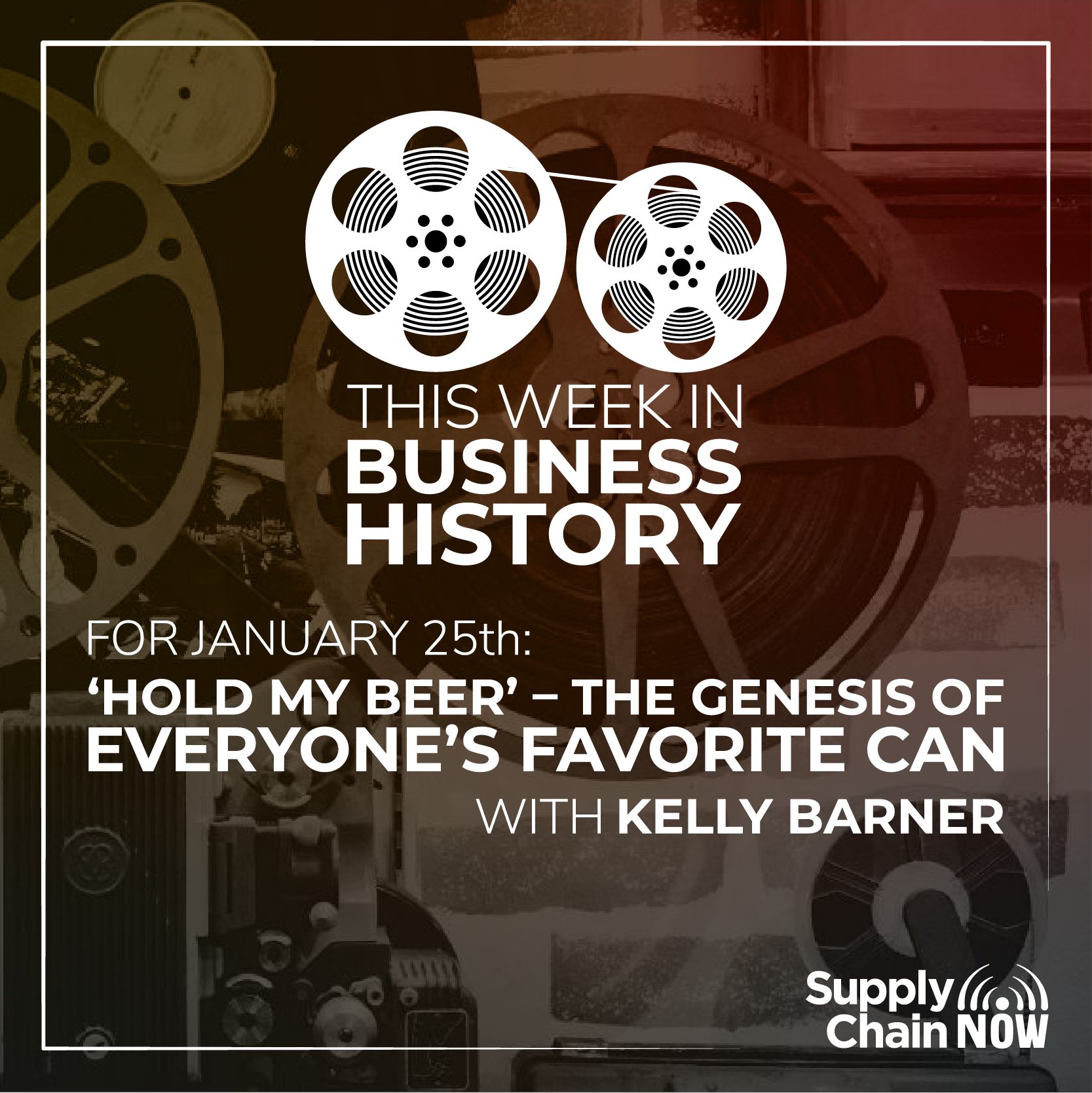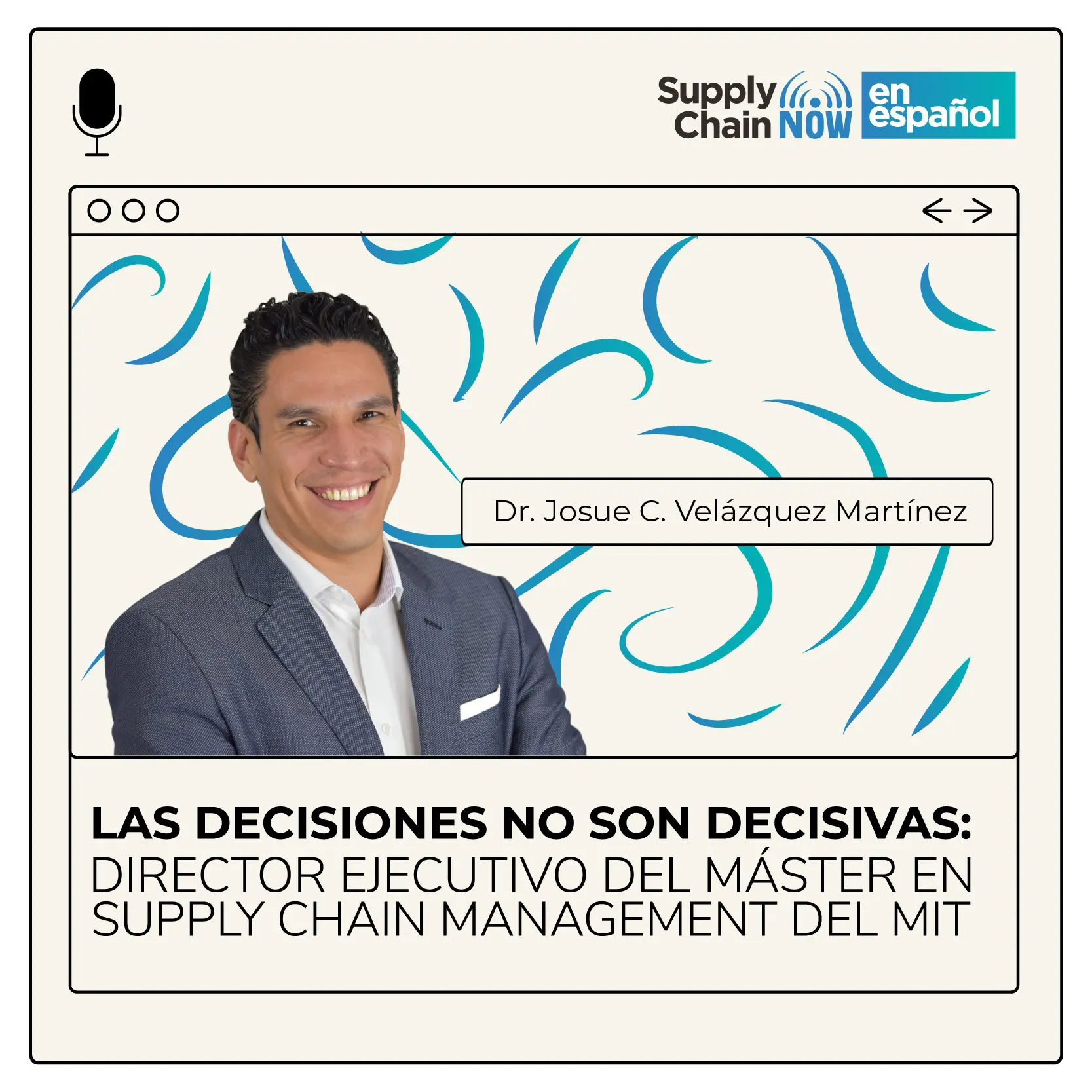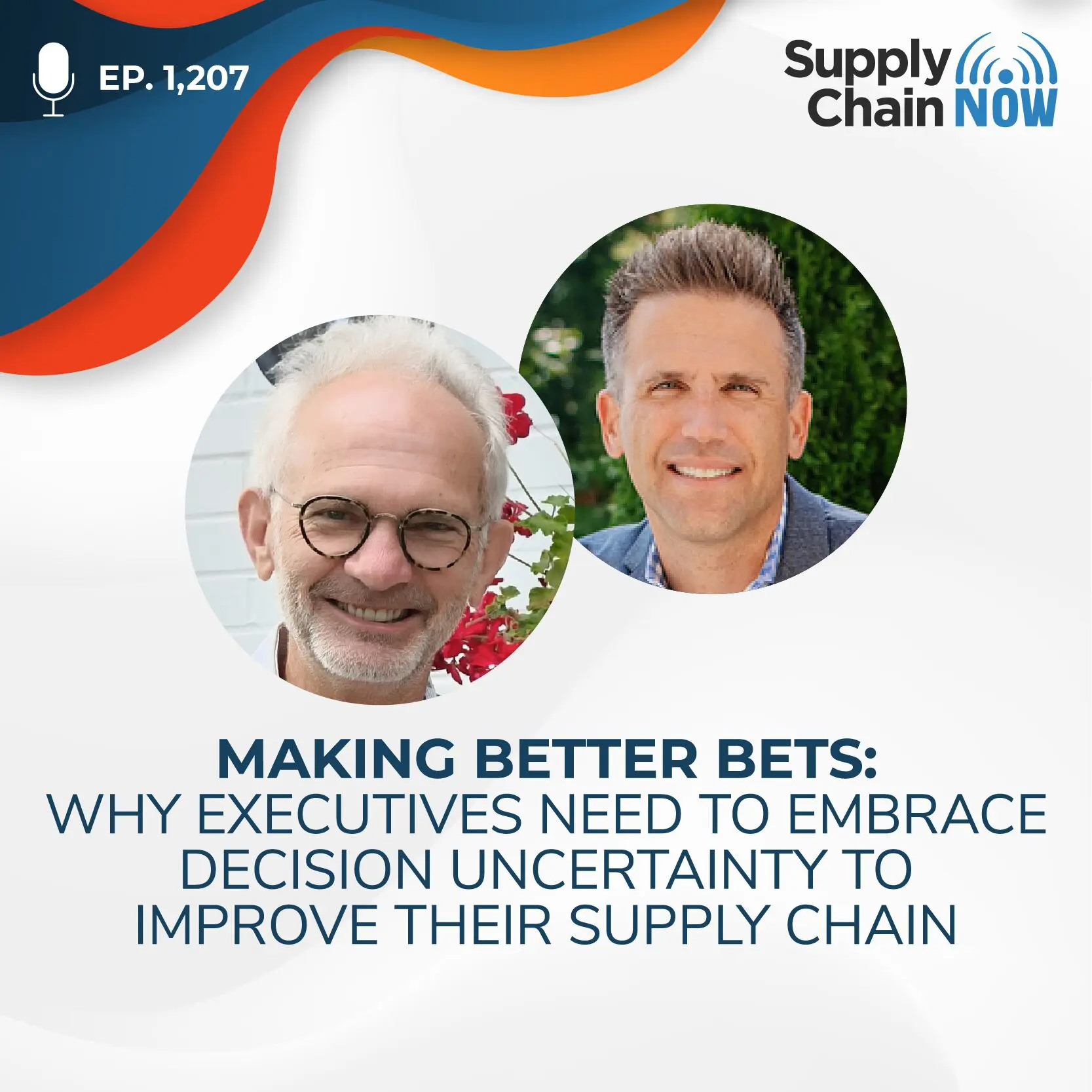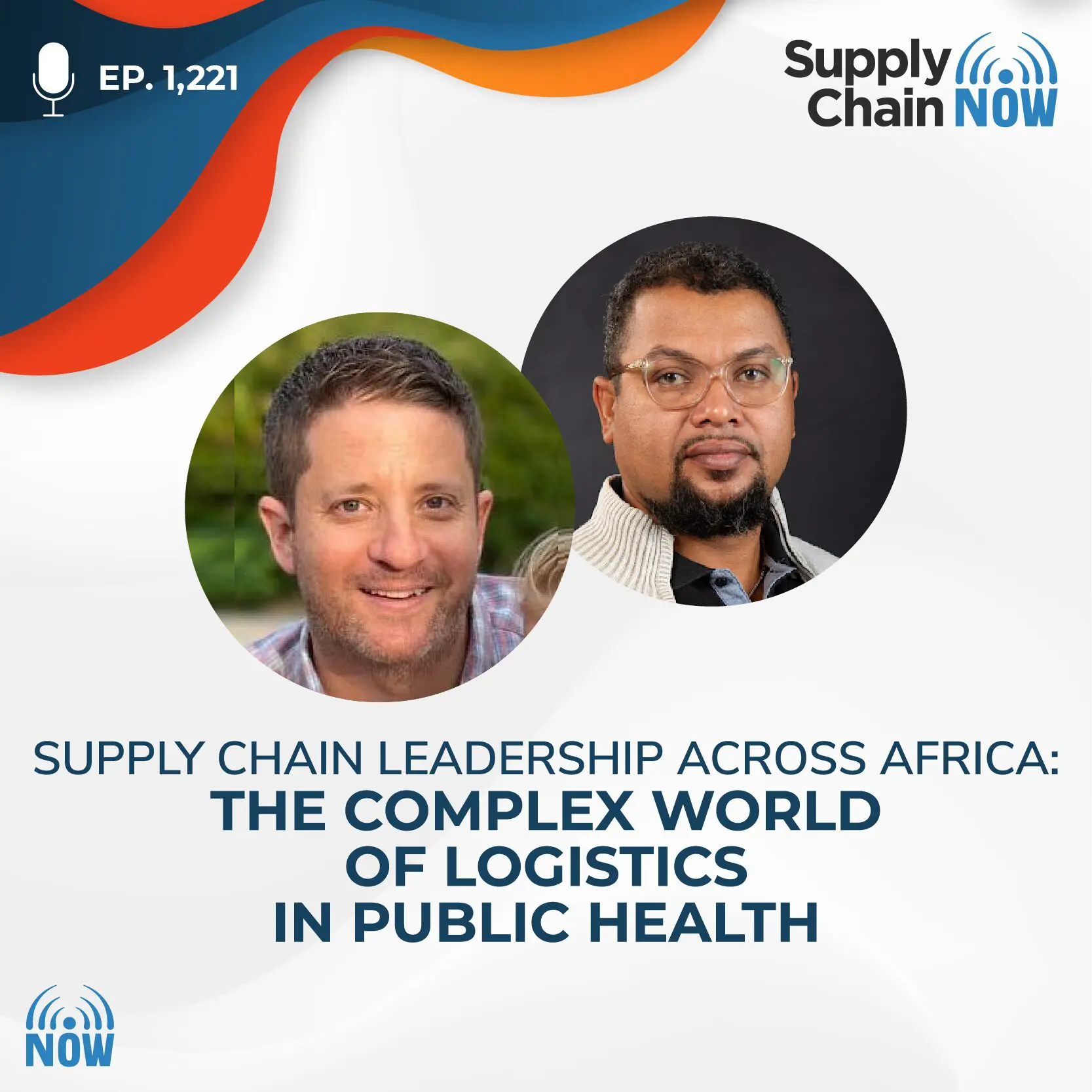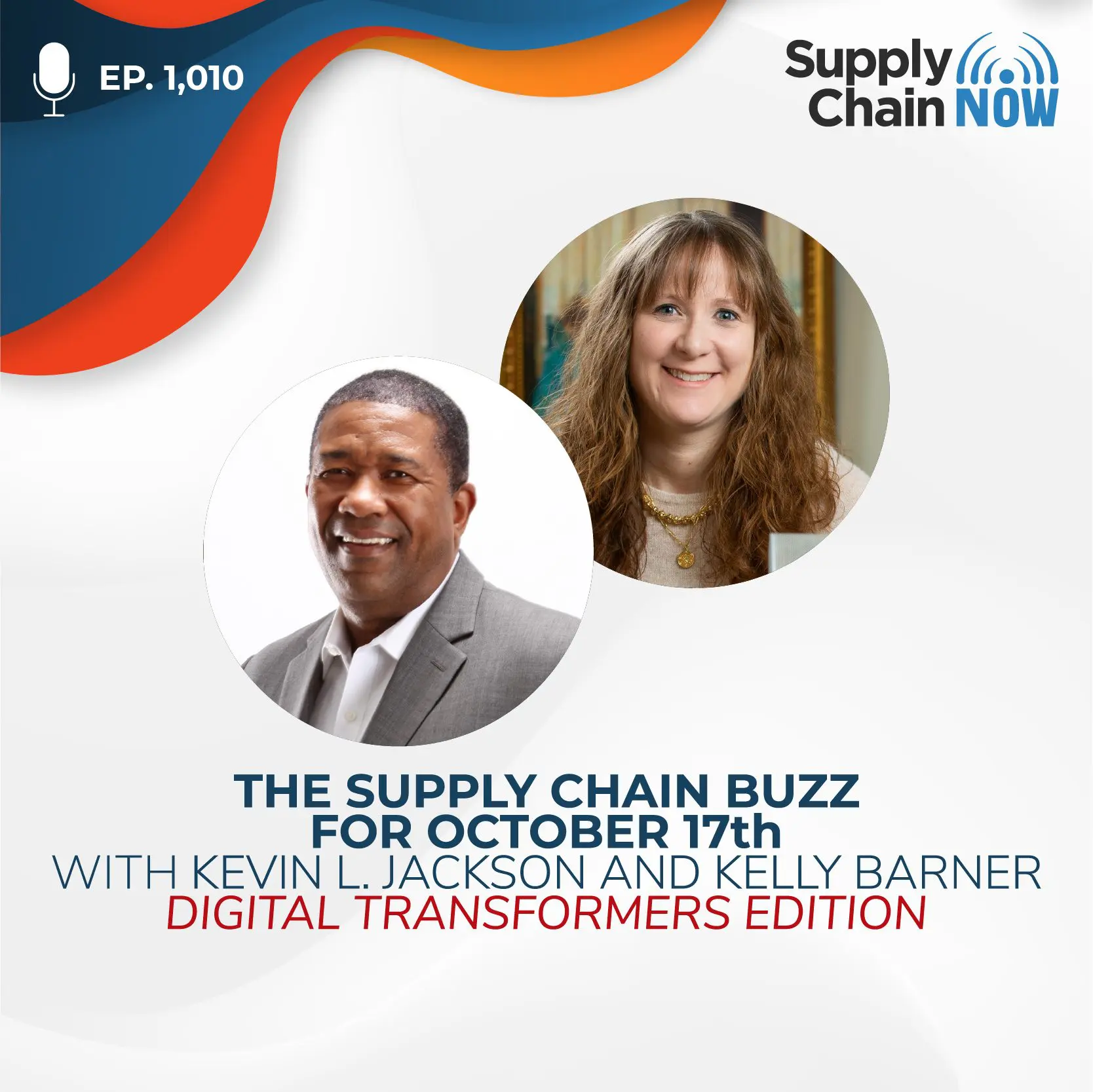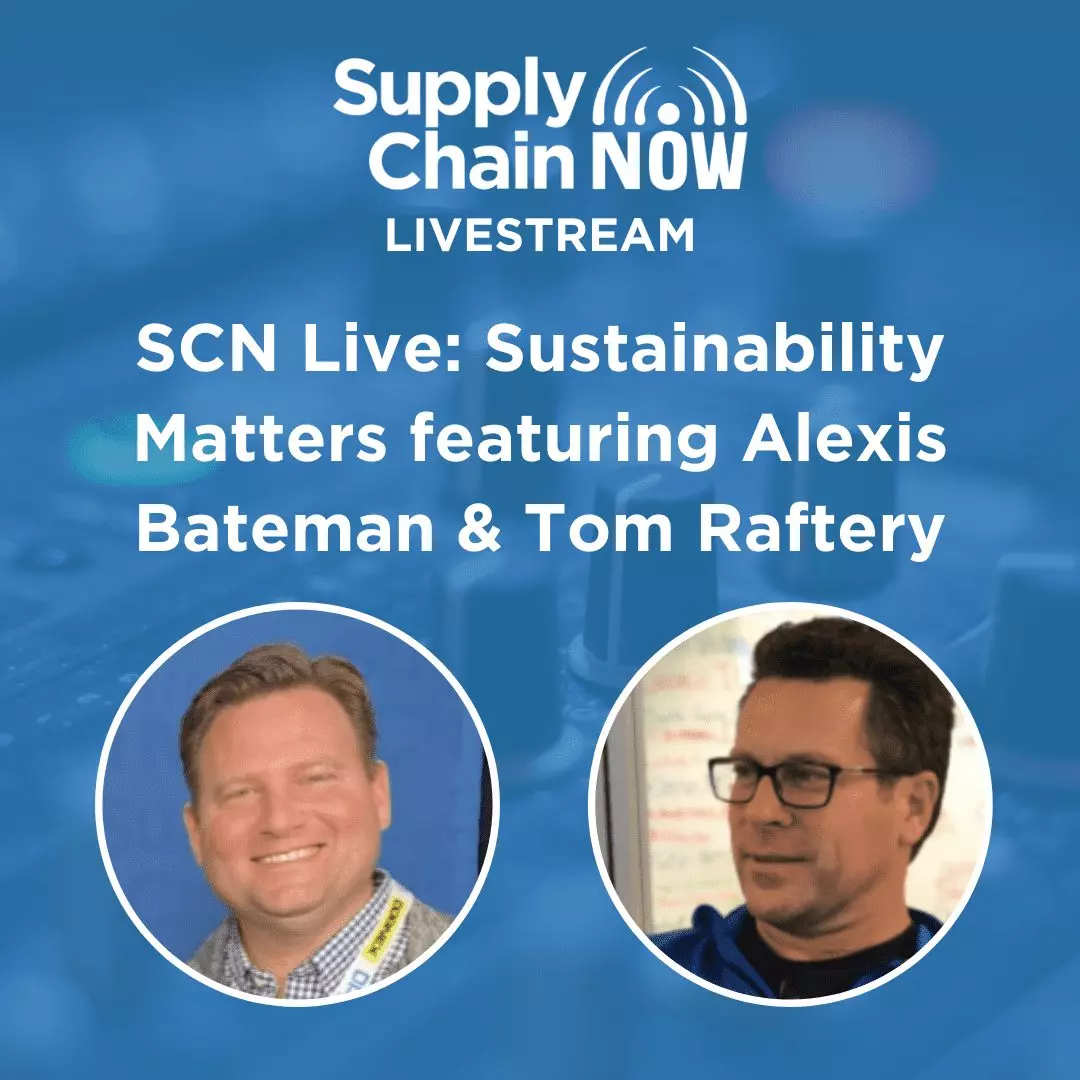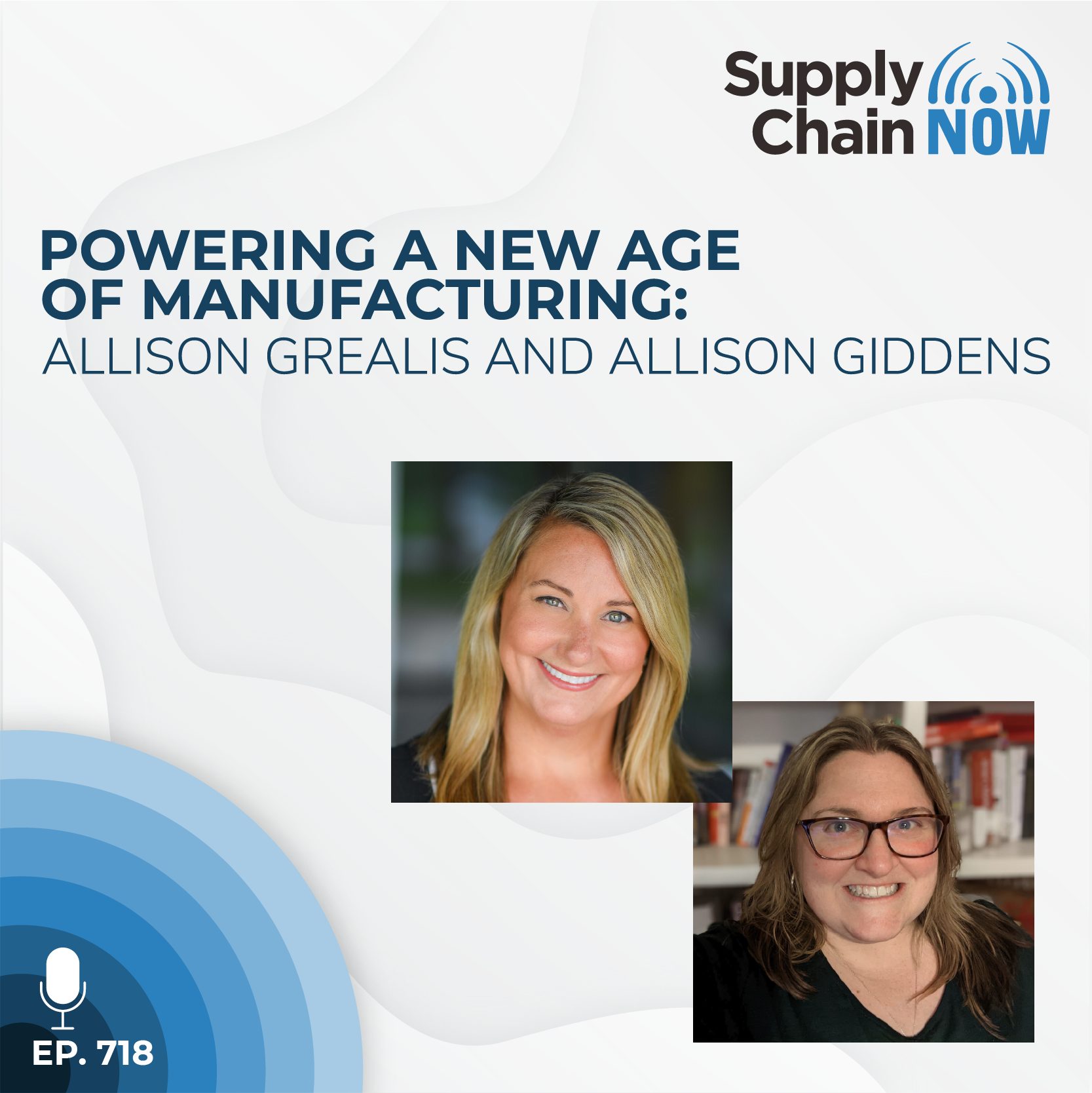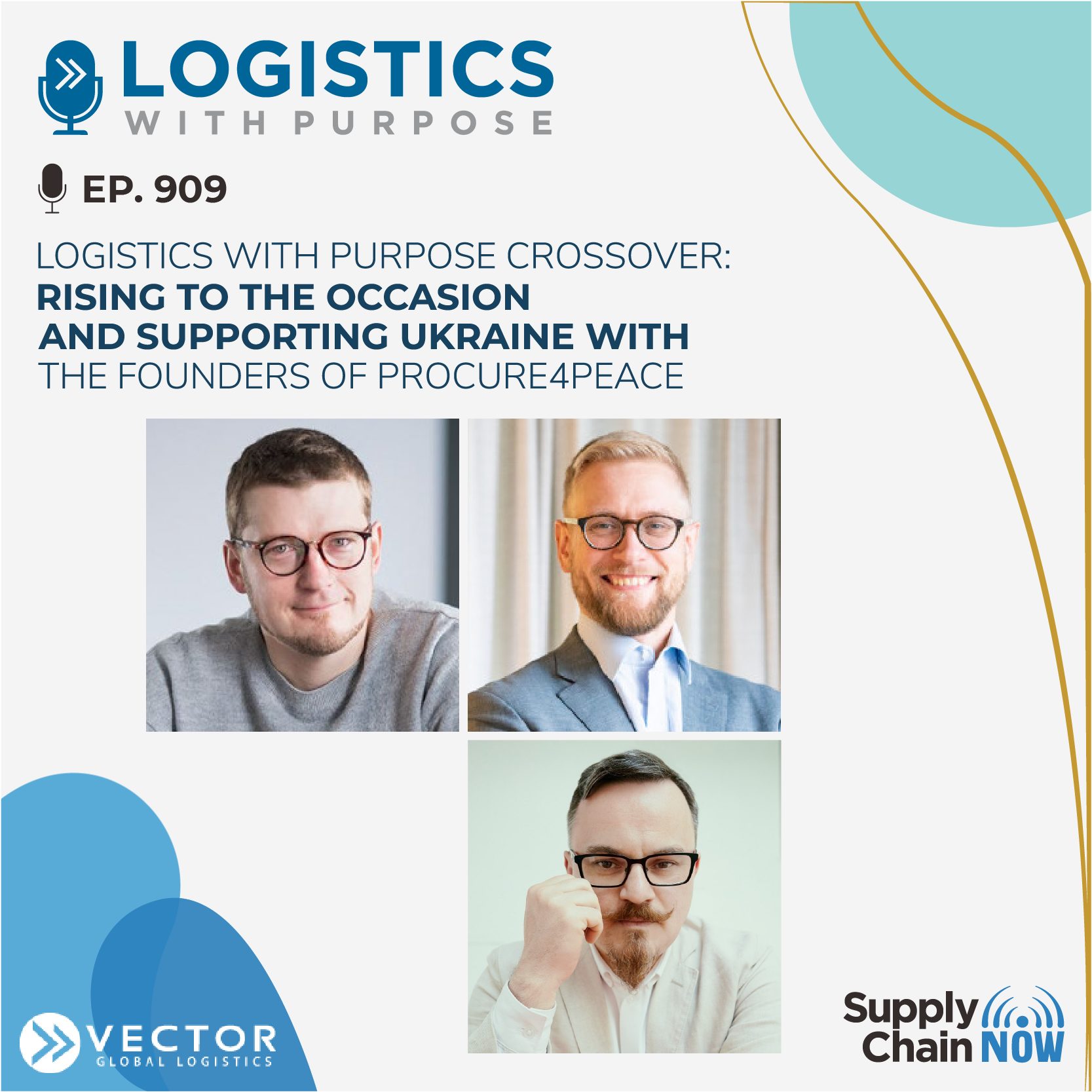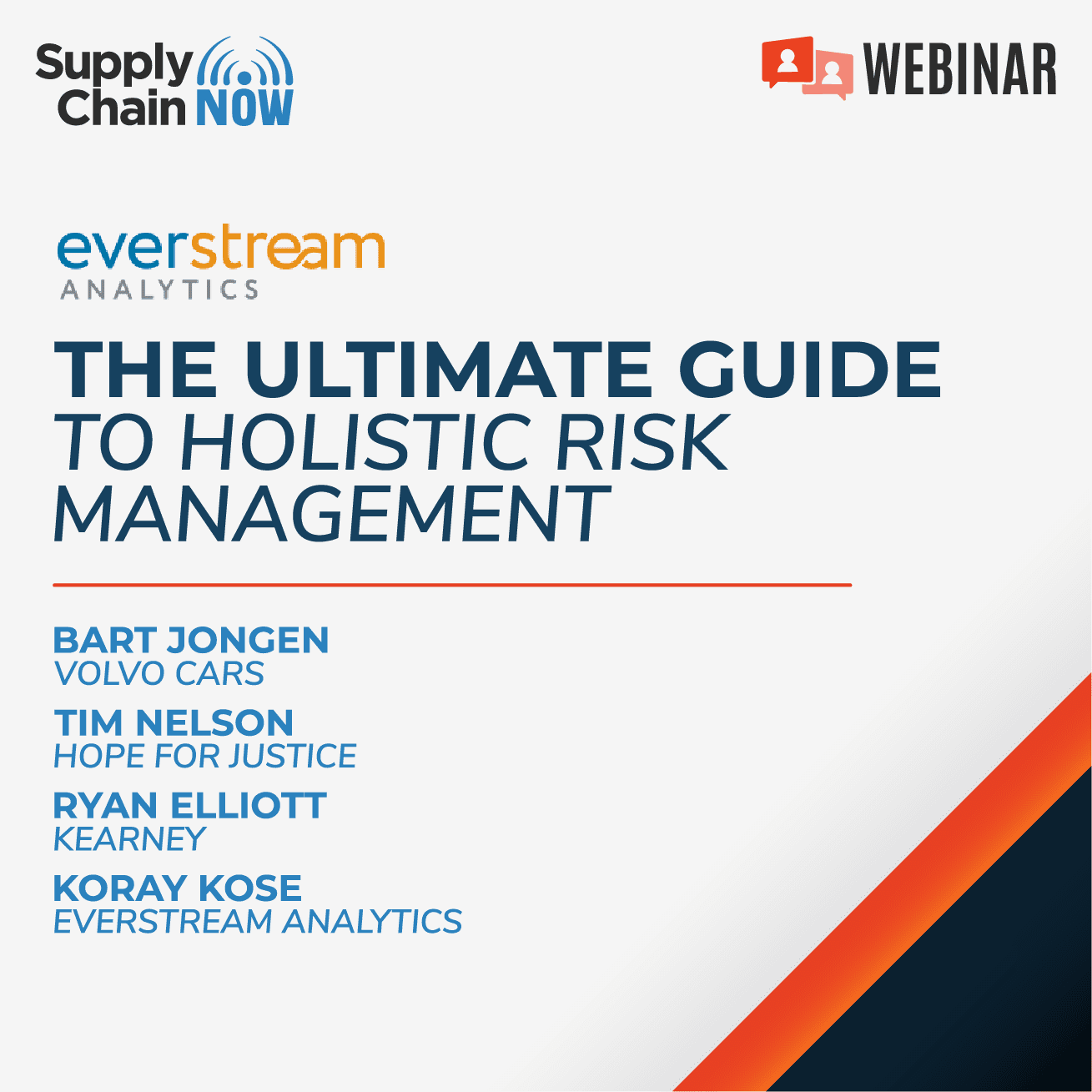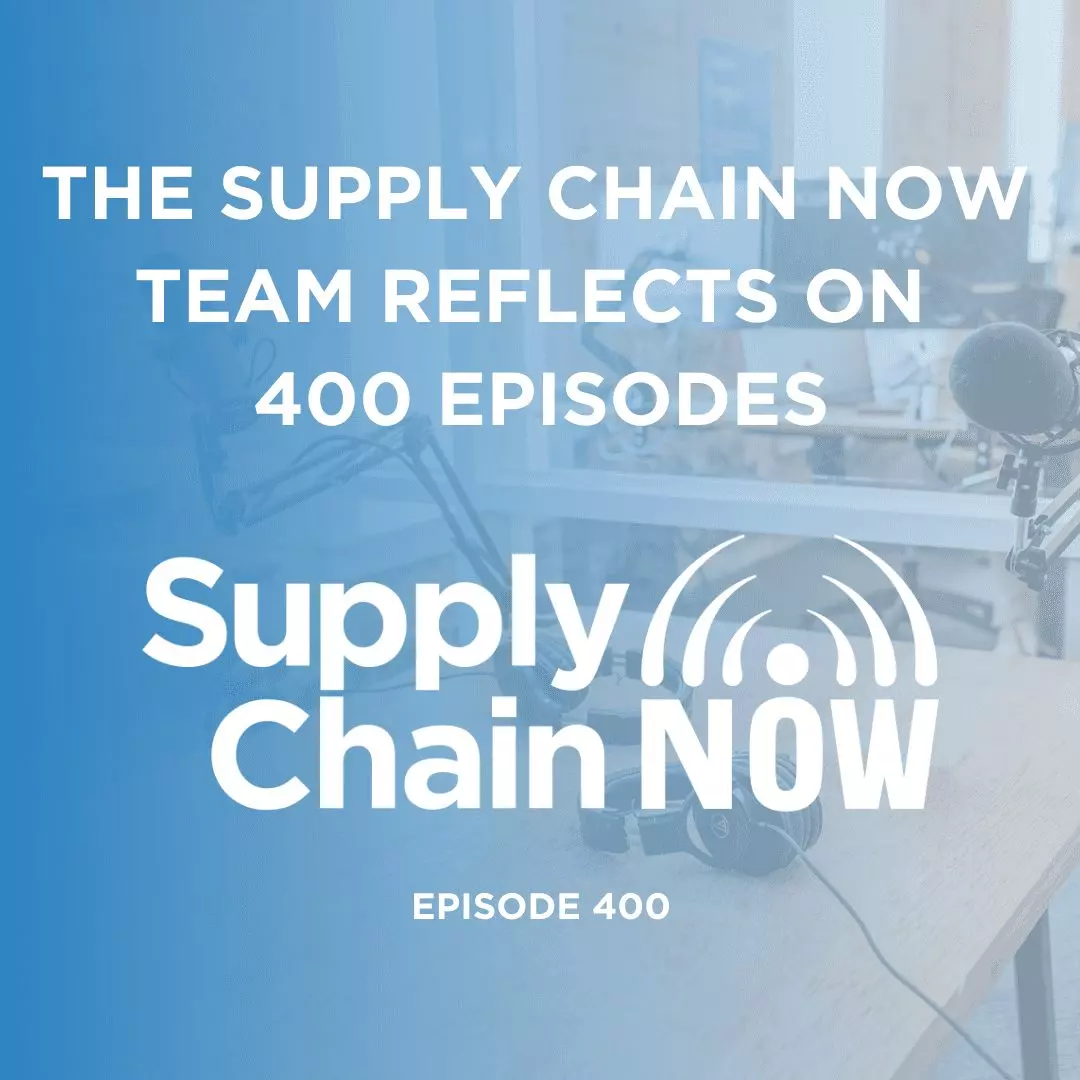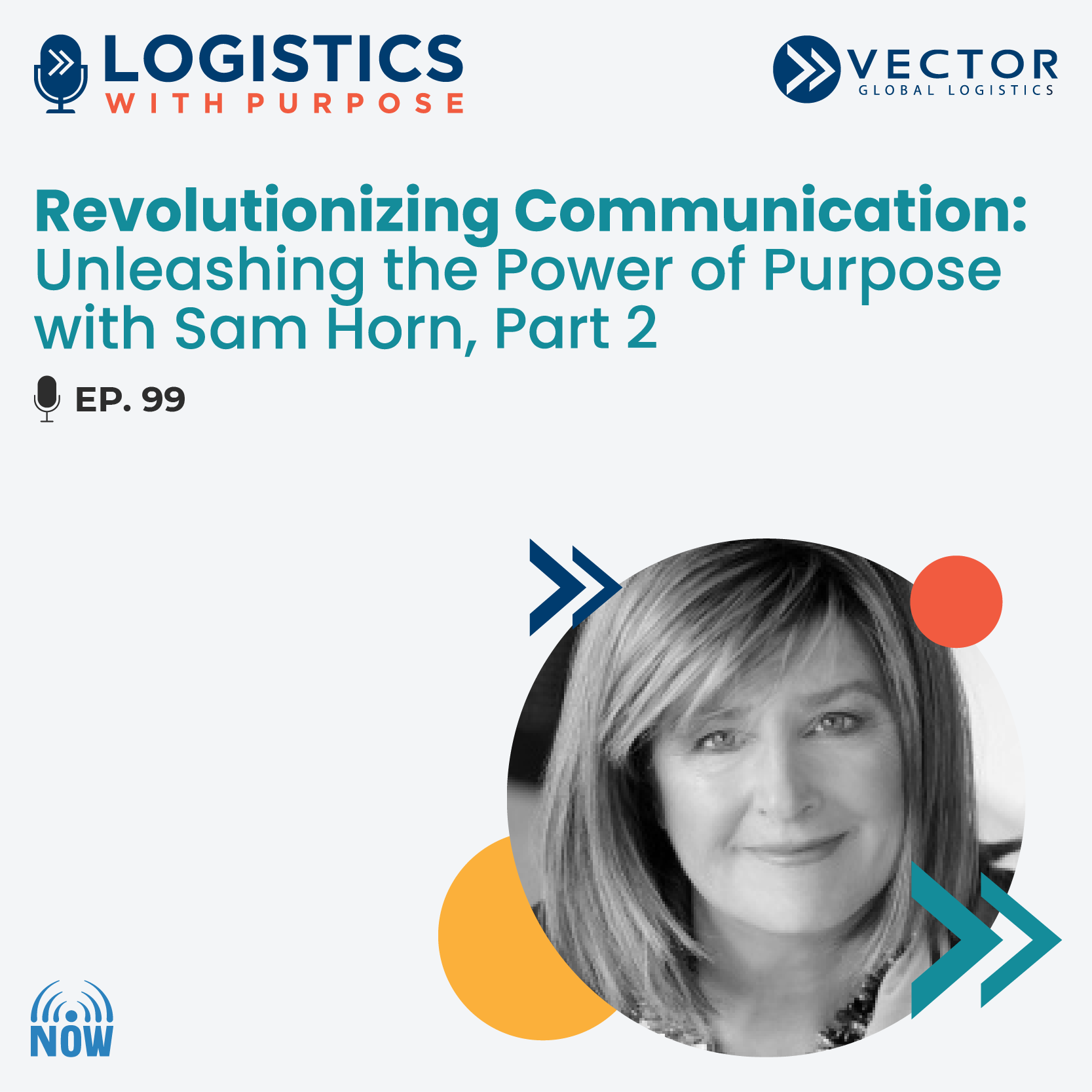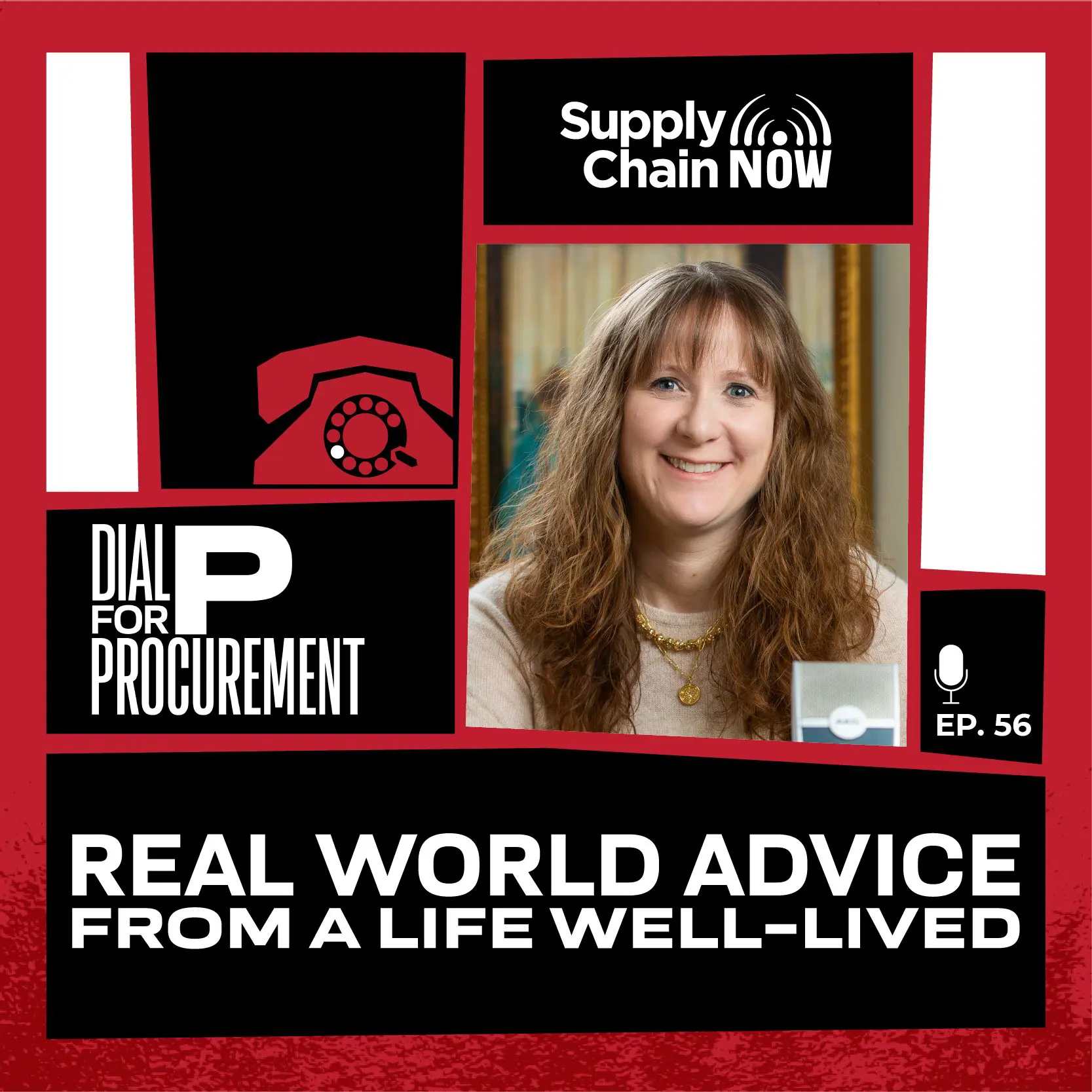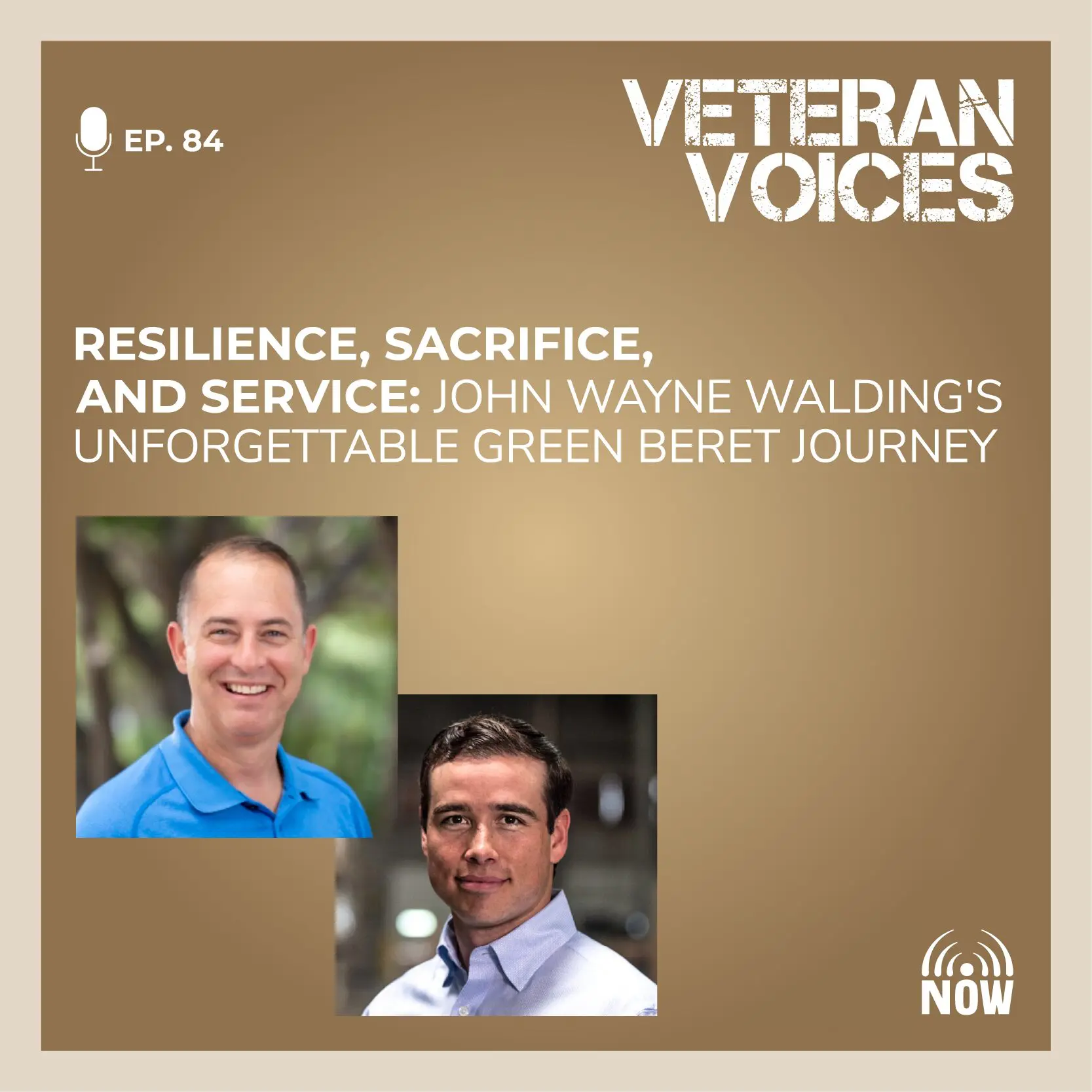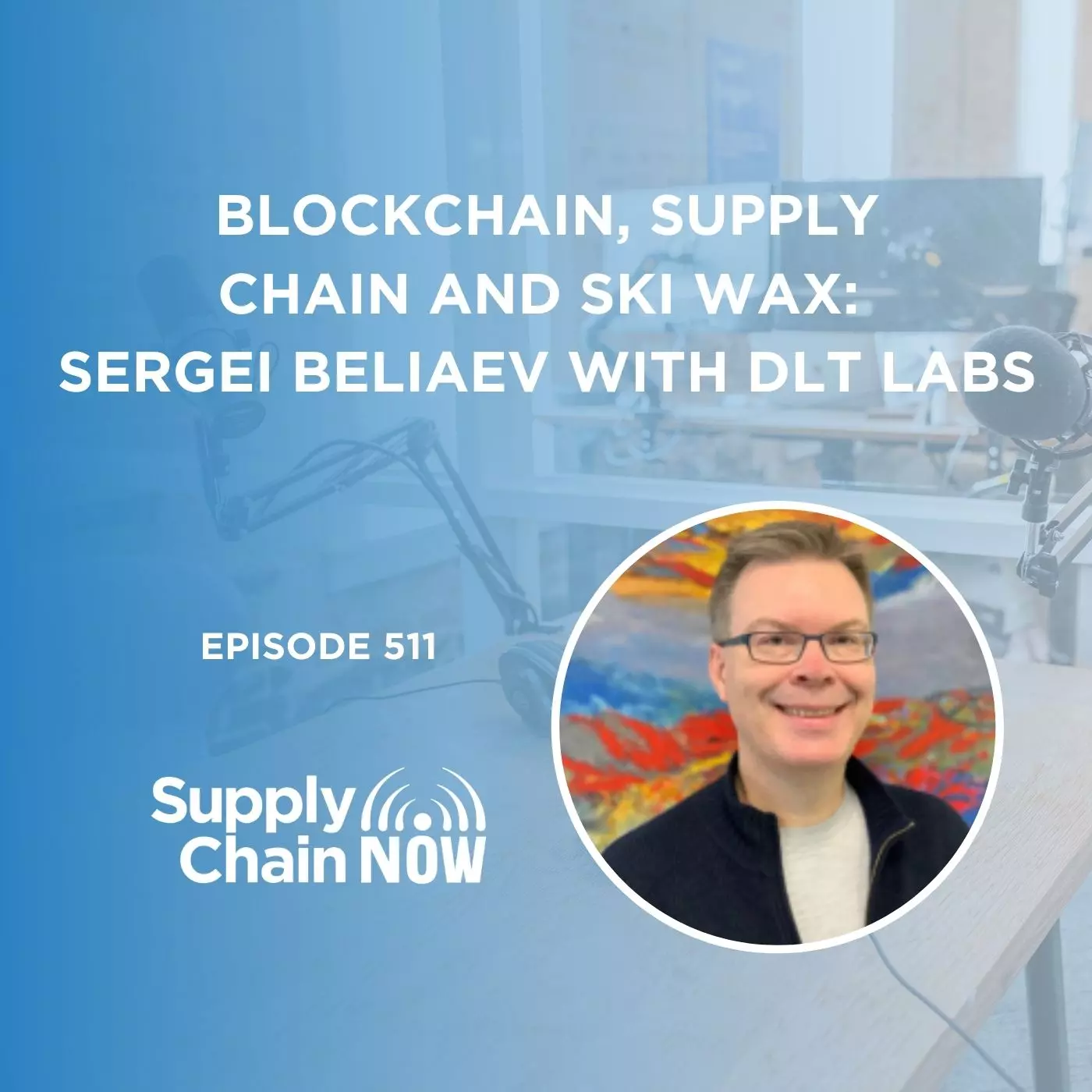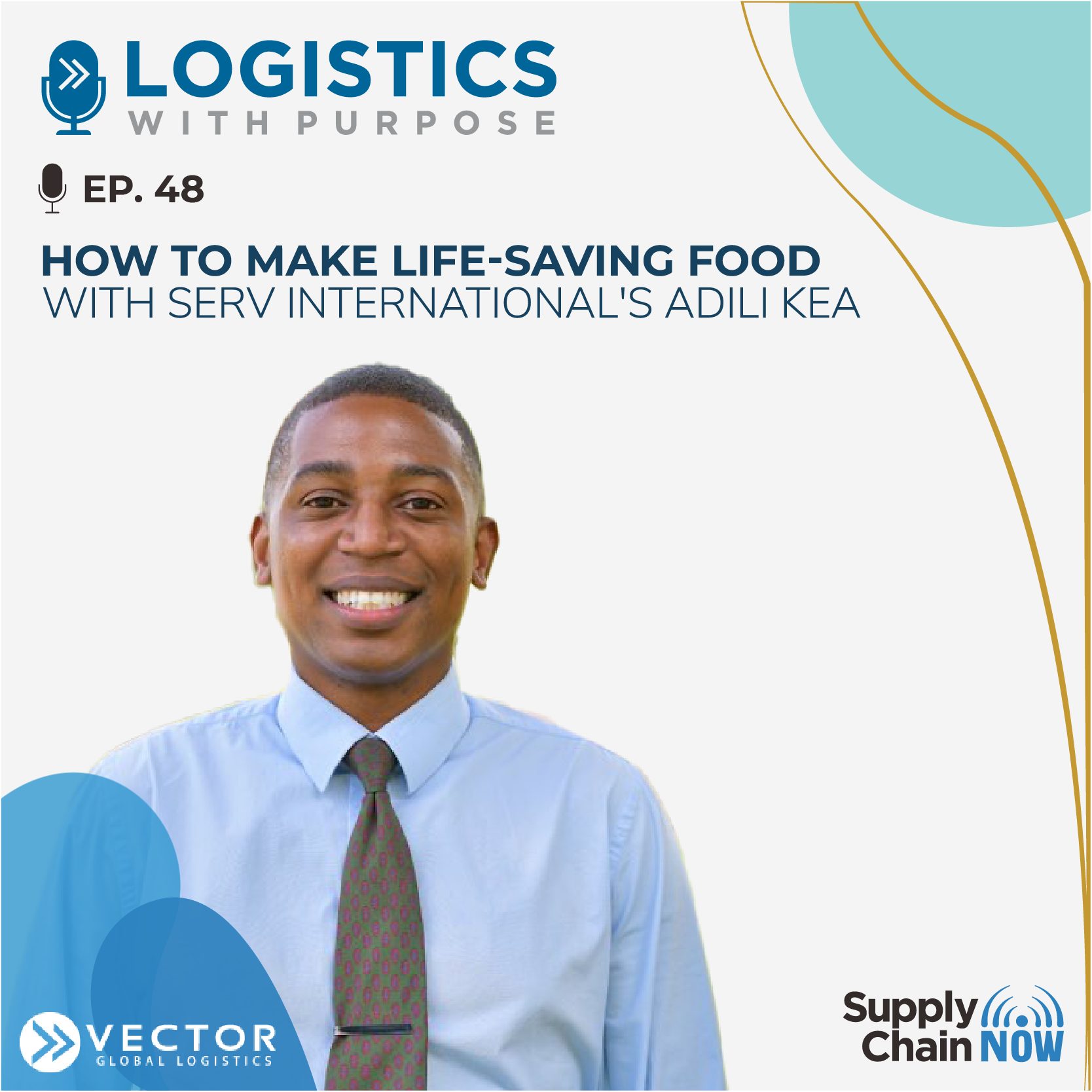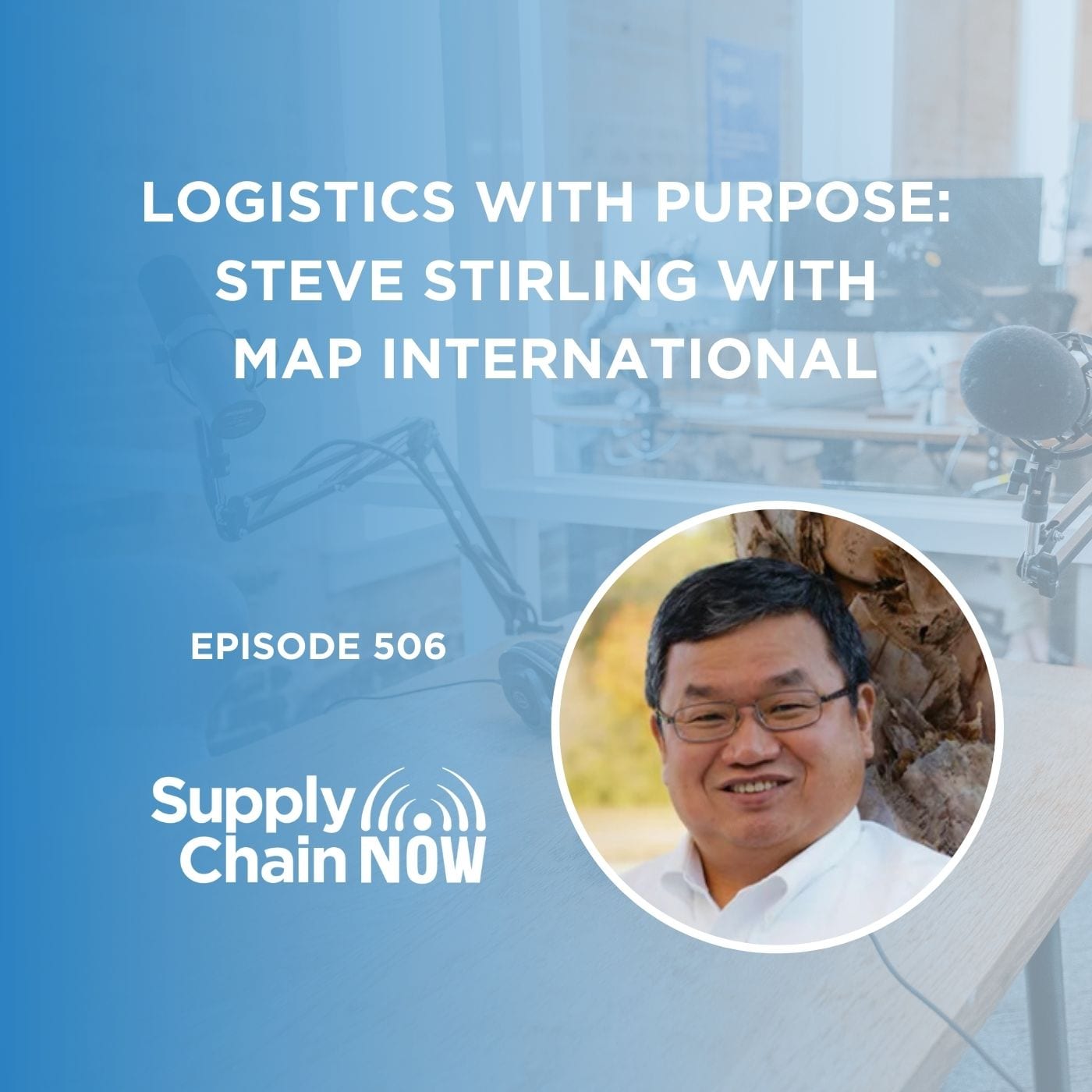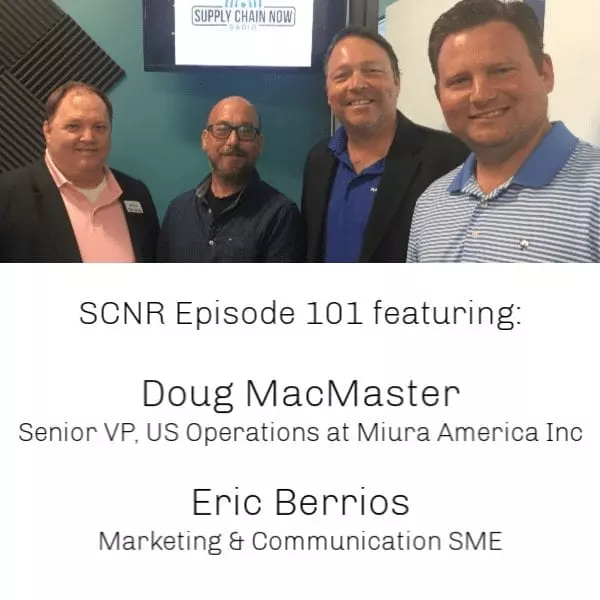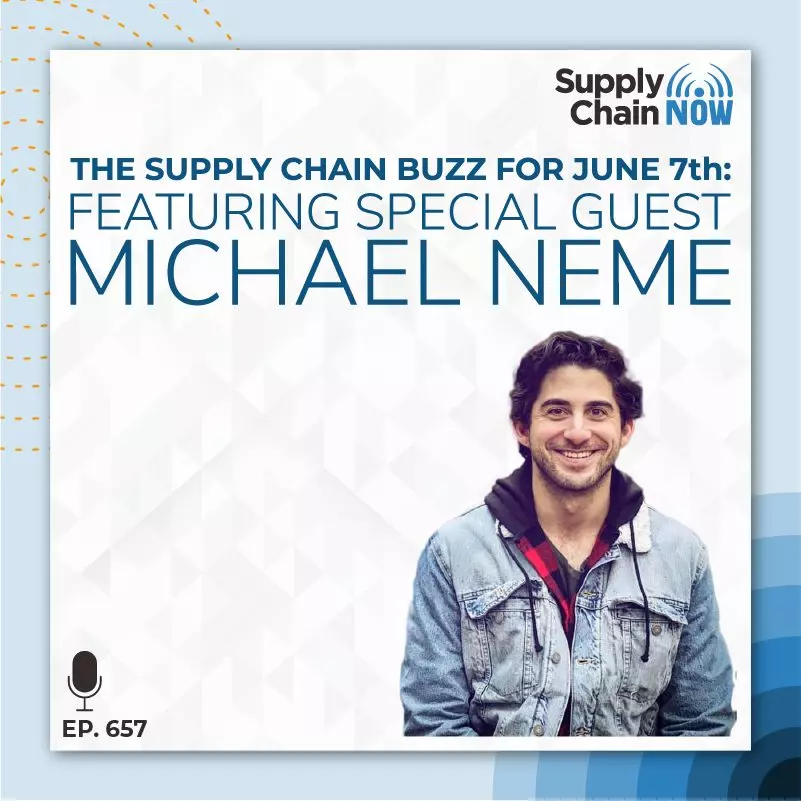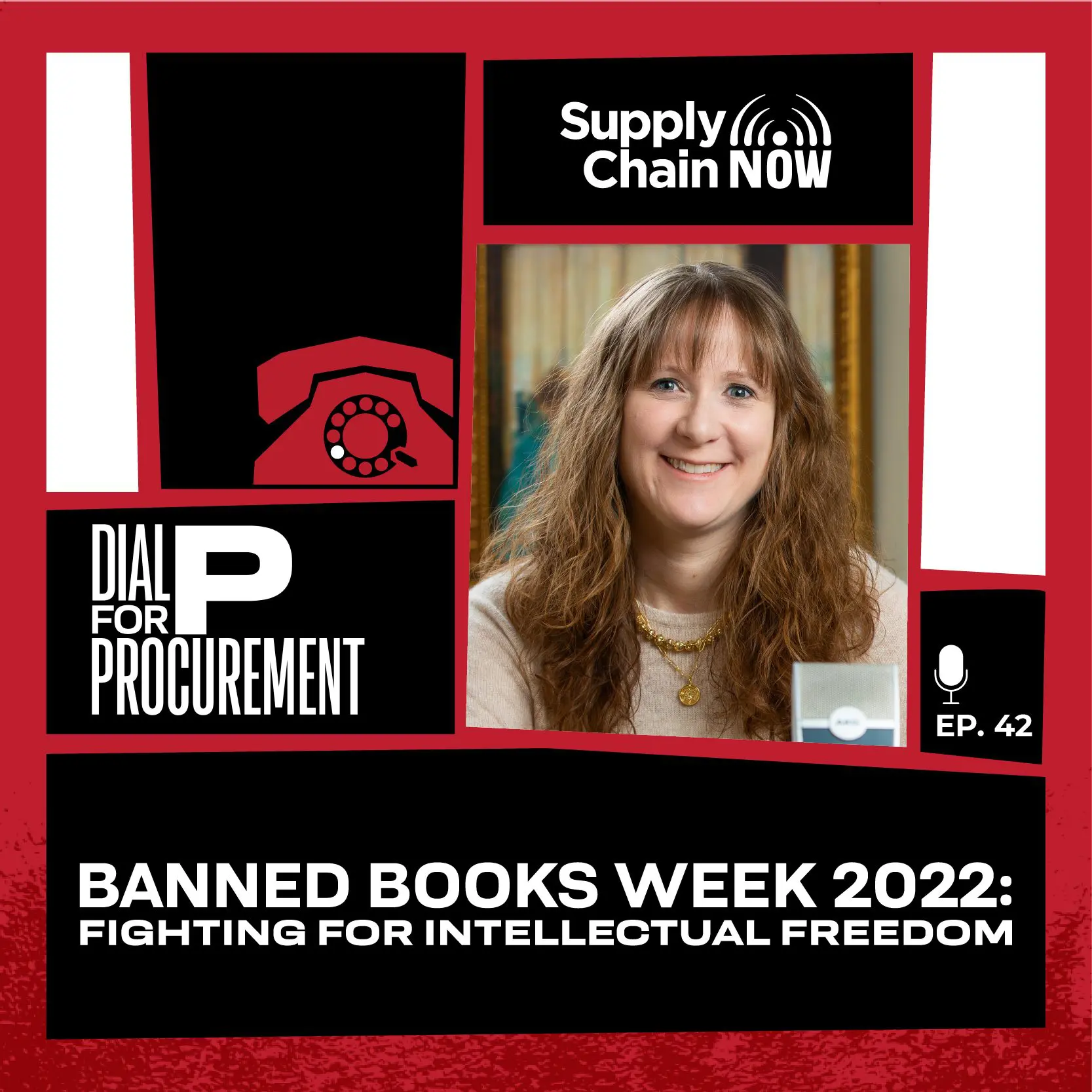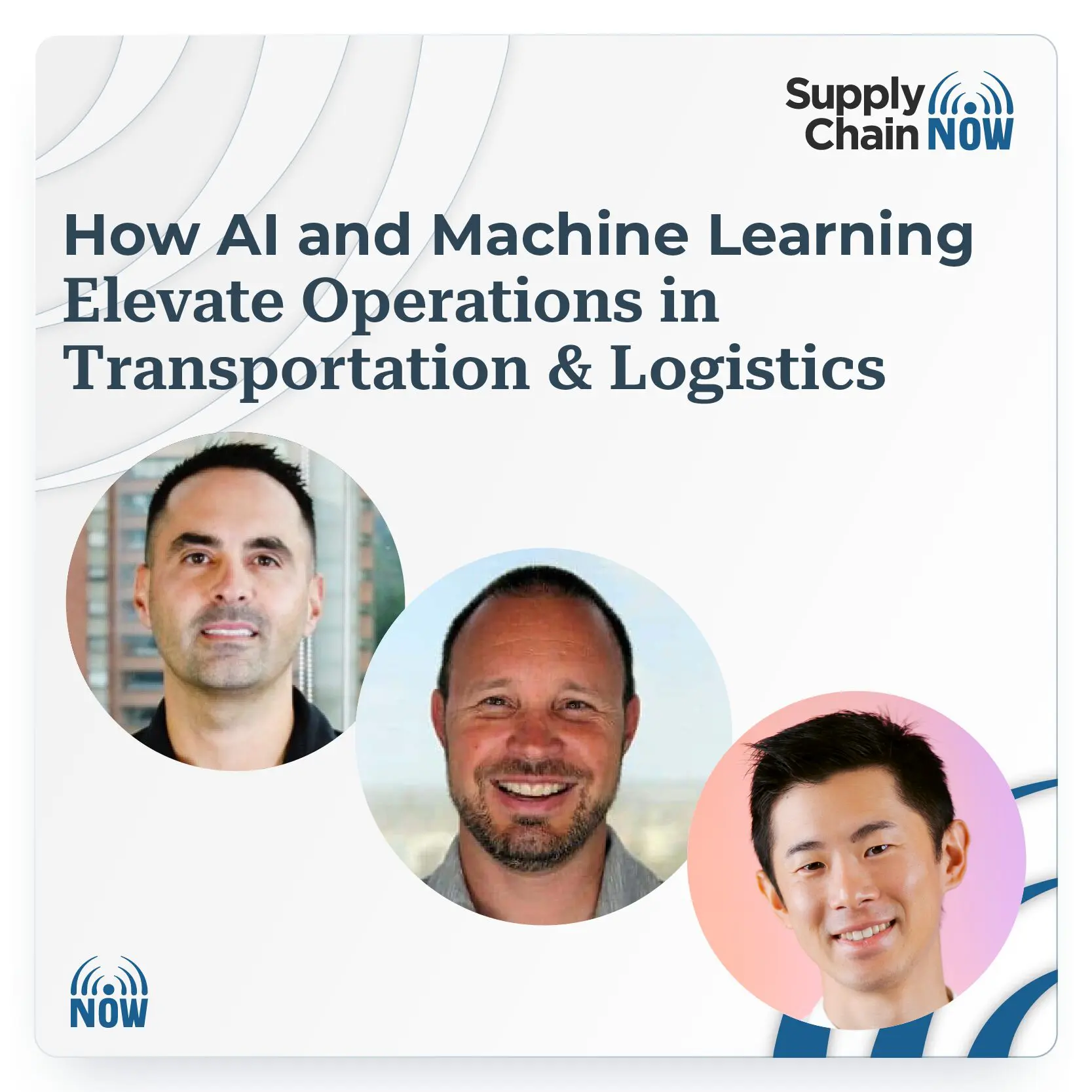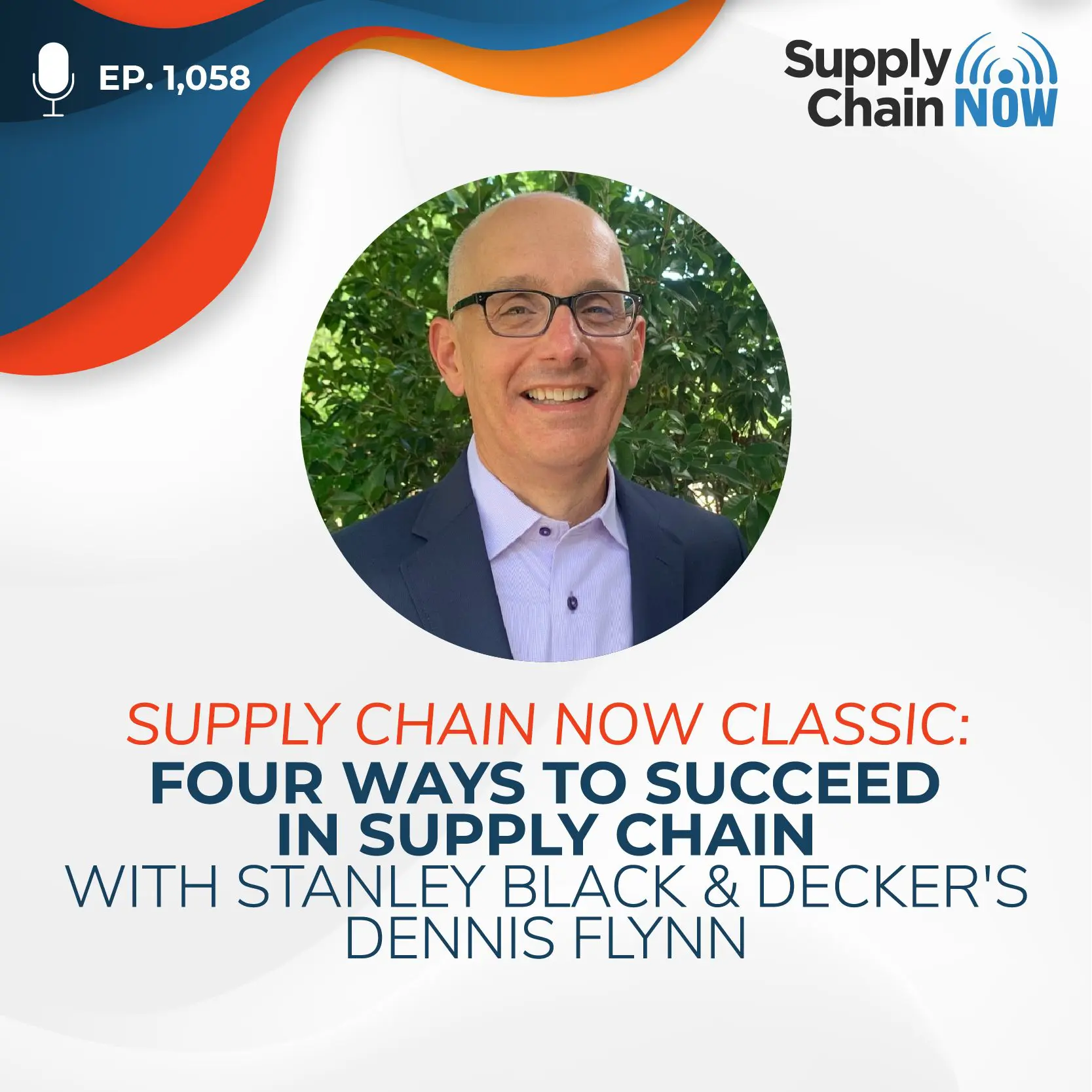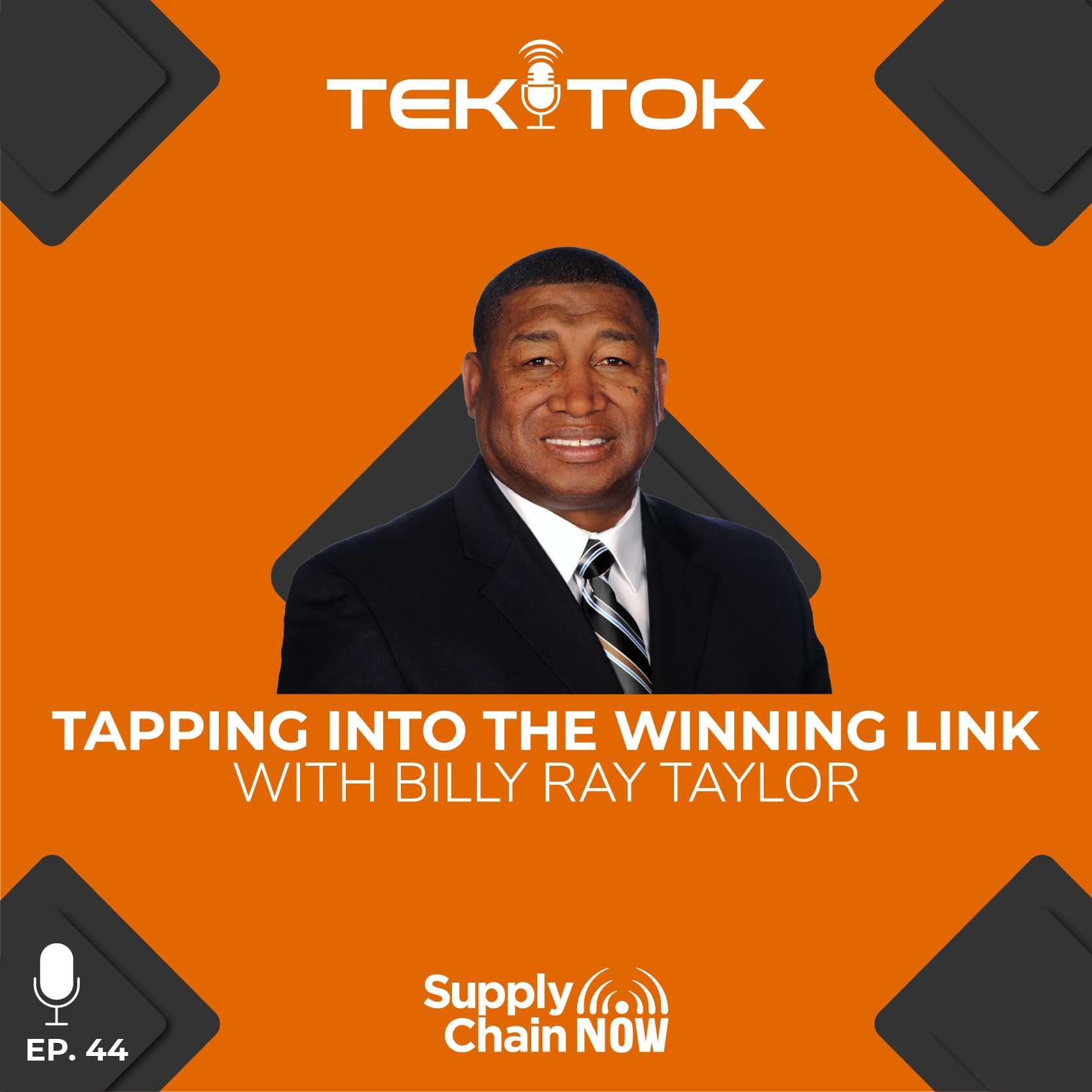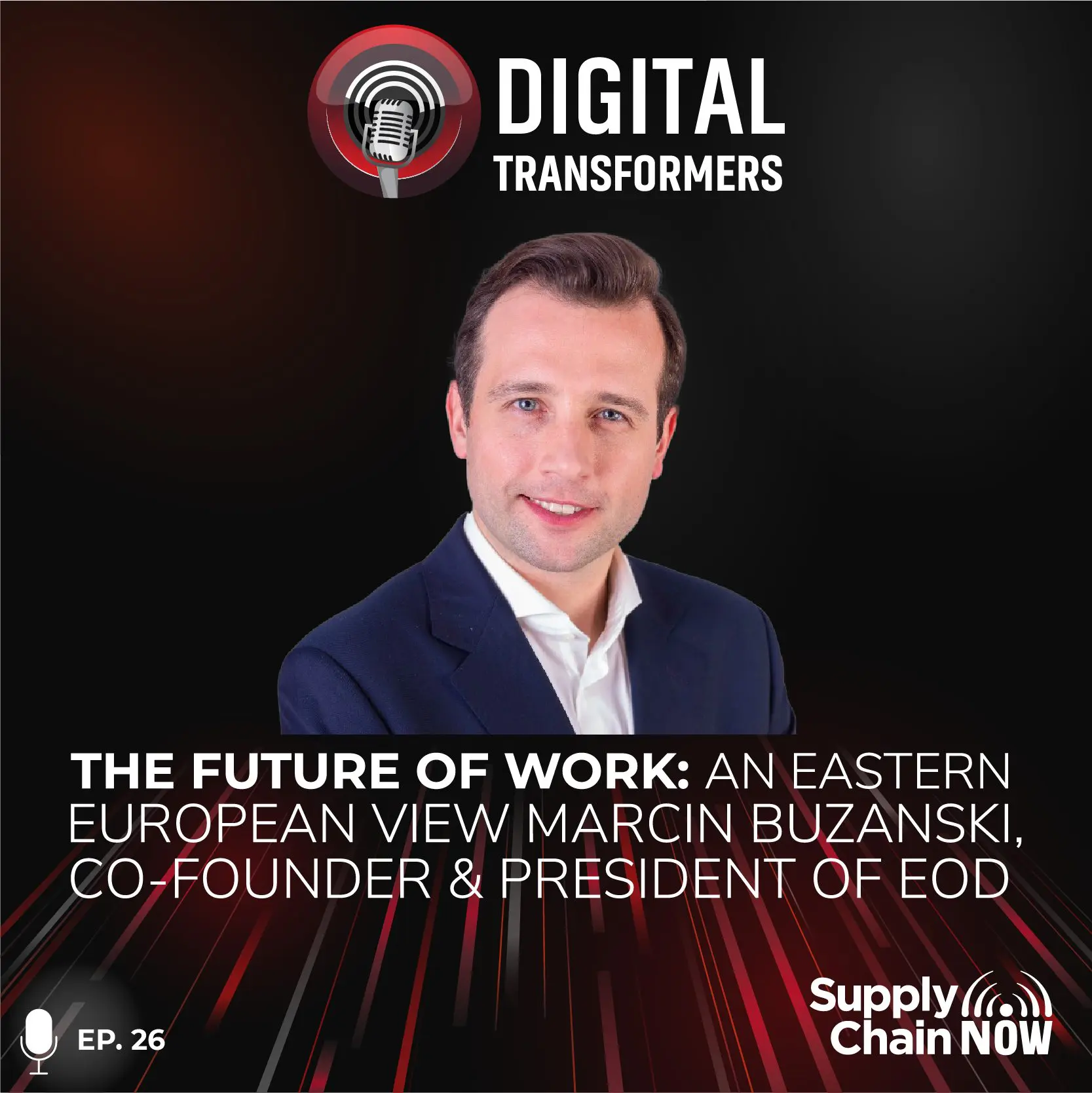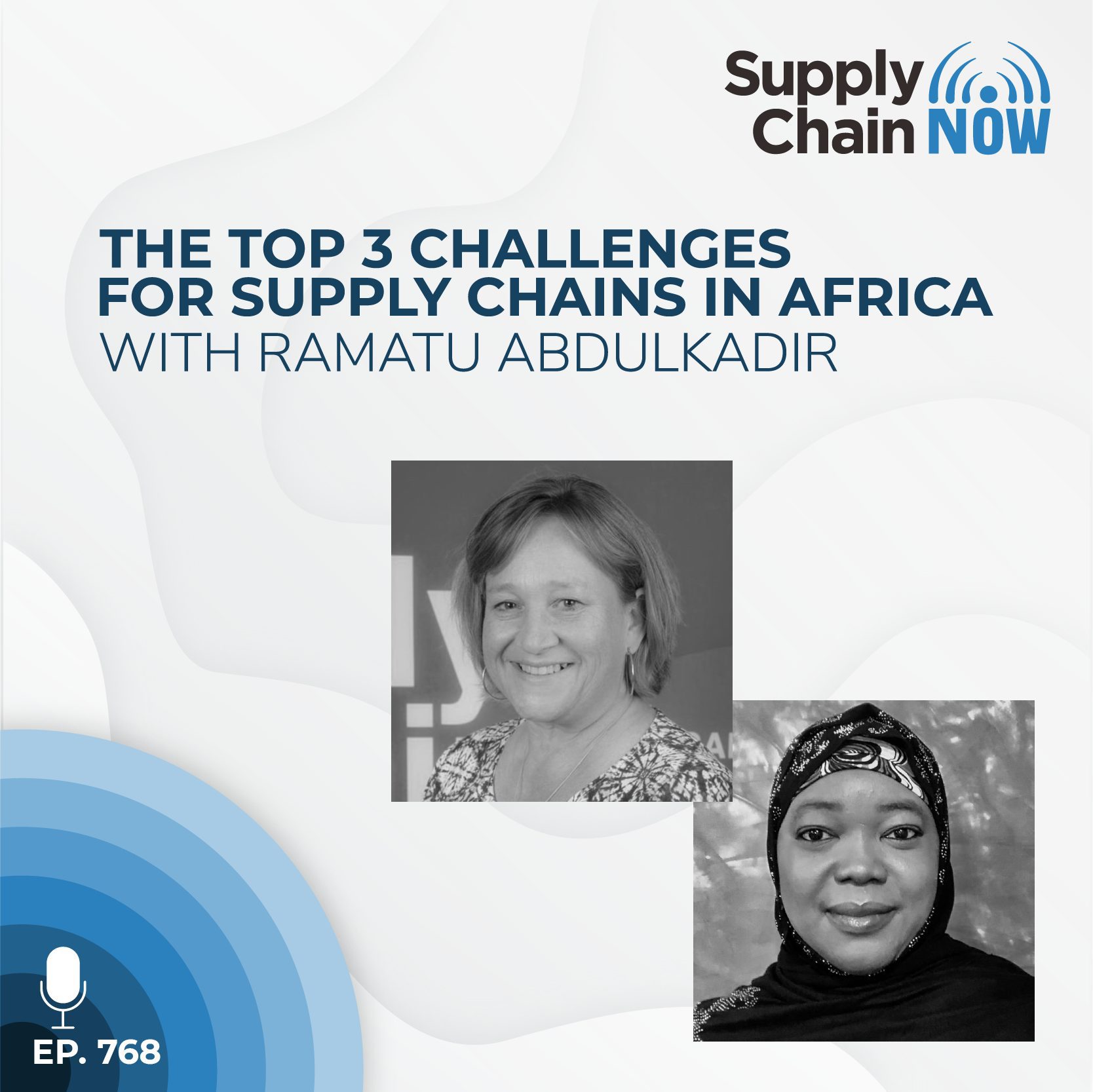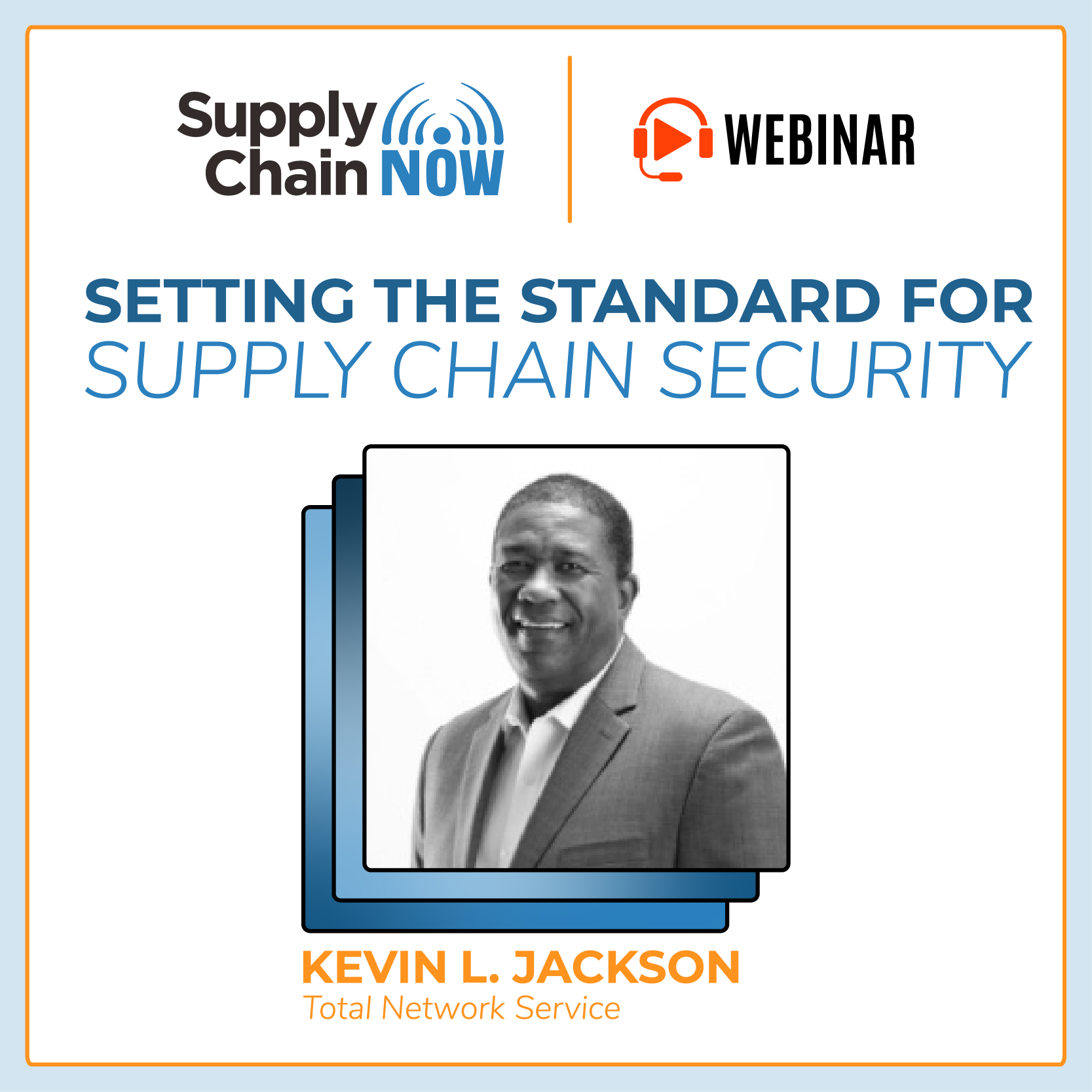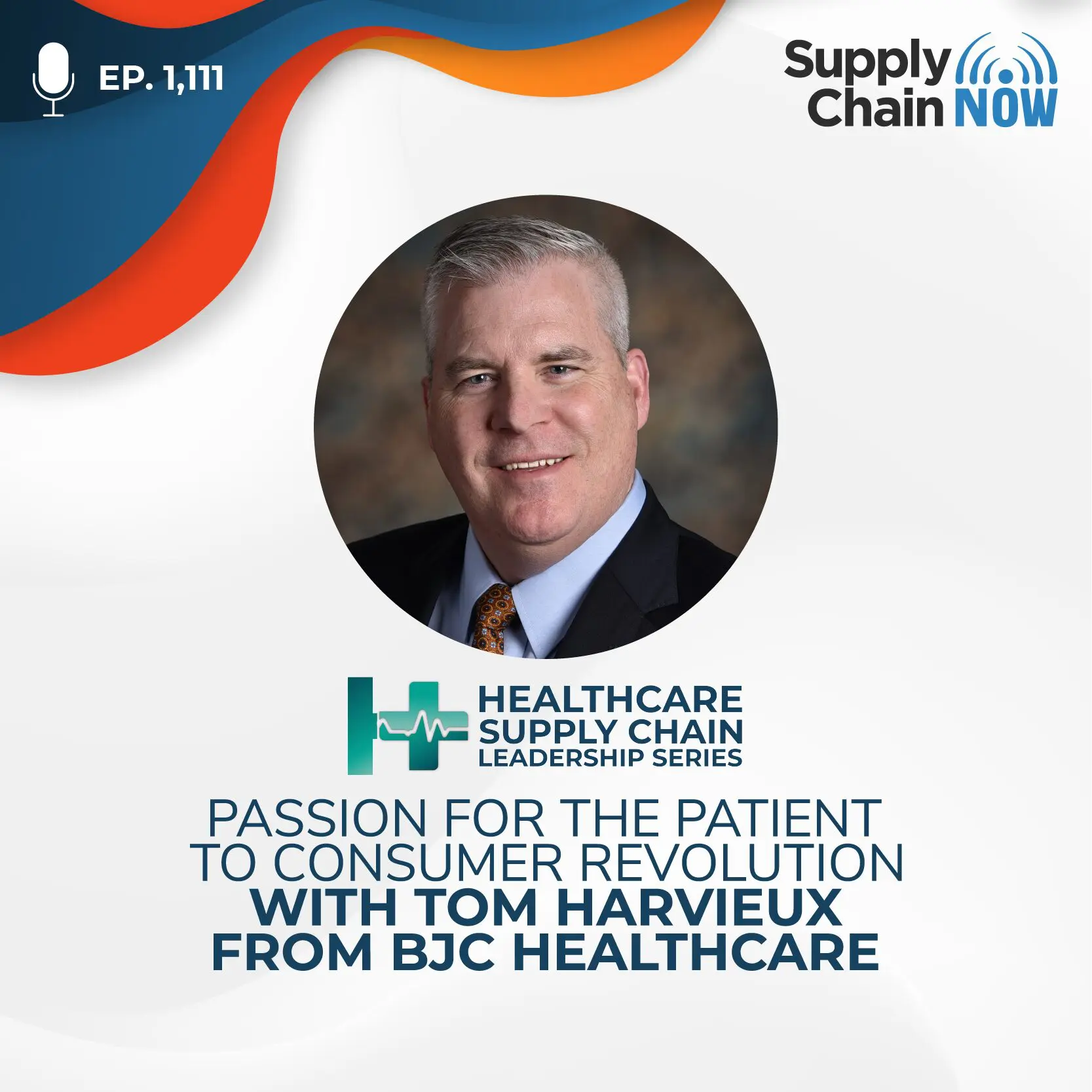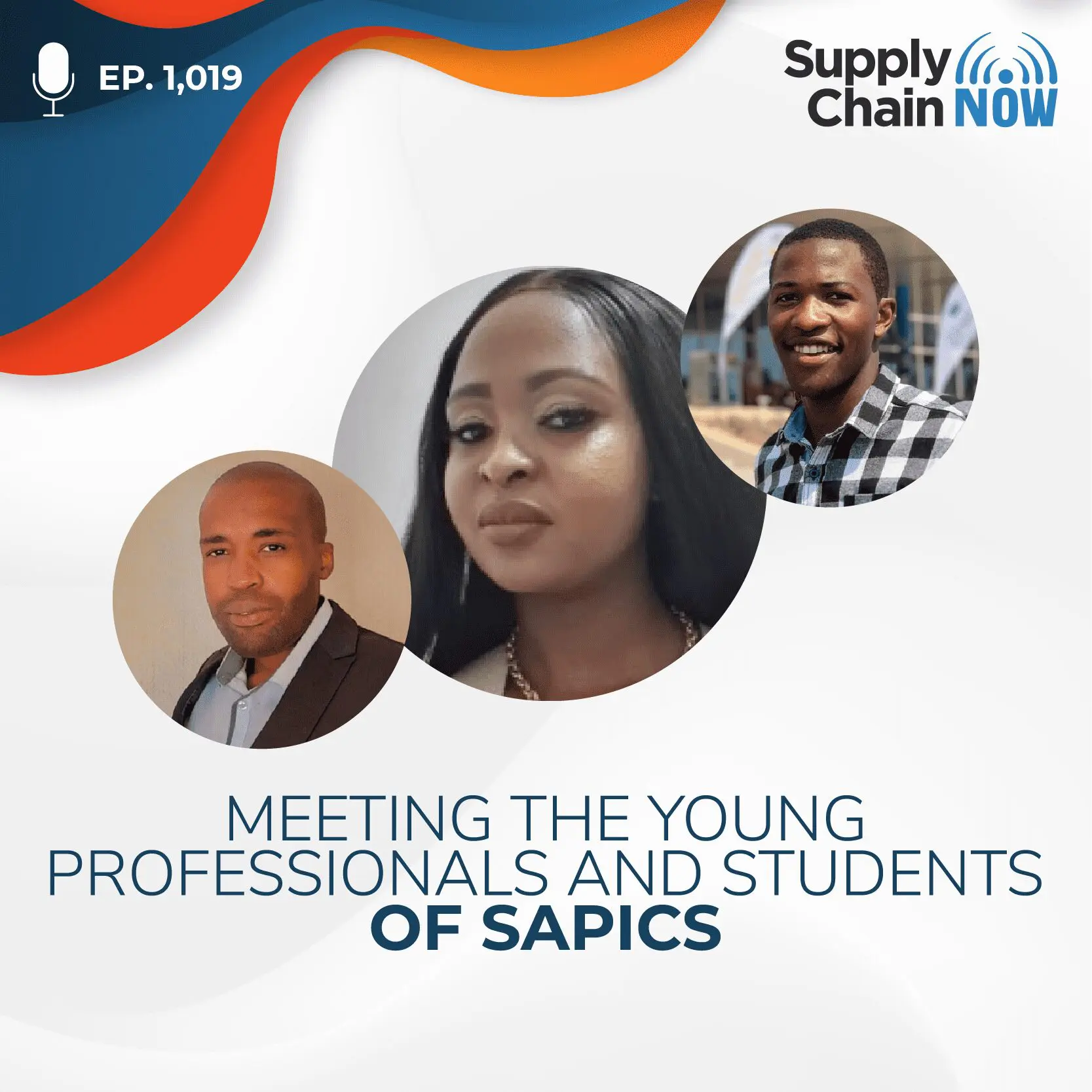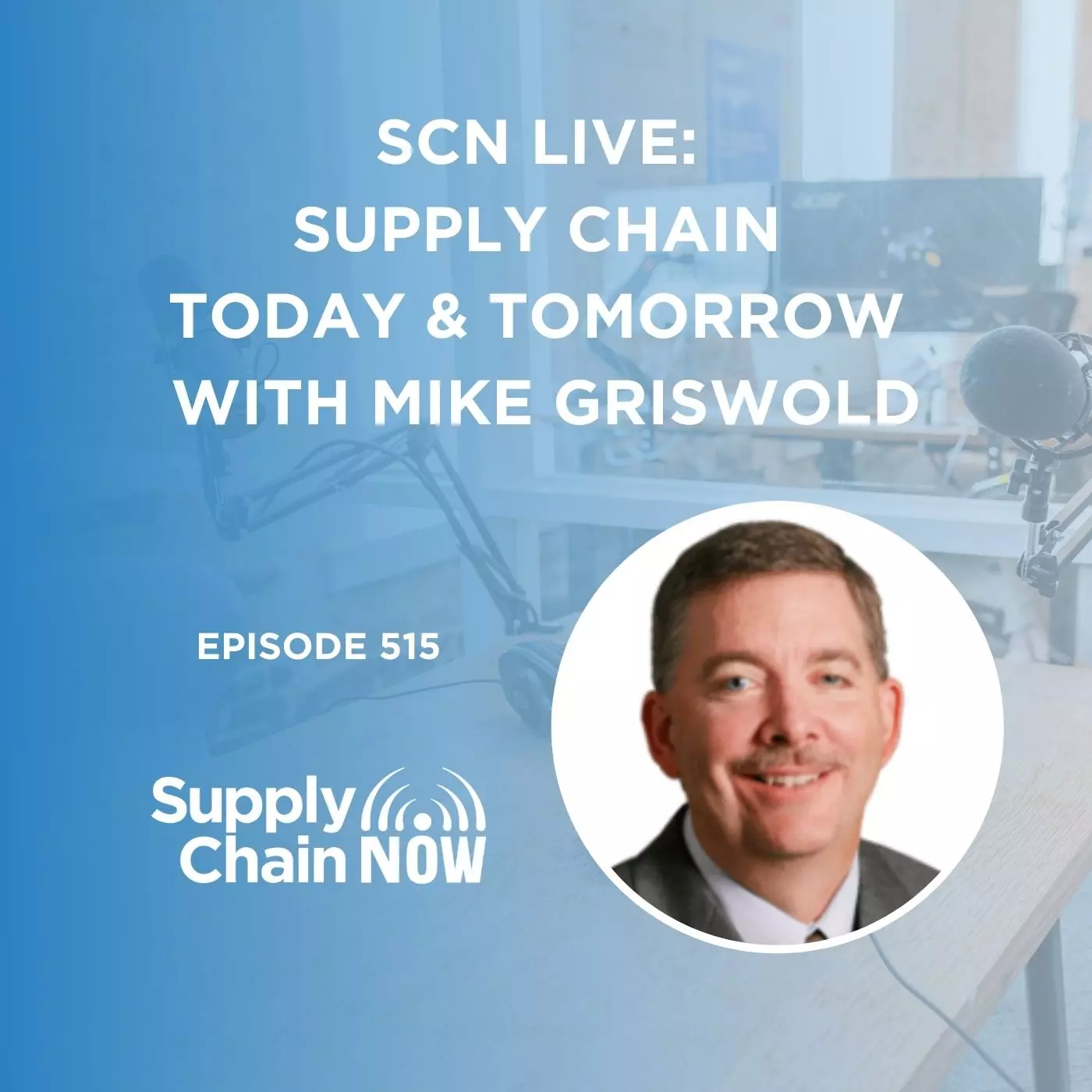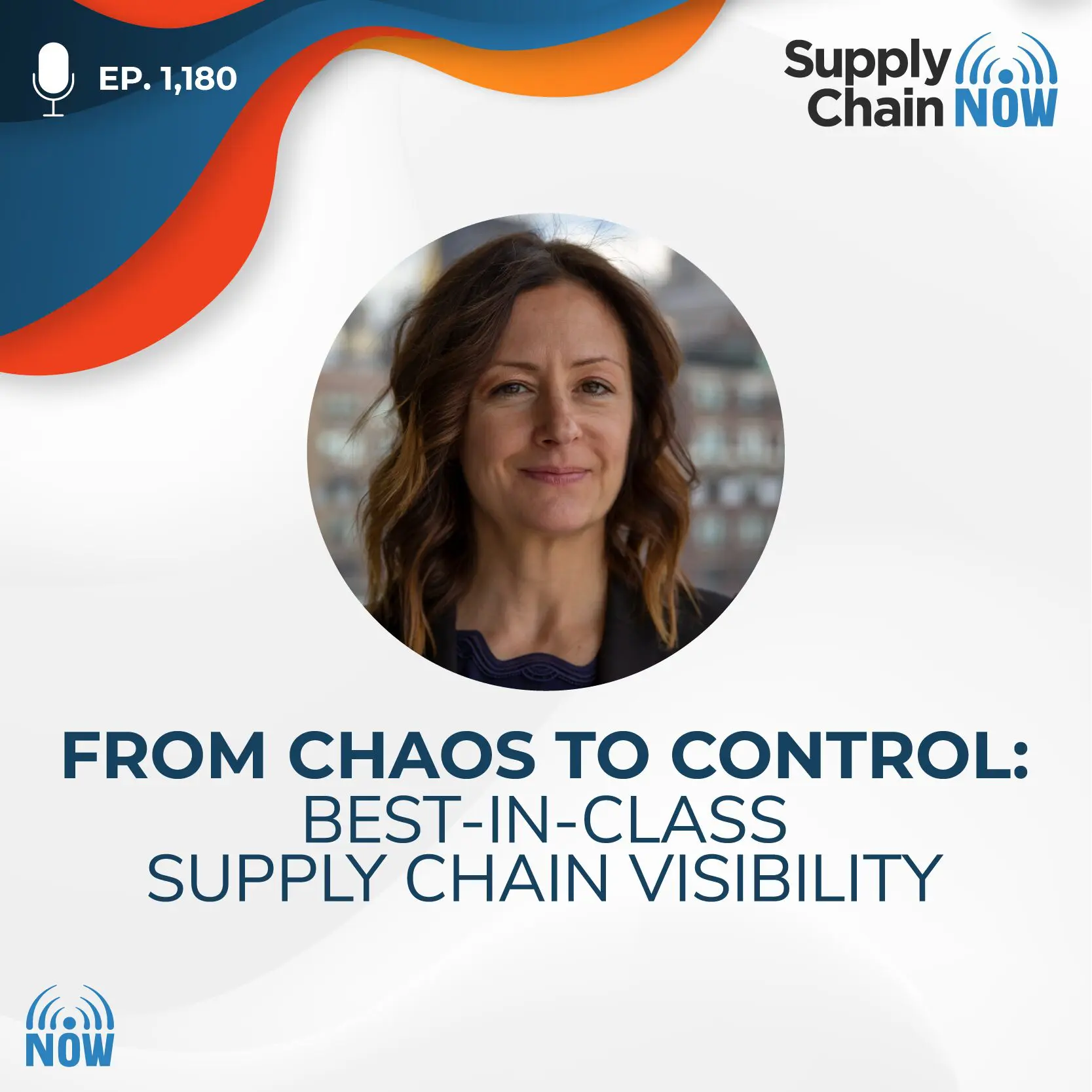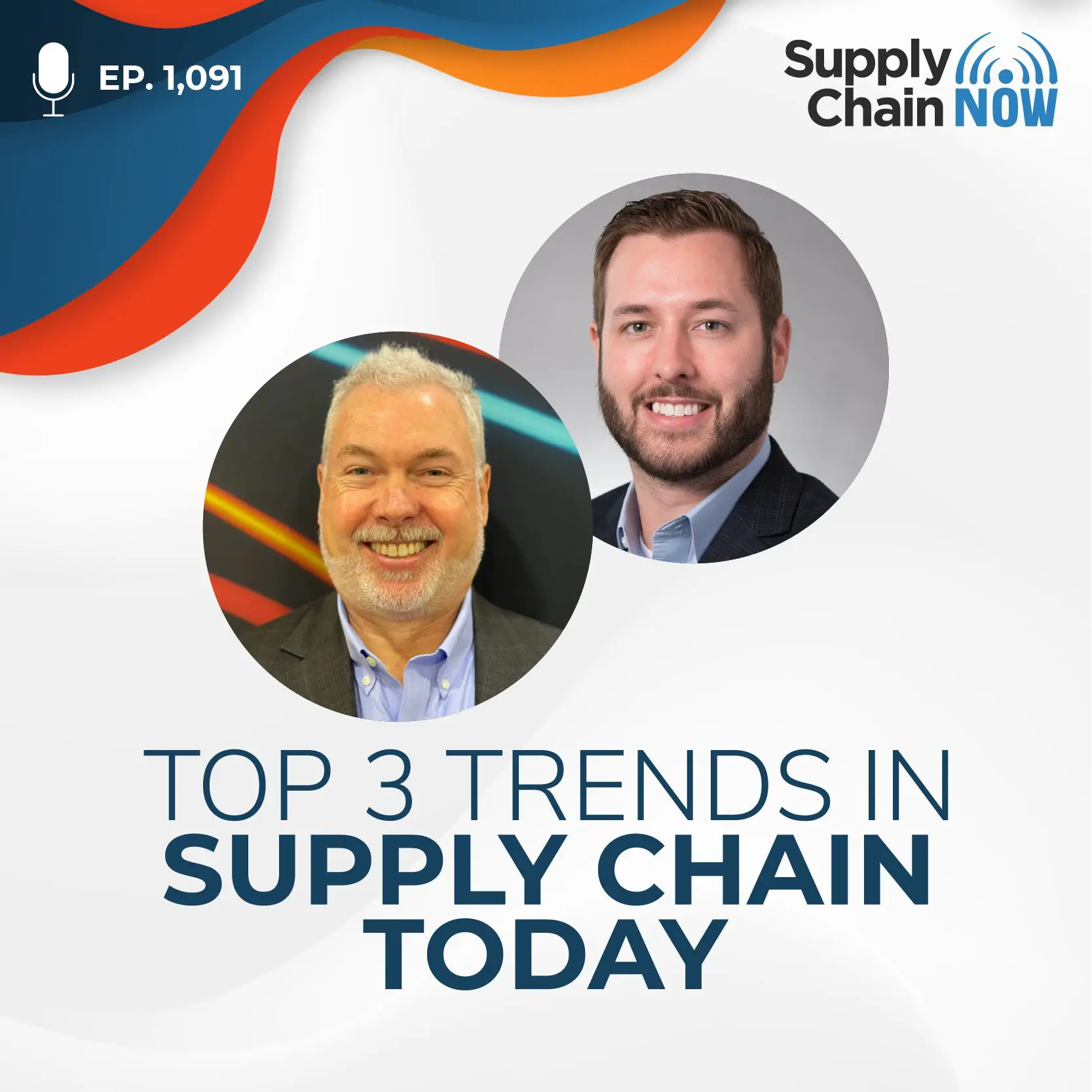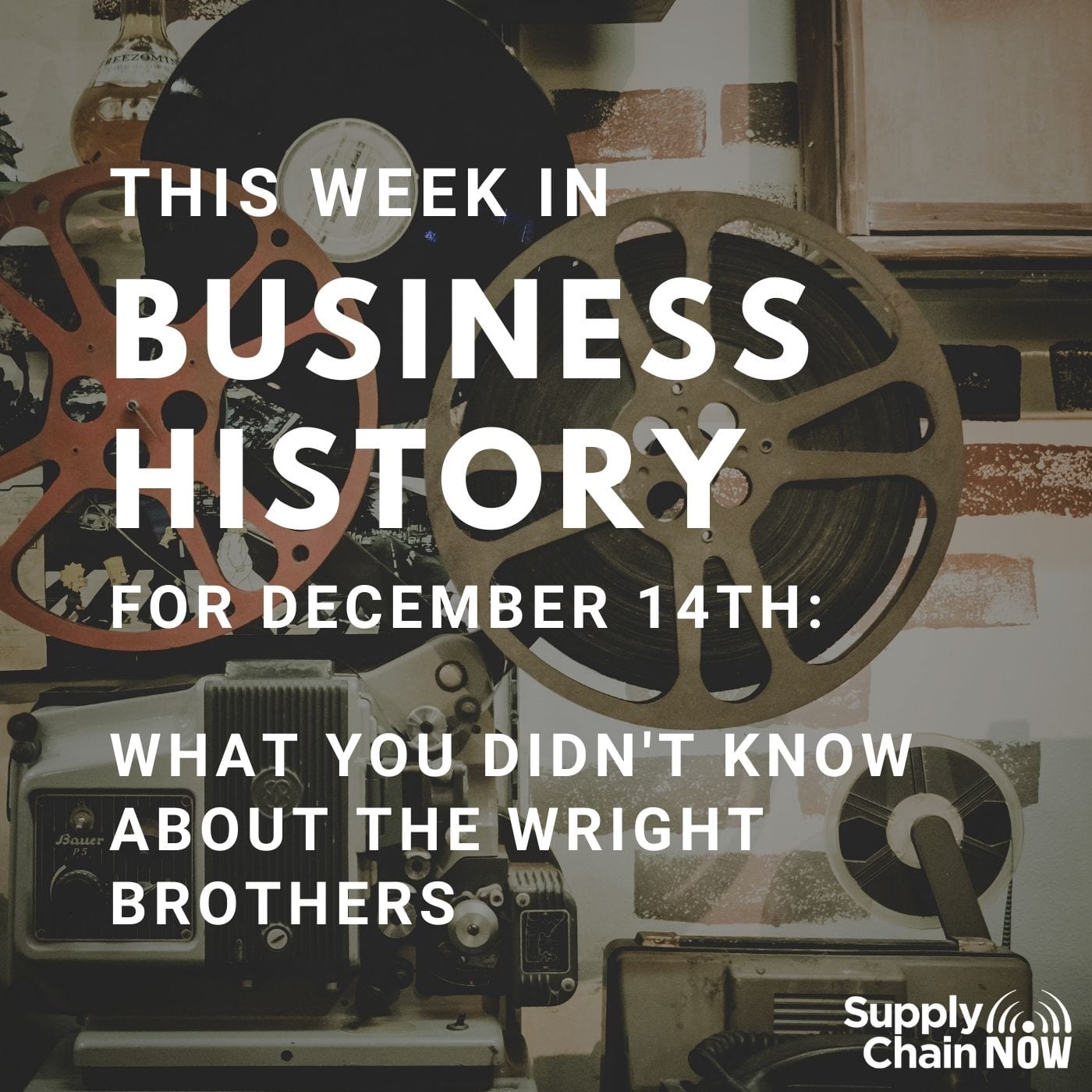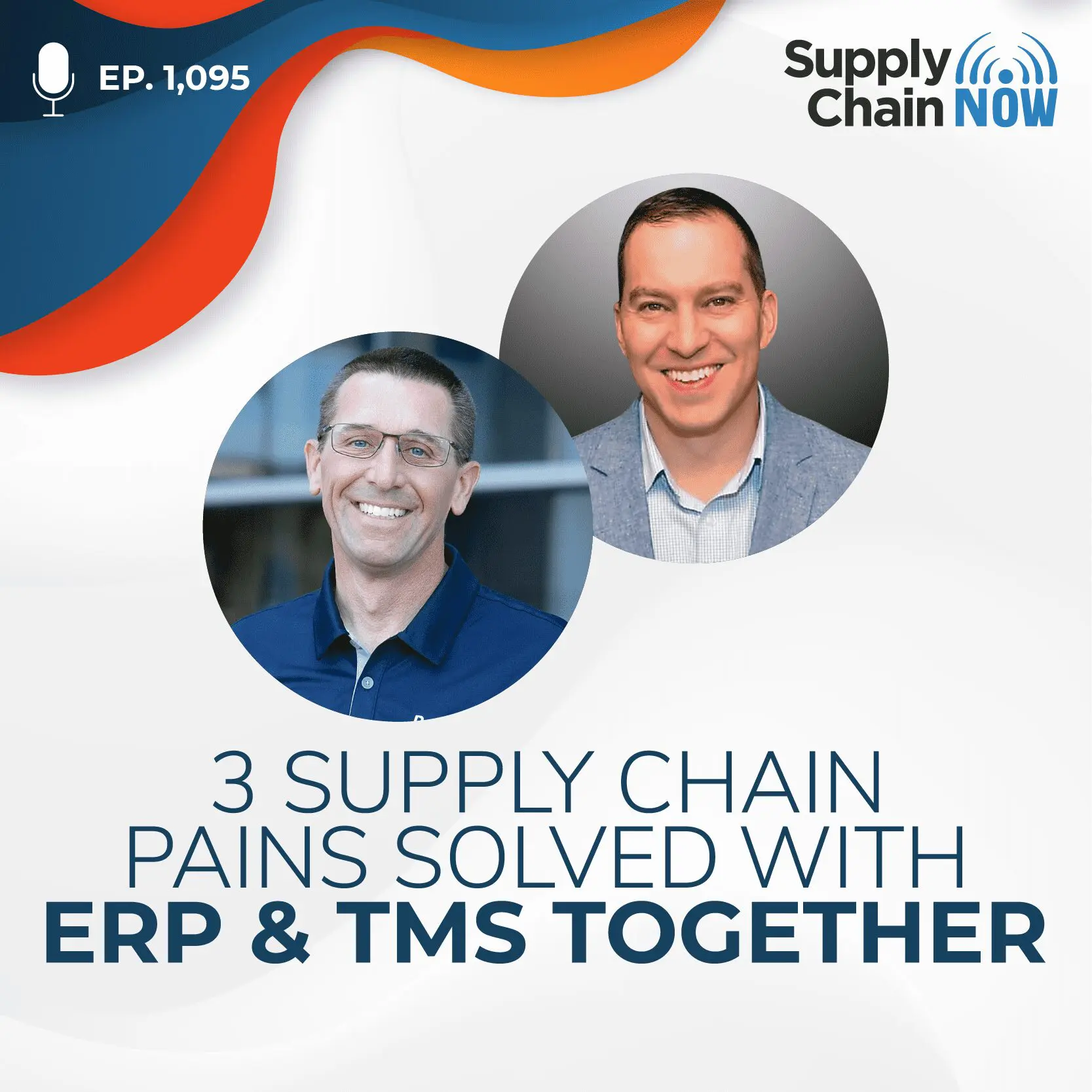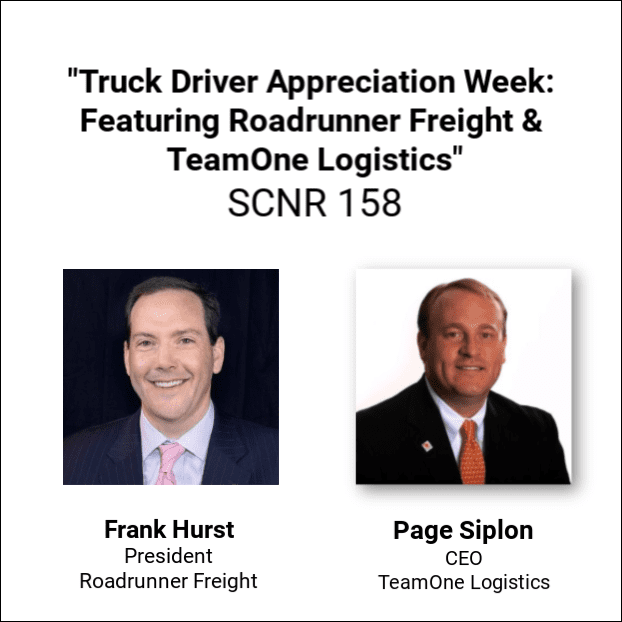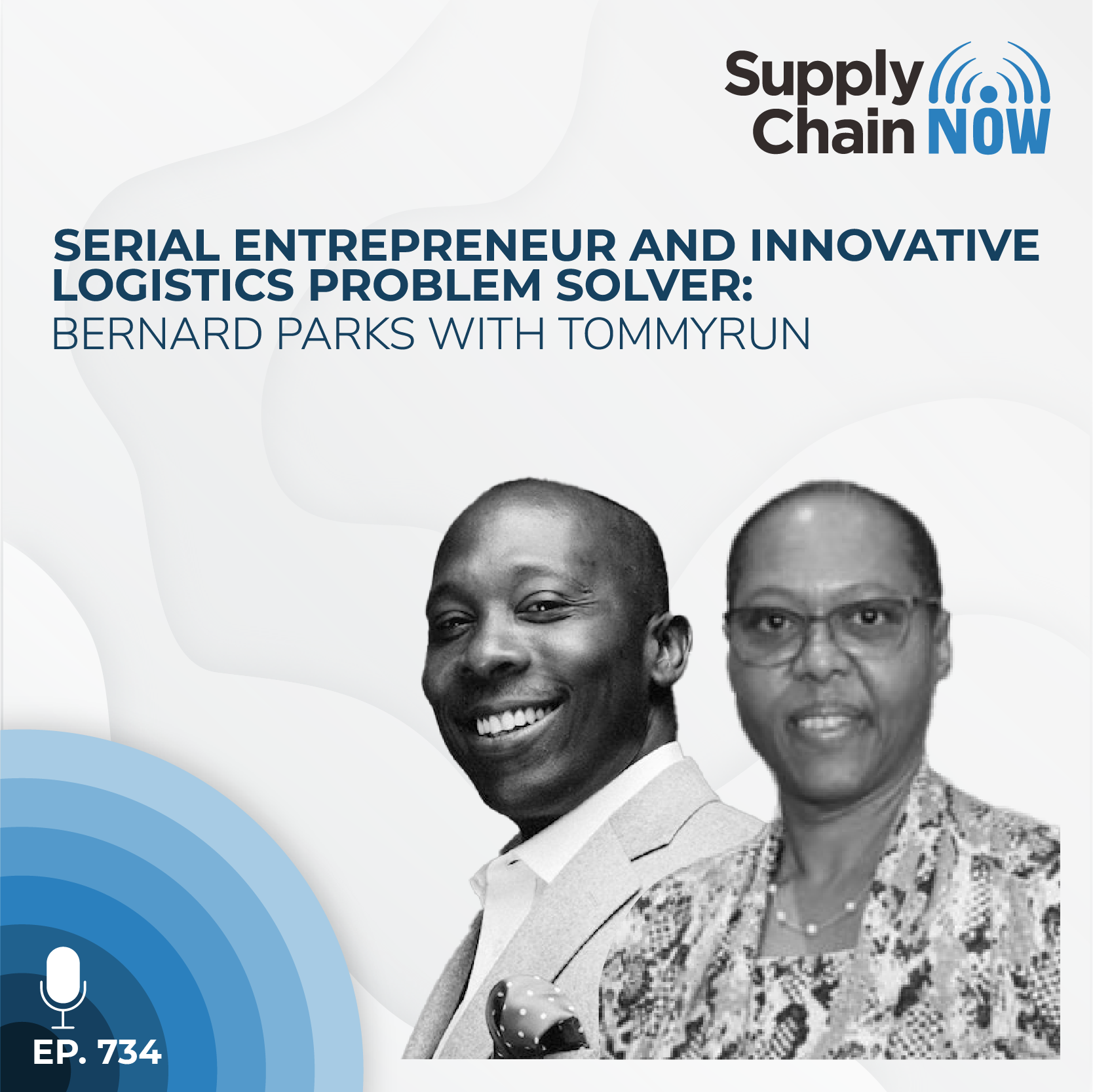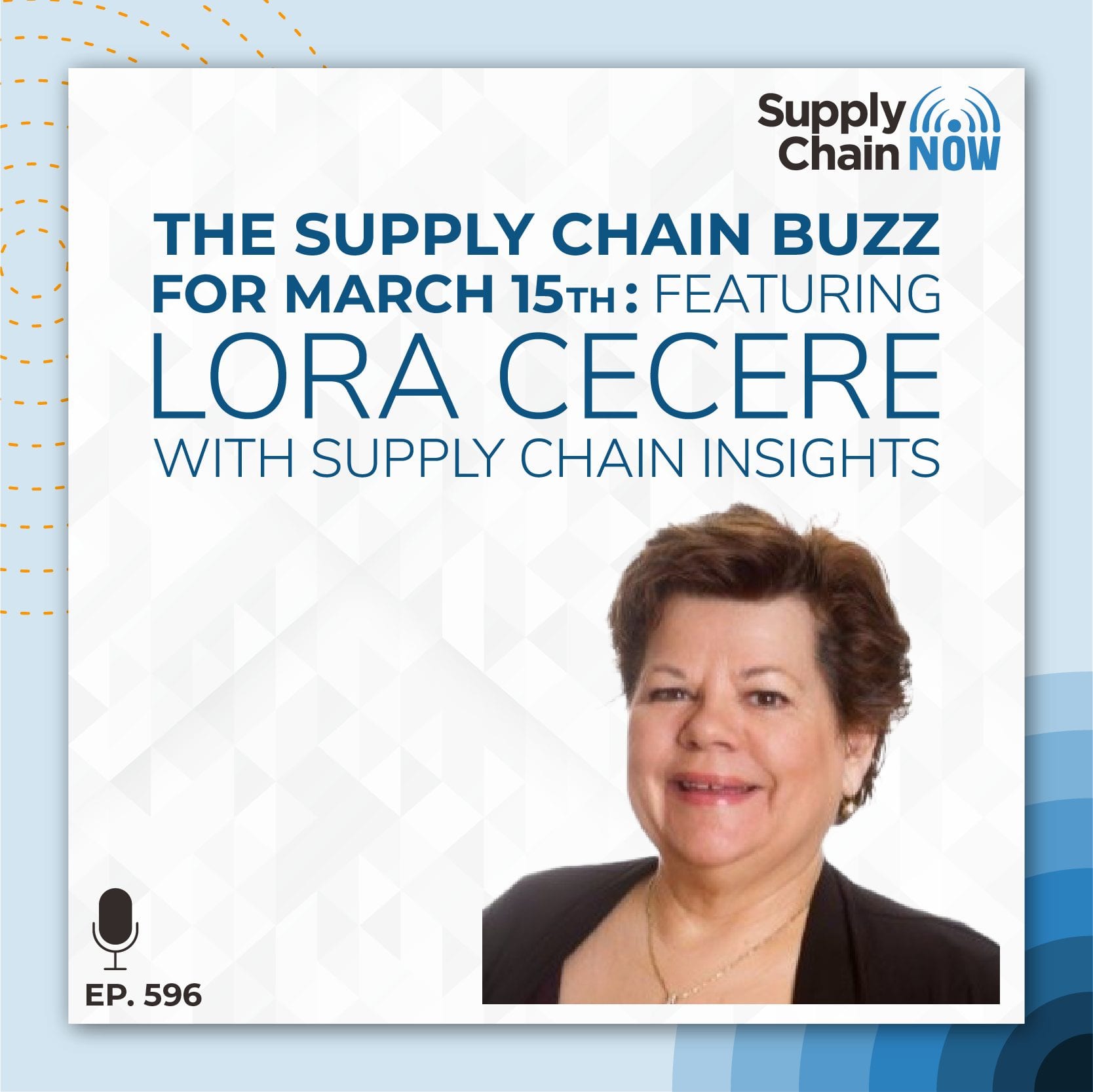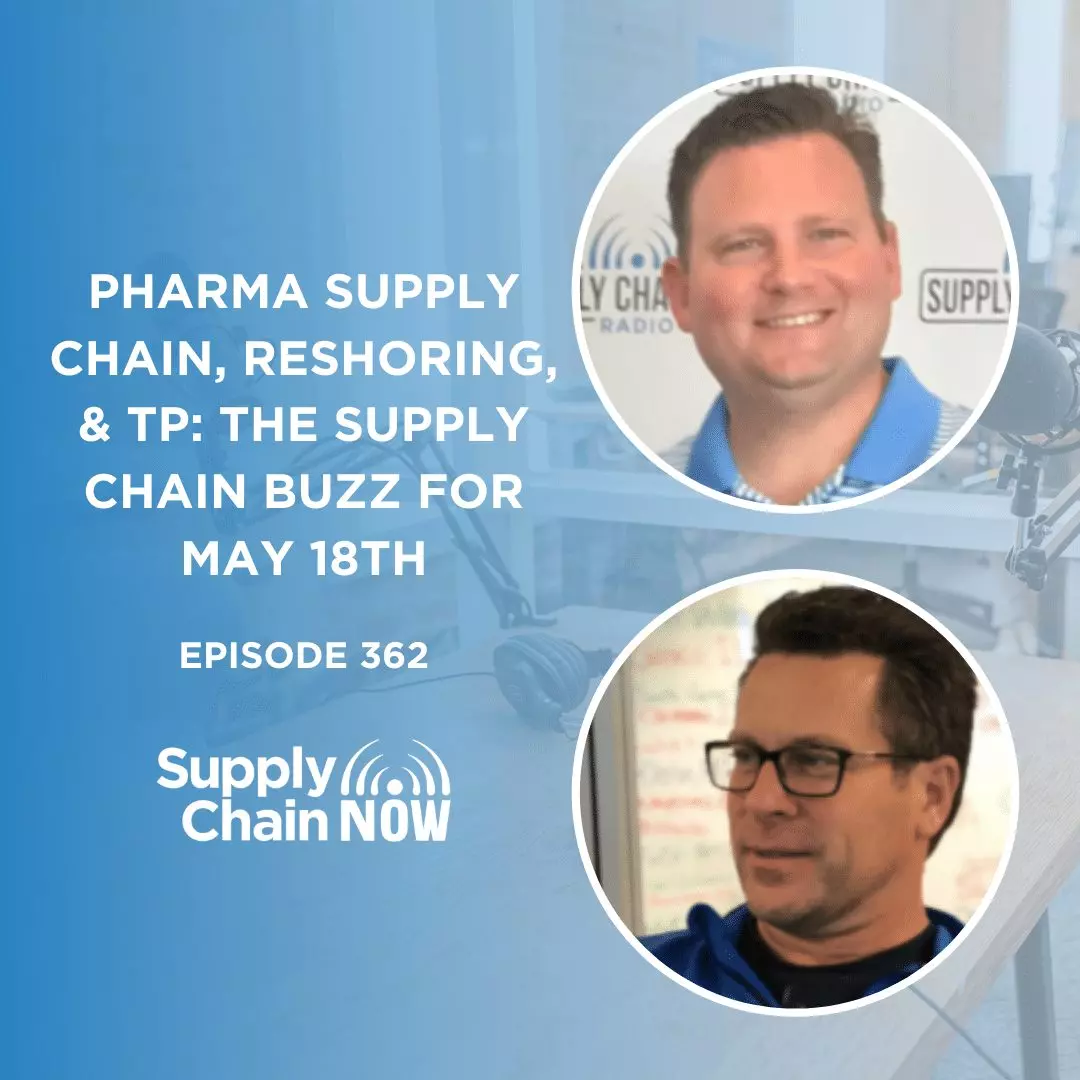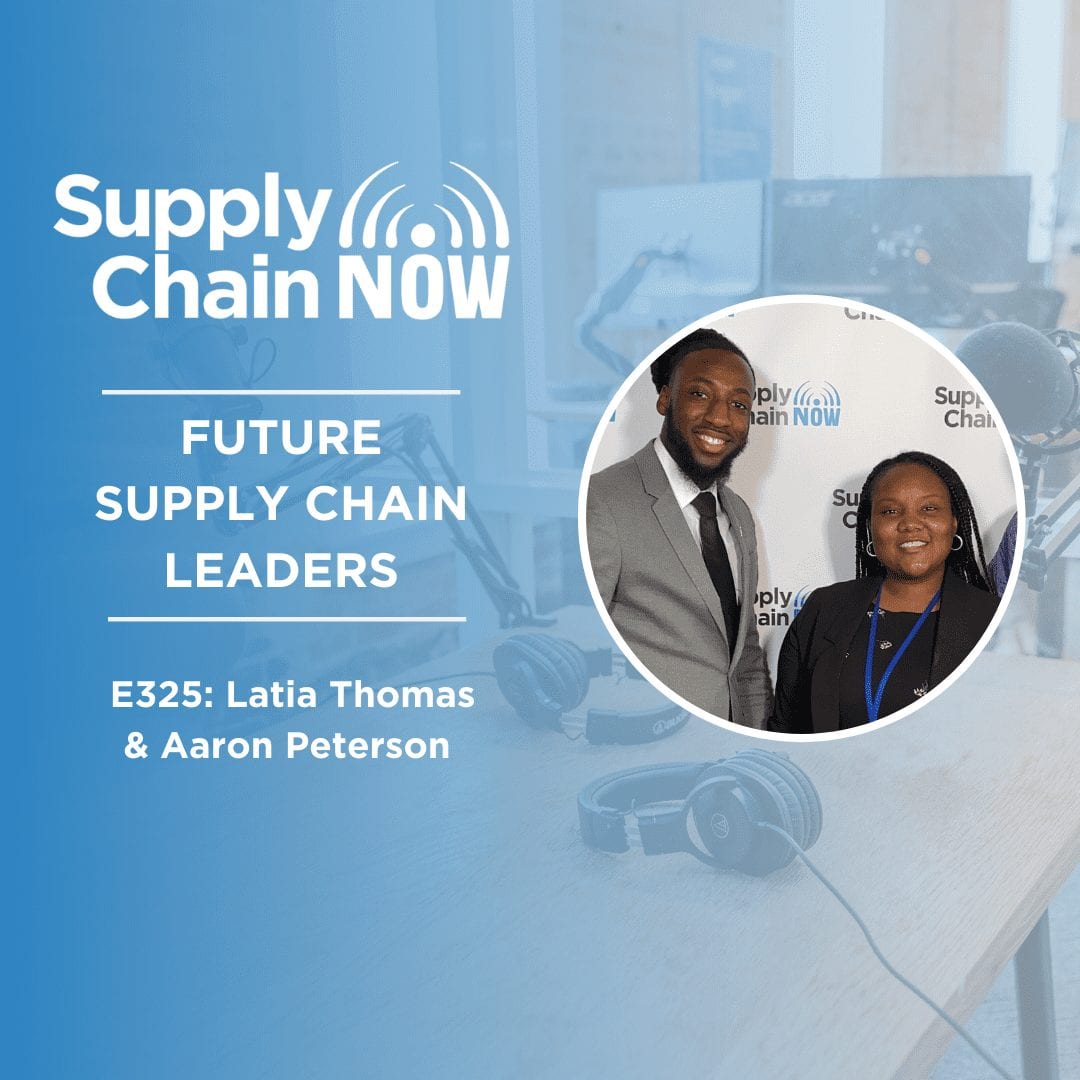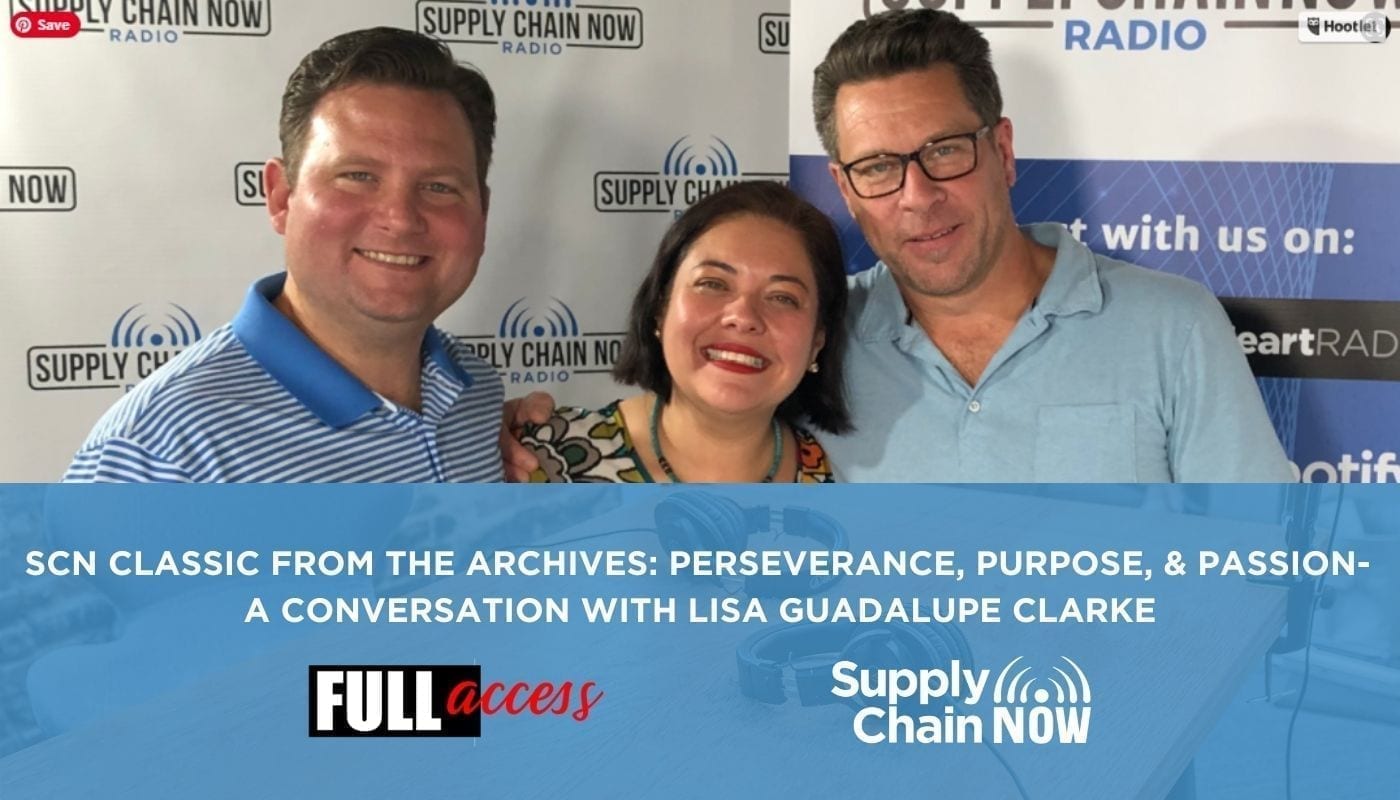
Episode Summary
In this episode of our Full Access Podcast series, Scott and Greg interview Lisa Guadalupe Clarke. They discuss her inspirational story, mentoring, the talent and skills gap, and recruiting.
Episode Transcript
[00:00:00] It’s time for Supply Chain Now Radio Broadcasting live from the supply chain capital of the country. Atlanta, Georgia Supply Chain Now Radio spotlights the best in all things supply chain the people, the technologies, the best practices and the critical issues of the day. And now here are your hosts.
[00:00:29] Good morning, Scott Luton here with you live on Supply Chain Now Radio. Welcome to the show. We’re coming to you live today from Vector Global Logistics, a company that is providing world class Logistics services all while deeply investing into the communities that they serve based right here in Atlanta. But with international reach, this company is certainly on the move. You can learn more at vector g l dot com. On today’s episode, we’re continuing our Full Access series where we’re spotlighting exceptional female leaders across industry. And today is gonna be a great, very special episode. A quick programming note. Like all of our series on Supply Chain Now Radio, you can find our replays on a wide variety of channels from Apple podcasts, SoundCloud, Spotify or wherever else you find your podcasts. As always, we’d love to have you subscribe so you don’t miss a thing. Supply Chain Now Radio has also brought to you by a variety of sponsors, including the effect of syndicate pro purchaser, dot.com, supply chain, real estate, dot.com and our friends at Verusen along with a variety of other leading organizations. So be sure to check out the show notes to learn more about our very valuable sponsors. OK, so let’s welcome in my co-host once again today Greg White serial supply chain technology entrepreneur. Hey, don’t, Greg.
[00:01:42] I’m doing great. Scott, every time you say that, it’s a little bit. I love it.
[00:01:46] It’s first rolled right off the tongue. Yeah, right. It’s just like all those businesses you’ve built and grown.
[00:01:52] All right. But we’ve got a great show in store here today. And with No Further Ado, let’s say hello to our featured guest, Lisa Clark, founder and CEO of ATF Search Group. Lisa, how you doing?
[00:02:04] Hi, how are you guys? We’re doing great. Thank you for having me. You bet.
[00:02:07] We’re glad you’re here. We’ve all had such a great time in the warm up conversation that we had to go ahead and kick things off so we didn’t lose any of the stories that you’re sharing with us here today. But as busy as you are. Thanks so much for carving some time out here at our dedicated studio, Vector Global Logistics. Before we dive into our conversation with Lisa that I think’s going to be a really interesting one. Greg, I know you’ve got some of the top things to know and Supply Chain Now Radio share with us.
[00:02:35] Yeah. Today is all about Rhys. All about Rhys. Okay. Reverse Logistics returns and recycling. So, you know, we have a show coming up in Vegas, right? With the reverse Logistics Association. So. So I’ve been kind of tracking what they’re up to. And this is something I posted on linked in earlier and a lot of people have shown some interest in. But I think it’s a great move by us, by someone who should be leading this in the industry, Amazon, to have a donation program for unsold or returned inventory. So they are facilitating the ability for people to buy these products as refurbish or used and that sort of thing. And it’s actually prompted or at least is coincidentally timed with a series of other retailers who are actually considering use selling, used and returned inventory or giving a discount for returned inventory in their stores.
[00:03:36] And some of those retailers include Neiman Marcus and Macy’s. So imagine going into a Macy’s store and there’s a potentially a couple of different partners. But thread up is one of the of the potential read up, thread up. So they they focus on on selling used goods and there’s gonna be a section in the store where you can buy. Used. Fashion goods, love. Right. Which, like cars, is the only way I buy fashion goods. Oh, so, so. So there’s a you know, there’s a good initiative there. Look, this is a big issue in the marketplace. And I think it’s it’s important. Yeah. The other encouraging news. So this is only in Japan right now. But Kit Kat, right. Is is actually producing paper packaging for their product and. And the paper is suitable for Gammy.
[00:04:35] Oh, wonderfully. I am waiting for that to come to America. I am. I am really good. No, actually, Jeremy. Yeah. No, I’m actually terrible. But I’d love to try it. And. Yes. And if you can combine it with chocolate, I haven’t know how to do it. Oh, really? With you. With me, with Kit Kat wrappers. Well, that I don’t know.
[00:04:54] Right. That would be. I know that’s a whole nother ball. Yeah.
[00:04:57] Yeah. So. So there’s a lot of a lot of a lot of thought around recycling and reversing product and and that sort of thing. And we’ve talked with Tony, she wrote it at the Reverse Logistics Association in the last couple of weeks and we’re going to have another few shows with them and then be at their conference. But I think it’s really good that people are getting aware of recycling and figuring out how to do it in an economical way that encourages people to participate. I think if we can figure that out, if we can encourage people to participate by making it economically viable for people, then it happens. Yeah, I know it can happen.
[00:05:38] Scott, to this guy does selling plastics and coordinated and and just the. And I think that the mindset set shift has been taking place while we have we’ve got to move to move the needle so much further. Right. When it comes to really taken hold of this recycling opportunity, we have, I think at least in this country, at least in our community, we’ve come a long way in the last five, 10 years.
[00:06:01] We’ve got a long way to go. I feel like we made a lot of progress in the 70s when I was a kid. And I feel like we have kind of lost keeping it in the forefront of people’s minds. And and now I feel like it’s it’s starting to come back. My kids call me an accidental environmentalist, because since they’ve been born, I’ve said shut off the lights. When you leave the room, don’t leave the water running. When you write, when you when you’re brushing your teeth and all of those sorts of things that irritate them.
[00:06:31] But now they get it right. They get it. So it’s so interesting. And I think I also saw something in one of our social media feeds about a broader know you’re talking Matt, Kit Kat or Gammy. It seemed like there was something deal in the core gated could be an Amazon is one of the big e-commerce players, was coming out with arts and crafts play on corrugated iron walls.
[00:06:55] I mean, there are actual furniture companies that make that make furniture out of corrugated boxes. Love that. So wish I could recall that a lot.
[00:07:05] Well, we’ll get Malcolm. Yeah, that’s right. That’s right.
[00:07:08] A lot of cool stuff. That’s just a couple of the top things. No one supply chain now but a love. And if folks will learn more and want to connect with the reverse Logistics Association, one of our newest partnerships that can find that they can play with that group at our L. A dot org. We’re really excited about our reverse Logistics themed podcast series that we started. Our first episode was published earlier this week. And that’s my monthly series that culminates with us in February. Out in Vegas at the RLA conference next. So appreciate you bringing this up.
[00:07:37] Just real quick, if you’re if you really are interested in returns and recycling and reverse Logistics to people that you need to to follow. Tom Enright with Gartner, who is a big advocate for that and has been for years. I really noticed back in 2014 that he was really prominent on the stage here. And of course, Tony Schroder from the Reverse Logistics Association.
[00:07:59] Absolutely. Okay. So we’re going to bring Lisa Clark back into the conversation. Lisa, once again, great to have you on the show today. We’ve been meaning to make this happen for quite some time, but gosh, with your schedule, I had to go through your agent and plan six months in advance.
[00:08:15] Great to have you here. Thank you for having me. You bet.
[00:08:18] Now, you’ve got a very interesting background kind of leading up to your current role where you’re. You founded and serves CEO of the ATF search group. So tell us about your background leading up to where you are now.
[00:08:30] So interesting enough, my story as a Latina is that later reverse my mom came here as an immigrant and everyone else got to put us there for her because I was born here and she went back to Salvador and I grew up doing war. And when I was 15, she said, there’s no reason for you to be here at that time. You need I got recruited by the guerrillas, other government to serve. So we came back to the U.S.. My mom actually in her culture up to that point, the youngest daughter had to take care of the parents when they got to go. So my grandma fell, broke her hip and she decided to go back. So I wasn’t quite 16 yet. And I had I grew up real quick because I had to make a decision whether to go back to El Salvador to an unknown future or stay in the U.S., which is like everyone’s dream. Right. As an immigrant. But by yourself. But by myself. Wow. So I chose to stay and I put myself through high school and college. But this would not have happened if it wasn’t for my high school teacher, Mr. Lombardi, who was also their football coach. I my English was very limited, so I had to sit in front of him to understand everything.
[00:09:52] And he asked me what I was going to school and I had no clue. He asked me if I knew how to fill out an application for college, and I told him now. So he requested one. And then he was like, Well, what do you want to do? And I was like, I don’t know. He goes, I think you’ll be good for business. I’m just gonna put you for a bit.
[00:10:08] And I think I should trust that I’m already talking about taking leaps of faith.
[00:10:16] So I did. Dad and I went to school for business, had a quite a couple of times because I needed extra money. So I was working two jobs at a time because I had to support myself and also send money to my family because my mom wasn’t working at the time. But I always said I am going to finish college no matter what. So I was lucky enough that I still came down like a good salesperson, right? Woodstock people for a living. And I found him this summer. And at first he was a little hesitant because he did not have a linking page. But at Facebook and when I you know, you see so many where people kind of track it down sometimes.
[00:10:54] He was a leader, has a tank, as it’s been.
[00:10:56] I was 20 years. Right.
[00:10:57] And he said students said, although you sure you’re a special one. He probably remembered Jimmy. You never know who’s tracking you down.
[00:11:05] Exactly. So twenty or so years. And I said, I’m not trying to pick up a hot Italian retiree. You are married with kids that I say. I promise you, I and I sent him a bunch of pictures and we connected on Long Island, went and we went to visit with my family and my husband.
[00:11:22] It turns out he was when he saw me, he recognized me right away. So it was very emotional because, you know, people don’t give teachers that credit they deserve. They have so much more than just teaching a student. Right. So he actually changed my life. And not only that, but funny enough, he happened. My husband is from Long Island. So he was his teacher. He remember my husband. Really? And another friend of ours that we stay with. She he was also her teacher and she’s from Thailand. So we got an opportunity to hang out and catch up and talk. And even though he’s retire, he’s still fighting for rights for teachers. He’s still very involved in his community. And he I just couldn’t believe it. You know?
[00:12:04] Well, especially as I hear it heard you talking about the impact that Mr. Lombardi had on your life. Yeah. It makes me think of the all the credit the teachers don’t get. They don’t get enough credit. Right. There’s some of these teachers that change lives. And sometimes, you know, we you know, life goes on and we forget names. But I mean, there are all these folks that played such a huge mentor impact, inspiration, role models in our lives. I mean, it’s such a critical role. We get we got to take care of our teachers always.
[00:12:34] So shout out to all the teachers out there.
[00:12:35] Yeah, I mean, a man. And, you know, it can be just a moment in time. I mean, that was obviously a lot of extra effort on his part to really mentor you. He had to have seen some sort of gift in you to know that it was business instead of art. Yeah, right. Or something like that, though. And based on your outfit, I’m guessing you have some more to love.
[00:12:58] I like color. Oh boy. But but yeah, it is it.
[00:13:04] Those moments in time are really important.
[00:13:06] I’m sure everyone listening to this is thinking of something that literature made a life changing thing in your life.
[00:13:15] You should reach out and at least say that my car would thank you because they don’t know what they do every day. That would change someone’s life.
[00:13:22] You never know that you’re both. You are so true. And Greg, that was an interesting comment because that’s exactly where my mind was going back to elementary and the middle and high school. Now, a teacher or you had Miss Bo in the middle school.
[00:13:38] You had Miss Marks in elementary school. You had Miss Woods and Miss Beckham. And a lot of folks. I mean, and you. So one of the things I don’t think of a piece of advice, I think, is some of those early teachers that believed in you and how that instills confidence free to do different things. And so some of his early. Teachers that that valued your perspective or your thoughts or your output or your homework or whatever it was that stays with you, you know. And Mr. Lombardi clearly saw some special new and also gave you some great advice which has fueled your career.
[00:14:17] Yeah. And he knew that I was leaving on my own. So I think he. He probably said, well, what is this kid going to do?
[00:14:23] Not if, you know, he or she is right. Except I don’t know if this is too personal. I have to know. Where did you live? I mean. Well, I ended up renting a room.
[00:14:34] I might. One of my closest friends, parents at six. So. Yeah. So that’s why I always worked, because I had to pay rent when I got my license. I had to pay insurance and a car. And I remember before I have a vehicle, I never forget. You know, New York, we have a lot of snow storms. And the walk from the high school to where you could take the public bus was really long. And I remember sometimes it was so cold and I was like, I wish someone, other kids that I knew from school, they had a car would pass by and pick me up because I used to be like, oh, wow, I can totally relate to that.
[00:15:10] Yes. He was really cool.
[00:15:12] But, you know, I think some other life experience will grow you. And when you’re going through things, you don’t understand them. But actually, I think it’s building character. I don’t think if I had gone through what I went through as a child, I would had brought me to where I am today. And that’s why I’m so passionate about helping anyone. I’m a connector by nature. I love to get involved in non-profits because I wish I had the opportunities that I know now they’re available for a lot of people. So I had a kind of hit my head and learn as I went. And he’s been my dad pretty much my whole life. Whom? My company.
[00:15:53] Now, you know, it’s amazing what you can do when you have to. Yes. Isn’t it odd that you think about it? You’re a great example of. You were kind of thrown to the wolves.
[00:16:02] I mean, I’ve lived on Long Island. That’s it for our young girls are 16 and thinking life is tough because they have to clean up their room at home. Yeah, right. What a story. Yeah.
[00:16:14] I said you said a very high bar. And so for all of our listeners, we’re going to be diving into the topic of talent, which is incredibly important, supply chain and of course, diversity. But Lisa’s got such an interesting background. We want to give that extra attention this morning. So let’s talk about ACL search group, the company you founded, and they lead as CEO. Now, what do you all do? Where do you focus?
[00:16:36] So we focus on diversity and inclusion from a professional person to a pick a packer. So I’m able to place not only people on projects, but time to hire and direct hire. And what I like to do is when people tell me, especially my clients, that I want to diversify my workforce. What does that mean to you?
[00:16:59] And usually someone in H.R. would reach out because they’re the ones who handle the staffing contracts. But I like to meet with the managers, because one of the things that I learn is that if the manager who is going to bring someone, they do not look like them.
[00:17:13] They may not eat the same food as they do. Changes are coming.
[00:17:17] And if that person is not welcoming to that, the rest of the team want follow. So a lot of people say are ready to diversify because I seen a lot of corporations that cater to the Latino community. And I look at the team. There’s no one that is Latino. And they don’t understand whether they’re Latino community. There are a lot of subcultures as well. Right. And then the a new thing, when you think about diversity, what does that mean to you? Does it mean just hiring someone that doesn’t look like you? What is inclusion for a lot of companies?
[00:17:54] Right. So that’s a hot topic. And a lot of times they feel like the handbooks are up today for equality. And when you actually read them, they’re not. So there’s a lot of different pieces that corporations have to be more aware. So we focus a lot on not only helping you find the right candidates. We are a connector. That’s how I see myself. We’re in the middle between the applicants and we are in the middle between corporations and helping them found a happy place. I would like to not only find jobs, but career for folks. They’re seeking employment, but for corporations to find great talent. And once you find a how do you retain that great talent? People are interested not only on a job, they want to make a difference. They want to make sure, yes, you get paid for what you do. Right. But they want to feel a sense of belonging.
[00:18:46] And it sometimes it’s not just money is leader. Thank you for something died. Did an idea there’s going to profit the corporation or the company, but they’re open to those things that they don’t see it. Then you pay. Some communist threat, but rather embrace the changes they’re coming. Because in long term is going to bring more money for those companies. So those are things that you’ve got to think about.
[00:19:08] I like how you describe yourself as a connector between the applicants and the corporations. And also, when you when you mentioned the handbook and all the little not little bit the details that you can look past, you know, because I think so much now, there’s so much attention paid to find a talent, find the talent pool of talent and then not enough attention paid on onboarding and making sure folks are inclusive. Right. Speaks a little bit, if you would.
[00:19:33] So the other thing that I talk to people is when they send me a job description is like two pages long. I get lost reading them. Like, honestly. And I said, oh, my gosh. So I think I know what you want by the title. And the job description is two worlds away from each other. So we revise the job description. OK. What is important that this person is going to be doing? The other thing that I’m very passionate about is supporting women. Why we found a lot lately is that women will not apply for a job because they feel they only check 60 percent of their job description. So they feel that they’re not qualified to to learn they are the 40 percent. They want to make sure they check 100 percent the boxes they’re required for the job. Yes. When it comes to men, they’re like, oh, I know, 50 percent. I’m good.
[00:20:22] And I’m gonna talk my way into that interview role until I get that job right. True.
[00:20:26] So I know you feel that confidence is something that I’m very passionate about because I see it day nine in folks when they come to me.
[00:20:36] You know, a lot of companies are using this onboarding online and they’re so specific to certain wars that if they’re not found on the rest of me, they’re missing out.
[00:20:48] And so many talented people out there. So when I talk to folks, you know, tell me, besides what you wrote on your resume, it well, tell me more about what you did. Tell me more about what you do. What are some other things that you’re passionate about? And then I’m like, this is so important. Why don’t you have it on your résumé? Did you think it was important? But also for the applicants doing your research about the company? You know, there’s people are so desperate to get a job, they don’t even care. They just go for it when they are there. The interview and they haven’t even taken five minutes to learn about the culture. And they find yourself being miserable at a job that they can wait to get out.
[00:21:27] You know, you wonder why there’s so much turnover.
[00:21:29] One of the reasons why? Because they just think, oh, that’s a good company to work for. I’m going to go there and they don’t realize what they do. And it doesn’t align with the culture, the things that are important to them. So do your homework, people, before you apply for jobs. Please do your home. Do this work. Yes.
[00:21:44] This is a lesson for everyone, honestly. Yeah. I mean, it’s interesting that you say that because we’re about to be empty nesters and my wife wants to get a job, but she is exactly the situation you just described. If she doesn’t fit 100 percent, she doesn’t apply. And I’m exactly the way you describe men doing it.
[00:22:05] I’m like, that’s closed. Of it because they probably don’t care about the other 40 percent now.
[00:22:10] So, yes, I mean because if just for the time. Yeah. And people are not talking about this enough. And then you have companies that frustrate air because they’re not finding the talent that quote unquote in the job description is perfect for them. And then you have applicants. They’re not confident enough to apply for those jobs or they’re Ressam as totally out of whack. I see it all the time or the or the jobs.
[00:22:34] Corruption is unnecessarily specific. Yes. Right.
[00:22:37] It doesn’t need to be that specific or it’s unnecessarily challenging, like he’s written back in 1922. Yes. Do not do not apply. If you don’t have this, this nurse will track you down. I mean, just needless anger and negativity.
[00:22:50] By the way, I am doing an event tomorrow with the Small Business Administration and the Georgia Hispanic Chamber of Commerce is free people and we’re doing both.
[00:22:59] We’re reviewing resumes and we’re reviewing job descriptions because as small companies is starting to grow, especially, I seen that in a very small company with it. How are their relatives working? So now they bring in outsiders. Oh, my God. They had no clue how to interview people, how to put a job description together. It is you setting yourself for a disaster in both ends.
[00:23:22] I completely agree. Completely agree. So we’ve got a good feel for what you’re doing and what you’ve built. ATF search group. And I love the passion. I mean, with all the all the good bullet points were taken away and making three pages of notes over here. Yeah, but can you tell she’s just a smidge passionate?
[00:23:38] No, I didn’t know that. And I landed in staffing by accident.
[00:23:43] Really? I don’t know what a recruiter was a staffing H.R., but they were like, oh, you’re going to help people get jobs. I was.
[00:23:50] I was. And I get paid for it, though. It’s got a family there right here, clearly. And I’ve been doing this with 28. Wow. Yeah.
[00:24:00] I think what’s interesting about what you’re doing is not just the getting jobs, but the the the getting involved, getting engaged in the company when they’ve got the job, helping people do that. And, you know, Scott says a lot. Deeds, not words. Right. And onboarding manuals and and handbooks. And they’re just words. Yeah. The truth is, you really need to instill the deeds of inclusion right into an organization. I mean, except everyone. You know, you described to a lot of problems that regardless of whether you’re white, black, brown, whatever you have in in getting a job in in, you know, your business, getting yourself, you know, what am I trying to say on board?
[00:24:47] Yeah, I should be better with words. But you agree with me. Yeah. It’s OK, you know. And then adopting the culture or identify even just identifying the culture. That’s a universal problem. Yeah, right. It’s exceptionally difficult if the cultures are different. But. But you know, it’s valuable. Raping them that change. And recognizing that people who don’t look like you can have the same problems that you have. That’s an important thing. Yeah. All right.
[00:25:17] If we can’t if we can’t tackle. Well, a lot of what you are speaking to, we all know that we’re in the the world of the war for talent. You’re right. That’s that’s the world we live in right now.
[00:25:30] And if we cannot embrace new avenues of finding talent and embrace new levels of diversity, and then once they get as part of that organization, make sure that they’re welcome in there and we have inclusive organizations, we’re not going to begin to make nearly as much progress as we can in the war for talent era. Until we do all those things right. Very meaningful, intentional, deliberate way. So let’s. I know that diversity is one of the supply chain trends or issues or topics that stays on your radar many ways. But before we go down that path and talk diverse. Anything else that you’ve been noticing in their observations when it comes in and supply chain with the work you’re doing that you’d like to speak to?
[00:26:17] Sure. So in terms of my warehouse client tails, I don’t have to tell you that talent is super low and tight. Right. So why are we finding that we do is when somebody makes a mistake, they may not know better instead of just firing that person. I take my time and find out what happened. If my client tells me this person is not allowed to come back anymore and I ask them why happened? And then I have a conversation with this person.
[00:26:47] And you mean you actually talk with people? Yes.
[00:26:51] Right. Right. I do.
[00:26:53] I like to call people rather than just e-mails. And I ask them exactly what happened, because I’m getting I heard from my client what went wrong. But I would say I’m getting feedback from the employee. What happened at that warehouse and what happened that I did wrong there. And, you know, sometimes I’m finding, especially for the light industry folks, it’s lack of education because they get upset. Maybe they went to work somewhere and they told them they were going to pay, get pay something and a dating and they just react to their environment. So I said, what happened and why did you act the way you do? Let’s let’s talk about this. You know, because if I is sometimes I may not rehire them, but I feel that me just firing them without telling them what to do in the next job. I’m not doing a service. And he becomes a circle. So that employee is always going to be bad. And he might be the lack of education that no one has taken those extra five minutes to explain to them what they did, which is on the employer, in my opinion.
[00:27:53] Yes. Right. Yeah. You have to set expectations in order for people to meet expectations.
[00:27:59] Yeah. And anyway, a whole new generation and of talent out there, especially when you’re doing labors. I mean, if they get fired today from a staffing agency, a tomorrow they have a Java B, right.
[00:28:12] Because there’s such a shortage. But if we’re not educating these folks, it becomes a problem for everyone because they just go from agency to agency to register, so to speak to, if you would.
[00:28:25] You know, obviously, that these fulfillment centers, that these seized warehouses. That’s what’s fueling the e-commerce. That’s what’s fueling our ability to get something in two hours or two days or what have you. And in this area where what you’re describing is not enough talent. Now, speak to that. Maybe some of the companies that you’ve worked with or are business case studies that you’ve read through where the competitive advantage it exists when companies offer.
[00:28:51] Now folks start at the bottom. We’ve all started there. Right. The pay rate wise or functional wise folks that offer that that path. Yeah. To move into new roles, new things, more comp, you know. How important is that as a competitive advantage and in today’s talent market.
[00:29:08] So it is such an important advantage. People want to know where they’re going from point A to point B. And I would tell you, there’s a working within you Latinos. They’re coming here. They are legal, right?
[00:29:21] Because we do E-Verify. They were lawyers, doctors, engineers in the countries.
[00:29:27] But over here, those I mean, anything. Right. Right. The.
[00:29:30] With the accreditations? Yes, the certifications and degrees transferring over in like a standardized way. Big challenging, right?
[00:29:38] Yes, it is. So when they go to like, let’s say, a labor job, when they used to working in an office per say, these people are educated, smart, then they’re going to want to stay a a packer, a load of loader or a forklift driver forever. So even though they they understand that they end up may not be a doctor again or a lawyer or working in an office environment, they have the potential of being a supervisor, early supervisor or a manager at a warehouse if they’re working there. So trying to transition some of their skills and bringing up light to that. The other thing that I want to bring up, Scott, is that I see I have to talk to a few of my clients. Sure. That they wanted to hire Latinos. They used to paying a fifty nine dollars an hour back in the days I and they were wondering why their company becomes constantly a revolving door. No one stays there. And I said, because if you want to keep really good talent, you have to pay. And need actually our first day kind of hesitant about paying a dollar or two more because they’re like they’re looking at the cost. But I say, how much do you think it costs you to train somebody and onboard somebody right. From your own personal staff? Yeah. And when they do their math, they didn’t realize the costs that they do and ask if you treat your employees well and you pay them a decent wage, why would they leave you and go somewhere else? You already spend a certain amount of time training them. So you got to retain them.
[00:31:04] Yeah, I’m with you. And we always pick on one year out of the 80s. It seems like every episode when I hear eight fifty nine dollars an hour, I’m thinking the 90s I think like nineteen eighty eight. I mean if you’re going to pay like nineteen eighty eight then you’re going to struggle in so many different ways. Yes. And for folks that amount for folks that they can’t wrap their head around how pay evolves. Just like everything else. Yes. You know, it doesn’t stay in this vacuum for 50 years. It’s just not reality. You’re not really reality. Yeah. But there are to your point, there are old school industries and old school companies that compromise day in and day out on this pay issue. Yeah.
[00:31:52] And even for professionals, I got to tell you. So if you’re a years back when economy with stuff that combine a lot of the jobs and two into one. Right. Then you pay that much. Well, right now is an employee’s world is not an employer’s world. So if you expect someone want to do two jobs instead of want, you have to pay them. Yeah. Because when I get clients, they tell me, oh, I can find someone for this role. Well, how long have you had the roll up and six month as it there’s something wrong. So I start looking at the job description as after looking at the pay and I’ll say you’re not paying enough. So you have a choice.
[00:32:25] Either you take someone, their job description, their way you’re spectrum to do out and pay what your budget is or you’re going to have to pay more for somebody to stay in work for you.
[00:32:36] Yeah. Choices. Choices. And the other. It seems so fundamental. I can’t believe we’re talking about it. Things like this about people.
[00:32:43] Think about it. Yes. The other thing is this. I hire a lot of nontraditional people. Why do I mean by that? I look at the person skills of personality. And maybe if I’m looking for a salesperson, for one of my clients, maybe they never did sales. But the personality is they’re my guy. You could train them in the other technical skills. You cannot train somebody on personality and you’re not going to be able to see that on a piece of paper. So when I find somebody who I think, oh, my God, this person will be great for his client and I hey, I know you’re not hiring, but I think you at least need to start building a pipeline and have a conversation with this person. So when you need them, you at least got to know the person. You already interview that person and keep the channels of communication open because your company is growing. Right?
[00:33:30] So, yeah, I identified the building a relationship before you hire somebody. Yeah, yeah. Yeah. It’s important. It is a new concept. It is a new concept.
[00:33:40] Not only that, but, you know, like I said, if you fit 60 percent or 50 percent of the job description, you are qualified for the job. It’s just that you’ve got to learn they are ones.
[00:33:52] And if you go back to the the the issue that you identified with women, only feeling like at times that they’re 50 or 60 or 65 percent qualified and then not applying, then they’ve got to lean in and take that step, right? Yes. Like like everyone else. They’re like, oh, well folks do.
[00:34:09] Right. Yeah. Any. And I see it constantly. I got this. You know, if it’s a guy and a girl is like, no, I still missing 40 percent of this.
[00:34:16] I don’t think they are doing that already.
[00:34:18] I think that that’s partly because there are so many. New or returning people to the workforce?
[00:34:25] Yes. So here is the thing for those employers that look. Stay home moms, wife. They have been home for five, six years. And you think they don’t have the skills that you’re requiring? Let me tell you. OK, we are doctors, nurses with SEAL. We handle finance. We multitask constantly because we got to run everywhere and we’ll make sure everything is done because we got to leave at a certain time to go pick up our kids. So keep that in mind, people.
[00:34:53] We are multitasker, empathetic, empathetic. Yeah, that’s kind of thing.
[00:34:58] They’re parents to children and husbands.
[00:35:00] And I can verify that you are a doctor, your CFO. You are nice. Are you an engineer, your handyman, you call it? We got it.
[00:35:09] That’s true. So to your point, A, you don’t become a human when you clock in at 8:00 and then till you clock out at 5:00. I mean, they have lives, right? And they have concerns and pressures and and winds and things you celebrate, which we’re gonna talk more about some of your really neat recognition here in a minute here, Lisa. So let’s let’s keep going down that path or how you put it a second go. But you basically talked about how you work with a wide variety of. I think you said nontraditional candidates. Yes. Right. Yeah. And so one way of looking of that when I hear is that instantly think of diversity. Right. And not just you know, we talk about this a good bit because it’s such an important issue of our day of the age we live in. But it’s not just race and ethnicity. Right. That’s just one definition or one aspect of diversity. But I would talk about diversity. We’re talking about the world of diversity in all ways and shapes and form dry skin. So if you could first off, color two part question here, if you could speak to that, how you define how you talk about diversity in terms of what that means to you. And then if you could also talk about what’s important in this day and age.
[00:36:28] Ok. So diversity for me is not like somebody from a different race, somebody that speaks a second language. We got our local folks that transgender, the gays and lesbians in our community, we have to empower those, too. They are working class and they all have the same needs in a different way that we all have as his employees. They have families as well. Some of them choose not to like anyone else, but some of them are parents as well. So educating and having a mixture. I love when a company embraces that because they’re coming from a different perspective, especially when you’re doing a product. Right. If your target is everyone. So you have to have everyone working in your firm, right. Whether you gay, straight from whatever country you are. If you have stuff in Spanish, if you have stuff in Chinese, if you have stuff in whatever language you choose to sell is very important to diversify your workforce because it allows it’s good to understand the audience. But the people that are living and breathing that culture every single day. And you have to learn to embrace that is super important.
[00:37:38] You learn that in in just about anything. I think it’s I don’t understand why it’s difficult for people to apply it to different types of people. It seems natural to apply it when you go into a new world. If if you weren’t in supply chain and you went into supply chain, you have to you have to learn a lot about that world. And you learn a lot by being engaged in that world and engaging with people from that world. Yeah. I don’t see the difference.
[00:38:07] I am gauging myself because I’m I’m learning this and you move, man. By that you identify yourself as pronouns. He she hers day. These day is a very interesting. I couldn’t understand it. So I said, how can I call myself that? I’m in diversity and inclusion if I don’t understand it. So we have to have a CEO in my office all the time and I invite folks in in that and I say, please educate me because I have to keep up also with things that are changing a moving in our community.
[00:38:38] You know, I love I love your approach there because I instantly think of veterans. Right. When I think of diversity and unfortunately, I think one of the challenges we’ve had is we’ve interviewed a variety of veterans and heard their transition stories. Is it a lot of folks that had not been in the military since? They don’t understand that background and acronyms and, you know, all the different things that make up the military experience. They kind of pull back. Right. And that’s then you’re describing you’ve got to do the opposite thing. Yeah. If you’d understand it.
[00:39:10] Job 1st. Yeah. Ask. And the other thing with better runs that gets me frustrated.
[00:39:15] Some people out there like, oh, I don’t know if they’re right mentally. Do I want somebody like that in my.
[00:39:22] Nsa well, NSA, you know what? I love veterans, and I’ll tell you why they are super with tie with a purpose. They they have to have a sketch or they go and do it.
[00:39:35] They get things done. You don’t have to tell them twice a Marine is being trained like that. Everyone deserves a second chance. And he’s kind of said to me that somebody has given their life so we could be here. Look at us this morning and we’re not helping them enough when they come home.
[00:39:53] I think it’s I man. It is it is the same. And we talked about this last week, right. On the Atlantis series. But yeah, it is the same as speaking a different language because I am not a veteran. I even lived in a military community and which talk hands which talk Canada.
[00:40:08] That’s right. And the brave McConnell McConnell Air Force Base. Yeah.
[00:40:12] Yeah. And and at the same time, there was a lot being said around the table in the moment we were having the discussion that I had to get educated on. And, you know, one of the things that was said was that military personnel make life and death decisions in an instant with incomplete or in accurate information. You know what? What is more valuable than that skill? Yeah. Because that is business every single day. All right.
[00:40:41] So when I sat in my firm. Here’s something crazy. I started my company with three hundred and twenty five dollars and a bunch of interns.
[00:40:49] I think I believe that. Yeah. And I tell you, I’m really outside the box. That’s why I say I’m outside the box.
[00:40:55] So in your garage, your basement. No, actually, in Buckhead, if you could believe that. See, you do.
[00:41:01] You’re the. Nothing champ.
[00:41:04] So what happened was I had a friend said to me, hey, I know you’re looking for. You don’t have budget to pay because I told them I gave me give you guys money. I don’t have money to pay you by. You learn how to start a business. Right. She said that my friend’s son just came out of the military. He’s trying to adjust to being back in society. You know, as you said, it is it’s been hard for him. She said, would you be open about taking he’s a veteran. Would you be open to them now? Sure. Ask any questions. I grab him. Right. And so he was kind of really quiet when he first started working. And I like to make people comfortable so that that’s how you learn. So I ended up taking my interns to a French event. Red carpet. French event. Right. And he was like, I don’t want to talk to be bored. I want to go. And I said, well, I’m your boss coming right at it.
[00:41:58] But my to pull the ball score.
[00:42:01] So again, I tell you, he had the best time.
[00:42:03] And again, you hear things out about people, but you have to experience that yourself. And then you make your the. We had the best time ever. And he was with me a few months. And then eventually he ended up getting a job. Right. So and we’re still connected. And he always tells me, you know, I’m thankful that you kind of push me out of the box because he said if he wasn’t for that, that you gave me that opportunity.
[00:42:29] He said I wouldn’t be back into the workforce. He’s a pro. He completed his degree. He went back to school. So I would that those things touch me because I made a little change in his life.
[00:42:40] Mr. Lombardi, you’re you’re kind of paying it forward just like he had on you. Yes. I love that. Yes. All right. So I want to get to some other things in this and this. Our interview with Lisa Clark with a T.O. search group. And if you could name one thing I think of are the answers question on why I think that he is going to be can she name just one thing?
[00:43:04] This is going to be special. That’s not to say that we’re having so much fun for our.
[00:43:11] Yeah. So but this is you’re talking about. You’re talking to a bunch of things I think generates a lot of passion and thoughts and engagement. Only we’re not talking, you know, how to make a sandwich here. We’re talking some some some very meaty issues. But if you could name one thing that companies can do to get better at optimizing their approach to diversity in a very meaningful and practical way, what would that one thing be?
[00:43:37] Educate yourself. Bring somebody who’s an expert in that arena. And I want you to not only engage your H.R. department if you have one, but the managers, they are going to be managing those folks. Super important, a few. So I was lucky enough to be the only one they invited to speak to like one hundred and thirty beeps for a firm last year. And I can’t do all the keynote. Yes. So I counted to Latinos because I knew them and maybe two African-Americans in the whole audience that I 130 this problem. So then I said the best way I would tell you how we feel when we come to work for you. I invite you to go to an event, a professional. Were you are the minority, that feeling that you’re going to get is why we get every day we come to one great point.
[00:44:30] That’s a point that anyone can put on ourselves. Well, they’re right.
[00:44:36] There’s got to be Aryans just to do it right. Just do it. Yeah. We’re not the best two guys to speak on. I’m torn. But I think if you both do sufficiently said I’ve been I’ve been in this situation before at a family reunion in Argentina.
[00:44:49] But but yeah, it is. I I get it right. I I’ve been in that situation. I can’t name the time, but I have been in that situation and it is uncomfortable.
[00:45:02] It is. And everybody is being nice to you. But I still feel uncomfortable. All right. You’re going to be here. Yeah, exactly.
[00:45:10] It is good to get out of your comfort zone. We all need to follow its advice. You’re giving us, Lisa. And again, to Lisa, to your advice to companies that want to do it, get it, get educated. Yeah. So that this morning, speaking of one of the definitions of diversity, you know, generational transfer. Right. So I’m walking to get a birthday card for our marketing extraordinaire, Clay Phillips, who’s with us here today. And happy birthday. Happy birthday.
[00:45:38] And if you ever want to feel less today, how little you know is check out the birthday card. Are that the hallmark card? Oh, I didn’t get any of the names. I didn’t get any of the phrases. I’m like, man, if I fall this far behind. All right. Wrong generation. They have to go through 70 minutes to find a card that, you know, I got the inside joke on so I could get it.
[00:45:58] So he won’t get it. Let’s see that card now. Of nevertheless, I love your advice.
[00:46:06] And this this. I think a lot of what you shared here today, whether you’re in supply chain looking to hire talent or just across the business community, looking to hire talent, struggling with that, because that war for talent is not. It might be cliche. It’s a very real deal. It’s tough to find good people. You got to fight for him and then get him on board, make sure they’re there ready to contribute, make sure we spend time onboarding them effectively. You mentioned the handbooks and languages and and all the different things that that we have to think of to make sure they’re comfortable in their new environment, right? Yes, OK.
[00:46:42] So let’s talk about I think one of the things that our listeners and hiring managers in supply chain are always really want to keep their finger on the pulse is what recruiters and recruiting firms are hearing from top candidates in terms of what type of organization or culture or work or employer they want to work for.
[00:47:03] What what if you had to create a short list of things? What are you hearing from the top candidates of what they want?
[00:47:08] Transparency. They want to feel welcome. They want to know I’m not saying 3 4 form one month from now, but they want to know that they are they’re going to get somewhere that I’m gonna be stuck 10 years in the same roles. Right. Education is big and mostly appreciation. Alito, thank you. When somebody does something great goes a long way. Yeah. No way. Yeah, right. And not promising something that is not realistic in terms of goal, making sure that you’re checking to see how they’re adjusting at the beginning. If they have questions, they may not they may feel a little afraid to come and ask you. But having conversations, how can I help you be successful in your role sending them to training? People want to feel that they’re contributing to their company’s growth. They want to be part of the team. That’s important. And the biggest thing is work life balance. If they know ahead of time. They have to work that weekend making sure they have enough notice. I know. Especially in manufacturing. Things happen at the last minute.
[00:48:15] But if you’re going to keep your staff so low, buy them lunch, get them some cookies, get you some extra drinks. If it’s hot in Georgia, it’s super hot. So, you know, having extra dinners now is important, you know? And if somebody have to leave one hour early because their kid is getting an award at school. Beaver little flexible. Yeah.
[00:48:37] Yeah. That is a very actionable list. I mean, from the balance to the transparency being a welcome organization, upward mobility, you know, education, appreciation, all of those things you can do. You can make little decisions today to make progress on that list. Yeah. And that’s what the top candidates all the probably lot of candidates, but especially those that are going to be huge contributors to what you’re trying and what what companies trying to do this. These are the things that they are craving. And you’ve heard it here from Lisa, who speaks to you all saying part speaks to hundreds of candidates a week from all over the U.S., not just Georgia.
[00:49:15] You know, one and the other thing that I would advise hiring managers.
[00:49:21] Well, human resources is be open to bring someone day those in check 100 percent your boxes be open because when you give that person an opportunity that may be rejected. A bunch of times they’re going to work harder for you and they’re going to be loyal. And loyalty is really hard to find.
[00:49:41] Partially right now in this work environment, as you said, it’s it’s a job candidates.
[00:49:46] And that’s where staffing firms come in, because we talk to folks is not so much just sending us a recipe. We’re not a machine. We actually have the human touch in. Besides, when we send you a résumé. I would tell you why this person, I feel is qualified for these job, even though they don’t check 100 percent the boxes.
[00:50:04] Yeah. Yeah. Hey, can I add something just real tactical? You just made me think that at one of my companies a few years back, we had really diverse workforce. And one of the simple things that we did was we encouraged people to bring food from their own country. Right. So we had people from Pakistan, Bangladesh, India, Jamaica. One of my favorite jobs. Yeah. You know, Mexico. I’m trying to think, you know, lots of other countries, Ireland. That food was not as popular.
[00:50:36] Oh. Oh, I would say I just replaced it.
[00:50:42] But it’s and that is one of our ranking countries, isn’t any. But but it is you know, people come together over food. It’s a small thing, but it doesn’t have to be food. But think of it, a gesture that forces us to engage with one another and and do so in a joyful way. Mm hmm. Those are small things that companies can do that bring folks together. That that, you know, bring diversity to inclusion. Yeah. Right. And I don’t know why that you just made me think of that. And I can tell you it was fun.
[00:51:13] Yeah. Yeah. And you learn a lot about the person and their culture through food. And my God, for Latinos, you have food, too, as a fifth day every day. You know, we like to eat.
[00:51:22] So far, our warm up conversation was make. We were talked about kinds of food, especially down Buford Highway here. We were all going to leave here. We’re going to go get some lunch. So I want to pick your brain on a couple things before we wrap up here. So first off, the Association for Latino Professionals in America, AARP F A is something you’ve been involved with for a long time. Yeah. Alfalfa. Yeah. Tell us more about that group and what it does.
[00:51:49] So what they do is, is a platform for you as a professional Latino to get your confidence. I would tell you, I hate public speaking.
[00:52:01] I believe I don’t.
[00:52:03] But I found my voice through. I find now you can shut me up because I was forced to do public speaking, which it wasn’t my thing. OK. So not only that, but it’s OK for you to make mistakes. Yeah. So they provide a platform where you network with other professionals in the community. They do a lot of engaging opportunities for professional Latinos in corporations. But the best part is that you they provide you a platform to learn just when you think you know it. And they create something called our familia. Because once you drink the Kool-Aid, you will always drink it. And we have people that we call Latinos at heart because they’re not Latinos, but they love the culture. And why was I just got back from their national conference in Nashville and adding go for like three years. But he was so nice to be connected to folks across the U.S. that I haven’t seen in a while. Learn and connect. They were new friends, right? Right. And no matter where you go, if you know there’s an alpha chapter, you call them and say, hey, I’m new to the community. I would like to connect and welcome you with open arms.
[00:53:07] We had over 80, 80 chapters across the U.S. That’s not including the professionals, but also we have student chapters.
[00:53:19] So it is so amazing to see how they getting ready for their careers. I was speaking to a participant in the career fair this year and I was speaking to sophomores. They were looking for scholarship for 2020, 2021 already. And that’s impressive. I mean, a lot of kids are not thinking, where am I going to get an internship after I graduate? So that was super impressive. And they brought a platform where they talk to. This year, I was excited because I I have to say, I’ve got to take credit for this. I did tell them a you know, a lot of us transition from being professionals, employees to be an entrepreneur or some business owners. And I felt that it was a good opportunity to try to connect with some of those folks as well. Or there may be thinking about being entrepreneurs. So I got to do a workshop and share a little bit of my story. But also, there were other folks sharing their stories that they went from an employee to being an entrepreneur and any was really, really something special. And speaking to people that normally you won’t get on the phone and they never accept your link. Because they get a thousand requests, it’s really nice because you have them for five minutes for yourself. So if you have a question about a Fortune 500 corporation there, right there and they’re very friendly, they tell you this stuff. So it was freely cool.
[00:54:36] What a powerful group. And when you were up in Nashville, you did some speaking at that conference, I believe. Get some hot chicken.
[00:54:43] You know, I didn’t know it was raining that night. We were supposed to go.
[00:54:50] It was pouring the whole time.
[00:54:54] So was I. Well, you have to go back. I know.
[00:54:57] Then it gets easier in town. So how do bees or the local folks that try to go there?
[00:55:04] The line was two hours because I was texting and they got soaking wet.
[00:55:08] It’s really that weird thing. I can tell you. It is really that good. So what they want to go back to Nashville or make a field trip down there had to be his or Mary. Would you say married or in a local? Yeah. They did. They great. So we’re just gonna have now. Yes. Nice part of. It was my first time there is gorgeous. It’s really nice. It’s a great town. Yeah. A lot activity near Ukraine’s development everywhere. All right. So let’s talk about some of your regulars. Yes. Let’s brag on her. It really, really is impressive.
[00:55:35] And then we get up my checklist, tweets, everything.
[00:55:38] Sure.
[00:55:40] So first off, of course, our great friends at the Georgia Hispanic Chamber of Commerce, which has been an organization on the move, we’ve been really pleased to collaborate with them and serve with them over the last couple of years. But you were just named the JCC Hispanic Businesswoman of the year. All right. At the yearly gala. Just a couple months ago. You are in leadership, Georgia, which is a very tough to get into program. Only the best of the best. Get in there.
[00:56:05] Sixty three of seven hundred applicants across Georgia. It’s pretty good.
[00:56:12] And on top of it. And we’re just, again, skimming across service here.
[00:56:16] You recently named one of the top 50 influential Latinos in Georgia. Yes. What about outstanding accomplishment? I mean, all of these. But that. Thank you. After he after kind of connecting with you here today and kind of hearing your perspective in a dedicated fashion, for one, the first time, Joe, we’ve rubbed elbows and, you know, set a low in previous events. No, but that doesn’t surprise. I think it could be top five.
[00:56:43] I mean, the way your world view and I think your bias for action, which are undoubtedly you’ve got to have as an entrepreneur, but also how you believe that you’ve got a and a sense of urgency toward towards helping others. And you’ve got to be I mean, it really helps to be influential when you’re talking about really moving the needle. So first off question, as we brag only a little bit more and we get to the other 32 awards. But how important and special is this recognition to you?
[00:57:17] It is super important because passionate about helping anyone, really, especially my community.
[00:57:24] And I do it from my heart. The Georgia Hispanic Chamber of Commerce. When Santiago, the president of the chamber, he actually wanted to hire me to work for him. And that’s how I was able to get that office space in Buckhead in his office. And I said to him, you know, I will give you a disservice if I take the job in three months down the line. I’m thinking what would happen if I would have gone on my own? And I think you see that sink or swim, and I’m going to scratch my way out if I have to. Right.
[00:57:54] So it’s really, really an honor to be recognized as one of them, because there’s so many people doing amazing things in our community and they keep it quiet. I’m very involved with the Hispanic Chamber of Commerce because they helped me. They see me cry, scream, shadow happen is when I first started my business.
[00:58:14] You’re a you’re a business woman. Yes. It’s all.
[00:58:19] So I felt was a great platform to find myself as a professional. But the chamber has been amazing supporter as a small business growing in my eyes. So I want to give that back to a lot of people. And this is why I’m involved with a May E M E where we educate, mentor and empower Latino Enterprise N because EMC, EMC, EMC.
[00:58:45] Yeah, we had an event yesterday and we had about 90 people that came all women. So that, you know, I love it. But I saw that I even though I knew a lot of folks, I’m blessed to know that there was a lot of things that I did not know when I started my journey as an entrepreneur. And that’s why I’m so passionate about connecting. When somebody say, hey, I have a business that you think you’re the only one going through that. This is a support group that we have through the Georgia Hispanic Chamber of Commerce, where I could say I need help. This small business administration has been amazing to me as well because. I just went through that gross smart program where they change my mindset from being an employee mindset and working in the business to working on the business.
[00:59:33] The business owner an idea and realized that he’s OK. So numbers are not my thing. I love to sell and talk to people, but I had to know how to read those numbers. Are they important? Right. So I the past two years, I had high and lows, a bang my head against a wall a thousand times. And I said there’s other people that probably need help in there going through the same things that I had gone through as an entrepreneur. So this has been a really blessing to share with a lot of these folks. Some of the experience I do, speaking engagements also in the community because people see your highs, but they don’t know how many, Lois, you had, you know, and then you go from being all excited about being an entrepreneur and you can relate to this to one day. You’re like, oh, my God, why did I get myself into. Absolutely right.
[01:00:21] If only it was just one day.
[01:00:22] No more first than they happened, I think is the most that your shock and then you have to make a decision. Do I go and get a job and get a paycheck and this could be someone else’s problems? Yep. Or never. Oh yeah. Because I take notes. So I’m like, no.
[01:00:39] So you got to be a leader to be an entrepreneur. You do.
[01:00:43] You’ve got to stick to it. Even this illness, bad days where you get bad news or you lose the deal or you or you, whatever it is. So you sticking through it.
[01:00:55] So I tell people I work with a few smaller companies. Right. And I help advise them. And one of the things that I tell them that I think every entrepreneur should understand is lots of people say they are passionate about something. Passion is not enough. Obsession is what is required. And you have to recognize that that is often at the expense of life work balance while you are giving life work balance to people. Right. You are you are imbalanced in your own life to do so constantly.
[01:01:25] The support of your family if you’re married like you. I have three young daughters. Yes. And a husband. So. Yeah. Yes. Have a 15, 14 and 10. I know.
[01:01:35] They’re like, do you ever sleep because you’re everywhere. Literally every day you’re somewhere else. Yeah.
[01:01:40] So I believe that. Sure. Let’s let’s give folks an opportunity. Kind of check out some of these groups you’ve mentioned. So first off, the GHC, the Georgia Senate Chamber Commerce is at GHC C dot org. Yes. Very welcoming group. Will they and you’ll get you got to an event first.
[01:02:00] I got hugged a lot and it was great. In this day and age because that happen. I hug everybody, you know, hanging out in the right sort. Well, my wife, Clay Tucker, I out with me.
[01:02:13] You will ghc see that or we’re talking to what can happen all those bad days. Hugs, hub hugs make things better. That’s a g h g HCC dot org or friends over the chamber. Going back to Alpha Alpha Phi Alpha a LP F A dot org is the Association for Latino Professionals for America, right? AARP. FAA dot org. Yeah. And then yours. How can we get in touch with Lisa Clark if we want to pick your brain or any of these topics or do business with you, reach out to you.
[01:02:47] So my e-mail is Lisa, ADL search group dot com. You could also send me an invite under Lisa Guadalupe. Clark, how do I do what I do? Because otherwise it didn’t sound Latino rounding thing, you know? So my office numbers for 7 0 5 4 5 0 2 5 sale.
[01:03:06] Another bold salesperson gives out their phone, their love of your life like I do.
[01:03:10] And then don’t forget, if you want to learn more, if you’re writing the right job description. So if you need a little help with interview tips and also recommend writing where having an event at the Small Business Administration office. If you go to the Georgia Hispanic Chamber of Commerce is under finding your next star, finding your next career, not just a job is the title. OK, so I buy is free. So common network with all the people is a good opportunity. Think about outside the box.
[01:03:41] I love being wow. Lisa Clark, founder and CEO, a teal search group. What if that doesn’t get your juices going? Firing, isn’t it?
[01:03:51] I mean, you’re helping all of us. You’re not just helping your community. You really are helping all of us.
[01:03:55] And I’m happy to speak to anyone who is interested in learning more about diversity and inclusion, because the more watered down, the more better we are.
[01:04:05] Yeah, I’m with you. OK, well, Lisa, thank you for your time. Really appreciate that. We’re in and don’t go anywhere. We’re going to wrap up on a couple of final events and give parting prizes. All right. So, Greg, as always, we invite.
[01:04:20] Lessons to come out and check out Supply Chain Now Radio as we’re out and out in the market, right out in the field, out and out in industry. You are correct, sir. So we’ve got a very we’ve got a growing list of conferences we’re gonna be at broadcasting live at as media partners and sponsors and promoters. So the first one coming up is in Charleston in a few weeks.
[01:04:41] The 2013 AIG SC AC Supply Chain and Quality Conference. And Greg, talk about inclusion. That’s two groups. That’s right.
[01:04:51] Automotive Industry Action Council group. Sorry. Yeah. And the South Carolina Automotive Council. Correct. Amy Tinsley, soon to be governor of South Carolina.
[01:05:03] Executive director. And she she came on the show. So Amy Kim is the executive director of the South Carolina Automotive Council. And she came on the show a couple weeks ago. And just we had the best summer of this conversation at best, enlightening conversation and whether it was automotive or manufacturing or the ports or South Carolina business.
[01:05:21] She knew everything about it. She said, why me? Yeah. Oh, I know. Man’s work. That’s right. Amy and Lisa owe on some tickets somewhere. I’ll tell you what. I feel the conference. Yeah. Yeah. So you could you could learn more about this conference.
[01:05:39] It’s all about the word of automotive. It’s there in beautiful North Charleston, South Carolina, September 12th, the 13th. You can go to Supply Chain Now Radio dot com on our events page and find that as well as the Georgia Manufacturing Alliance, their upcoming summit. Yep. October night. That one that is here in Atlanta. It is at the Cobb Galleria. And you have a special guest. Well, me, if we can’t, we still can’t. I still don’t share, though. But I think I think Lisa would be really interested. I think so, too. All right. So we’ll leave that for a teaser. Totally. Yeah, we keep doing that, don’t we? I’ve got to keep you hanging on. But at the summit, we do have a great panel that I’ll be leading with leaders from the Mets Mitsubishi Electric Train Manufacturing Plant up in Gwinnett, G. Georgia Pacific HMRC Ex Industries, which makes sustainable furniture around the world, and U.P.S.. Tanja Bellamy, a great brand that U.P.S.. I spoke to her yesterday, asking me a great panel. So October 9th there, and that’s just part of it. You’ve got speakers from Kiev and West Point, which is just churning out every 53 seconds a new Kiev and PNC plant down in Albany, Albany, Georgia.
[01:06:48] I got to say it properly. Yeah. Oh, really good.
[01:06:51] So say you got to stop by. Really good. I may you some cash. You could bring me some bad. We will do that.
[01:06:59] Georgia manufacturing lines dot com for more information on the summit and then looking forward. One last event to kind of tee up is Austin, Texas.
[01:07:09] What we’re doing right now, lefty CIO forum. Right. November 7th tonight. Thank you. Yeah. I can tell.
[01:07:16] Can you tell him that looking at the notes pressed not to cry from talking to Lisa? It’s fine. I got it. I do.
[01:07:25] So be sure to check out that great event. We’re proud to be media partners once again for the great EMT team as we dive into the Logistics forum in Austin. Getting barbecue and sausage, all kind of good food. I’m sure November 7th through the 8th, just a few months down the road. Yeah, busy year. So if you’re interested in sponsoring a broadcast, give us give us a ring.
[01:07:49] She just an e-mail and acted out on Instagram because we like we like when we get clay involved. Oh yeah. Right. Clay, the marketing extraordinaire.
[01:07:56] He’s he’s the master or you can shoot us note to connect at Supply Chain Now Radio dot com and we will make sure we tee up a conversation and talk more about that. Reverse Logistics Association conferences as the calendar flips and February Moto X 2020 in March.
[01:08:14] And we’re on a couple other great events that we hope to be at. But most importantly for this conversation, big thanks are our featured guest today, one of one of just an enjoyable, transparent, engaging, informative conversation that was very real, you know. And Lisa Clark, founder, CEO of the ATF Search Group, of course, one of the top 50 most influential Latinos in Georgia. What an outstanding honor. And we look forward to having you back on and picking your brain once again on the wild world of talent and having this thing diversity business, you name it.
[01:08:52] Yeah, but really enjoyed your story. And thanks for carving out some time. Yeah. Thank you very much for having me.
[01:08:58] All right. So to our listeners, be sure to check out other upcoming events, replays of our interviews, other resources at Supply Chain Now Radio dot com. You can find us an Apple podcast, SoundCloud, all of leading sites where podcasts can be found. Be sure to subscribe so you don’t miss anything on behalf of the entire Supply Chain Now Radio team. This is Scott Luton wishing you a wonderful week ahead and we’ll see you next time on Supply Chain Now Radio.
Featured Guests
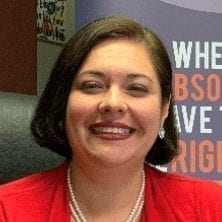
Lisa Guadalupe Clarke is the Founder and CEO of ATL Search Group with a focus on diversity and inclusion. Lisa was born on Long Island, New York and raised in Jucuapa, El Salvador during the civil war. Lisa has over 26 years of experience in Staffing and Human Resources. This year, Lisa was named Hispanic Business Woman of the Year by the Georgia Hispanic Chamber of Commerce and one of the 50 Most Influential Latinos. Her passion is to help people find the right opportunities to develop and companies find Rock Stars! ATL Search Group is a DBE and Women-Owned Certified company specializing in placing skilled bilingual and non-bilingual workers in Executive, Office Support and Light Industrial roles. Lisa is a leader in the Hispanic community for the U.S. Southeast region. Serving as the ALPFA Atlanta Chapter Past President and currently as a Corporate Advisory Board Member. Lisa serves as the Co-Chair for the Women Breakfast Series in English and Spanish. Lisa is a Board Member for the Georgia Hispanic Chamber of Commerce. Lisa serves as an Advisory Board Member for the Goizueta Foundation, Inc. and the Gwinnett County Public Schools Advisory Board Member for the Hispanic Mentoring Program. In addition, Lisa received the Diversity Award from Women of Golf Mean Business in 2016. She was a mentioned Honoree in 2017 for the Latina Style Magazine Top 50 Award Ceremony & Diversity Leaders Conference in Washington D.C. Lisa also received the Servant Leadership award from ALPFA National at their National Convention in Vegas in 2017; and the Distinguished Service Award from the National Minority Trucking Association in 2017. Currently Lisa is also a member of Leadership Georgia Class of 2019. Most recent she received the Hispanic Woman of the year award from the Georgia Hispanic Chamber of Commerce. Lisa has participated in various panel discussions in English and Spanish with various organizations and local TV stations. Learn more about ATL Search Group: https://www.atlsearchgroup.com/
